You’ve seen the hype around #vanlife. You’ve seen the stunning photos on social media. Now you want to throw everything to the wind, quit your job, build out a camper van, and live a carefree life of adventure.
If you’re prepared and have the right mindset, van life can be a great way to cut your expenses, explore the world, learn about yourself, and refocus on what really matters in your life. But there are a few things to think about before you make the leap to living in a van full time.
This page is designed as a jumping-off point for your personal vanlife journey. We go over the pros and cons of this lifestyle, the reasons why full time van life is awesome, the drawbacks, mistakes to avoid, and exactly how to live in a van from a practical standpoint. We answer the most frequently asked questions about living in a van – everything from bathrooms and showering, to making money on the road, to finding sweet camping spots.
We also include links to more in-depth resourshoces if you want to delve more deeply into a question. So go ahead – explore this page and decide if living in a van is right for you. Then get out there and begin your journey!
What is Van life?
Van life is an alternative lifestyle of people who choose to live in vans or other vehicles that have been outfitted as mobile tiny homes. This nomadic way of living is characterized by minimalism, simplicity, adventure, and a reassessment of what is truly meaningful in life.
Van life is commonly associated with willy-nilly travel and glamorous images on social media, but the reality of this lifestyle is often far different than it is portrayed.
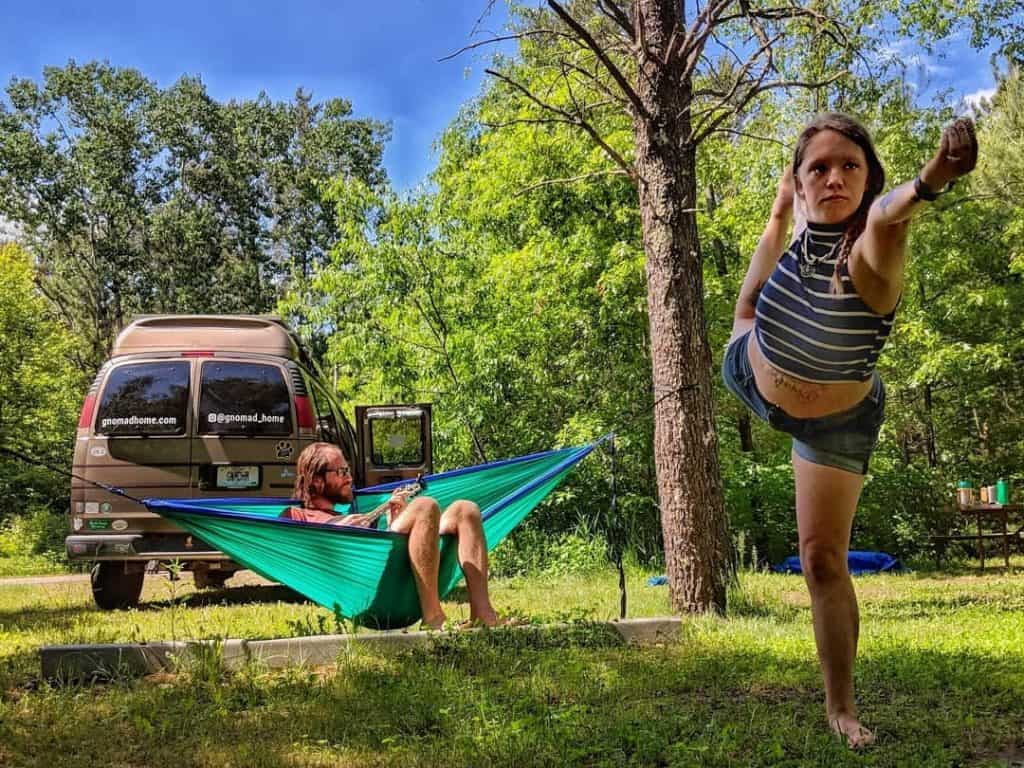
To some, #vanlife is just an escapist hashtag. To others, it represents freedom, travel, adventure, or minimalism. But to the people living it, van life is a movement, a way of life, a means of living more in harmony with ourselves, an act of resistance against the status quo.
At its most basic, van life is just that: living in a van. But to us, van life has little to do with the van itself. It doesn’t matter what kind of work you do, or where you spend most of your time. It doesn’t matter what specific kind of vehicle you drive, or how much you spent converting your van into a DIY camper. It doesn’t matter whether you travel all over or stay around one area, or whether you’re in your rig full time, part time, or just on weekends. Vanlife is about much more than this.
Van life is the process of taking control of your life. It’s about leaning into your fear of the unknown in order to pursue what makes you feel alive. It’s about meeting strangers from all over the world and accepting them for their differences, while openly seeing the commonalities we all share with each other.
Vanlife does involve living in a van, yes. And since vanlifers may not be tied down to a lease or a mortgage there is often travel involved. But deeper than that, van life is about the commitment to create the most fulfilling life you can for yourself. It’s about not settling for all the “shoulds” that others try to push upon you. It’s about focusing on what’s meaningful in your life and shedding what isn’t.
Van life is about creating your own path.
Why Would You Want to Live in a Van?
There are many reasons why people choose a nomadic lifestyle. Some do van life part time, some for a temporary road trip. Still others sell off their belongings and commit to living in a van full time. But however you go about it, van life is rewarding. It’s exciting. And it’s a ton of fun – if you allow it to be.
Ultimately, your mindset will dictate your van life experience. Becoming comfortable with discomfort and staying open to the present moment as it evolves will make a huge difference in your enjoyment of van life. If you remain open to sudden changes and new adventures, if you allow yourself to go with the flow, if you learn to make do with less and appreciate simplicity, then embarking on a vanlife journey will be one of the most important transitions you can gift yourself.
Here are just some of the reasons why you might consider living in a van:
Reason #1: Vanlife Embraces the Excitement of the Unknown
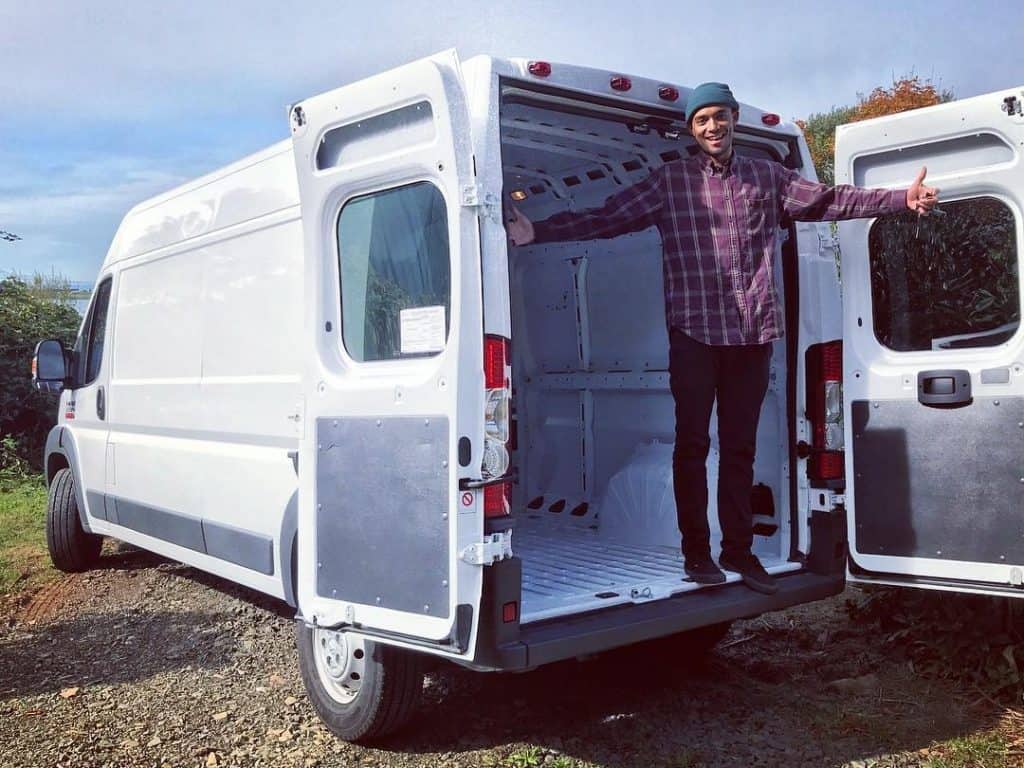
Living a nomadic lifestyle means you’re constantly diving into uncertainty – which can be terrifying, but also very exciting. Every day on the road is an adventure. Every day has the possibility of something different and unexpected happening.
In any given day we may not know exactly what will happen, what we’ll do, who we’ll meet, or where we’ll sleep that night. This feeling of uncertainty that comes with van life adventures has a way of making you feel alive, more in tune with the present moment, and accepting of change.
Reason #2: Van living is a Challenge that Leads to Personal Growth
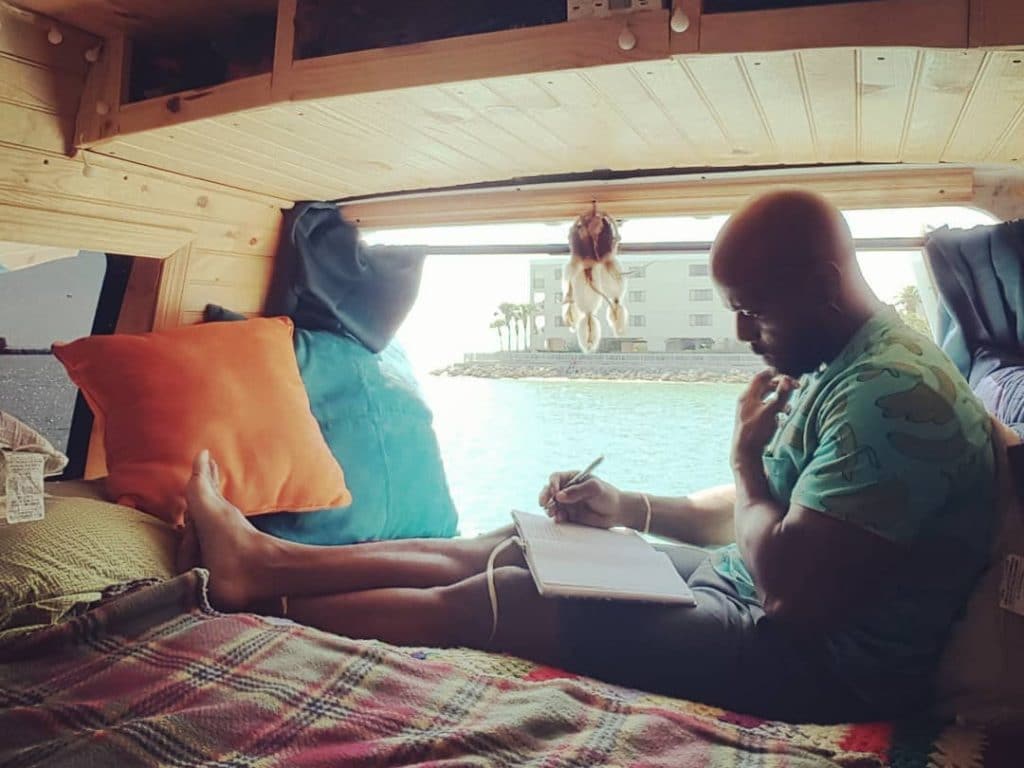
Despite how it may look on Instagram, van life is not easy – in fact, it can be a tremendous challenge at times. You will deal with a lot of uncertainty and discomfort. You will spend a lot of one-on-one time with yourself. Making fulltime van life work financially takes a lot of hustle. You will need to learn to make do with less and embrace simple pleasures with gratitude.
Real van life will challenge you in ways that you never thought possible, but it carries rewards that will change you for the better. Living in a van will throw you into many uncomfortable scenarios that will force you to confront yourself at the deepest level. You may discover that your patience isn’t as strong as you had believed. You may find that you need stability – or that you need to go with the flow more. You’ll experience the importance of flexibility and open-mindedness. And if you’re honest with yourself, van life will lead you down a path of incredible personal growth.
Reason #3: Van Life Means Freedom, Flexibility, and Adventure
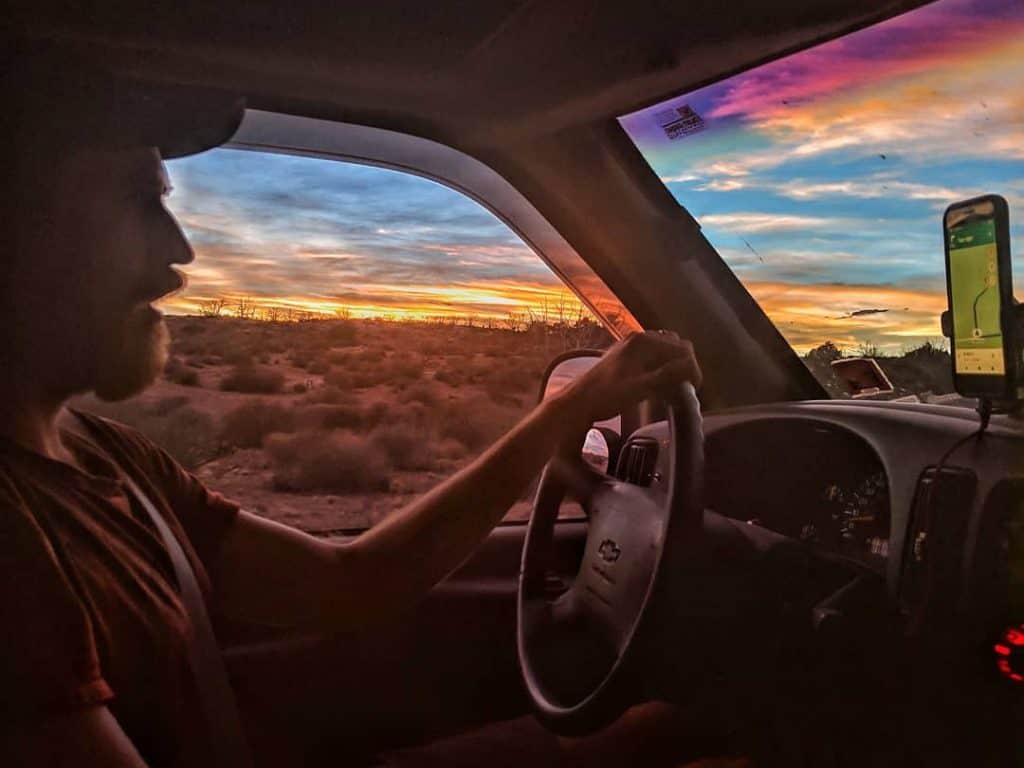
Many vanlifers choose this nomadic lifestyle for the freedom and adventure that awaits on the open road. It’s quite wonderful not being tied down to a house or an apartment, to have everything you need with you at all times, and to be able to go wherever the road takes you. Your days are often much more flexible, and you have the general sense that your time is your own.
Maybe you want to visit every National Park in the US. Becoming a van lifer is a great way to do that, all while saving on transportation and housing costs. Maybe you have friends and family scattered throughout the country. Van life can enable you to spend more quality time with them.
Maybe you’ve never been to the West Coast (or the East Coast, or Alaska, or South America, or Europe, or Asia, or *insert place here*). Traveling in a van is a great way to see new places – all while bringing your house with you and continuing to work and live your life.
And, van living allows you to change your plans at the drop of a hat. Maybe you want to stay longer in a place you really like. Maybe someone tells you about an awesome waterfall the opposite direction of where you were headed. Maybe you want to check out a new city, or escape out into the wilderness. Maybe the weather isn’t to your liking and you want to head south (or north, or to the coast, or up to the mountains). When your home has wheels, endless possibilities are open to you.
Reason #4: Van Life Allows You to Focus on Hobbies (rock climbing, surfing, hiking, skiing, music, whatever)
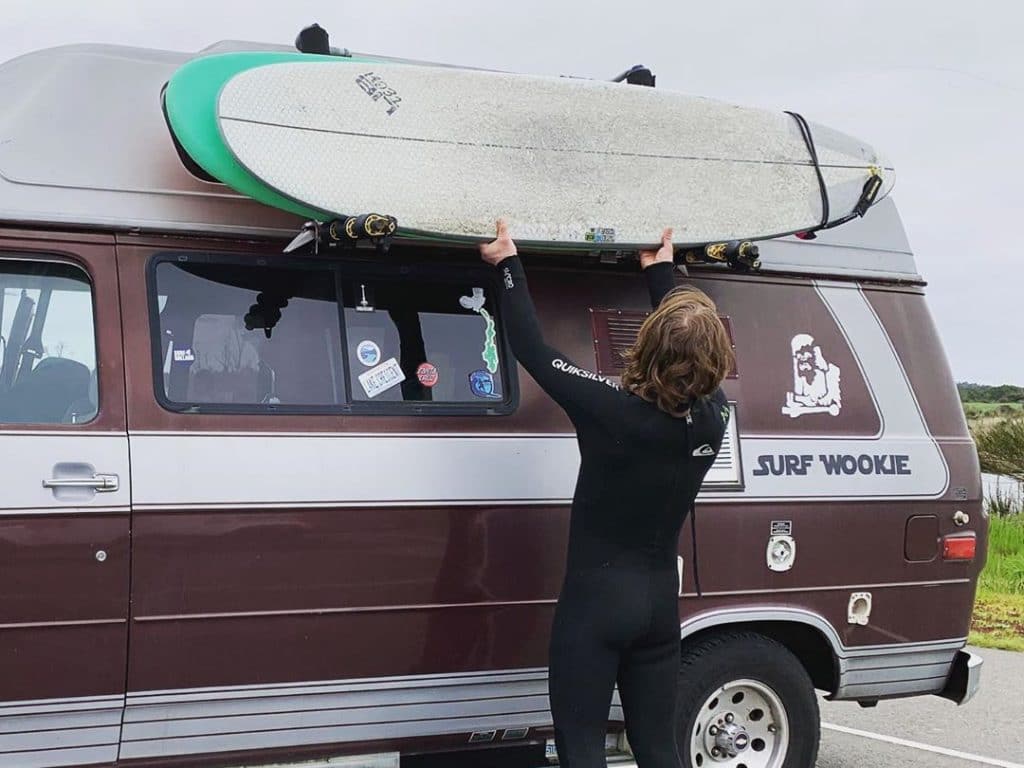
Depending on how you live, van life may allow you to focus more time around your favorite hobbies. Maybe you want to wake up at the beach and surf all day long. Or maybe you want to spend more time hiking, rock climbing, or skiing. Or maybe you want to focus on your music, or your writing, or your artwork. Whatever hobby you have that ignites your soul, living in a van can free you up to make it a larger part of your life.
While the freedom and flexibility of vandwelling can allow you to direct more of your time to what’s meaningful to you, it’s important to note that you won’t have endless amounts of free time. Some things just take longer when you live in a vehicle. You’ll need to spend time traveling, finding places to sleep, restocking fresh water, setting up and breaking down camp, etc. You may be surprised by how much time gets eaten up by these activities.
But van life also allows you to save tons of time in other areas. You may not need to make that long commute to work anymore. Your needs will be simpler, so you may not need to work all those hours just to afford unnecessary things. Or you can work seasonally, save money, and take off for part of the year.
The point is, the overall freedom and simplicity of vanlife opens up your horizon of possibilities and gives you greater freedom in how you direct your time.
Reason #5: Van living Can Help You Save Money (or reach other financial goals)

Some people choose vanlife to save money – especially on housing. There’s no doubt about it, housing costs are out of control in many parts of the country. Living in a van allows you to eliminate rent/mortgage/utility payments, which probably represent a huge portion of your monthly expenses. Saving money on housing could allow you to go back to school, or pursue that business idea, or save for retirement, or get out of credit card debt, or finally pay off those student loans.
That said, it’s important to note that van life is not a magic way to spend zero money. Although you can save on housing costs, the rest of your spending depends on your lifestyle and your priorities. Just like you can spend very little money while living in an apartment if you’re frugal, you can spend a ton of money while living in a van if you’re not careful. It all comes down to how you choose to live, and your choice of housing is only part of the equation.
Reason #6: Learn to Live a More Minimalist Life and Appreciate the Simple Things
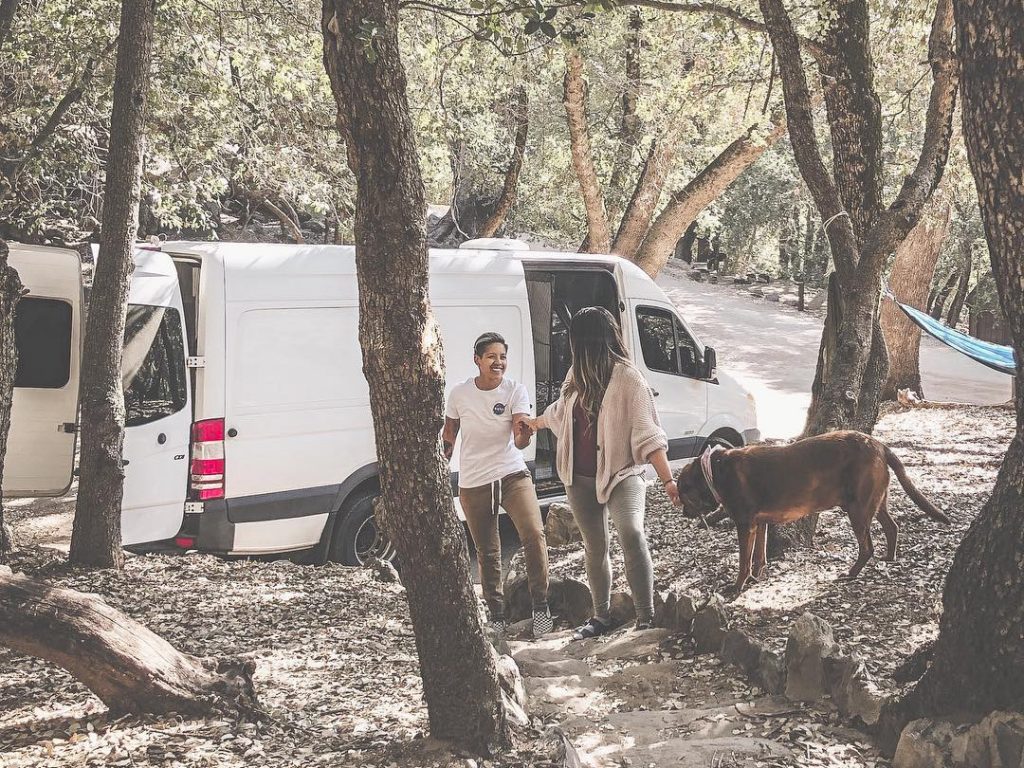
When you live in a van, you have limited space for needless things. This forces you to evaluate the things that you have, and reduce your belongings down to only what you really need and use. This can be a tremendous boost to your psychological well-being.
Having fewer things takes a weight off of your shoulders that you might not know you were carrying. There’s far less to worry about and there’s much less stress swirling in the back of your mind when you have only what you need, when everything is within arm’s reach.
And because your van is such a small space, it’s tough to impulsively buy things that you don’t need. This forces you to learn to be content with what you have, and to look for ways to make do instead of solving your problems through buying stuff (this also helps with saving money). Learning to make do and embracing uncertainty also encourage you to slow down and appreciate the simple things in life, instead of constantly craving for the next thing.
Read More: 101 Van Life Essentials You Don’t Want to Forget
Reason #7: Meet new people and join the awesome van life community
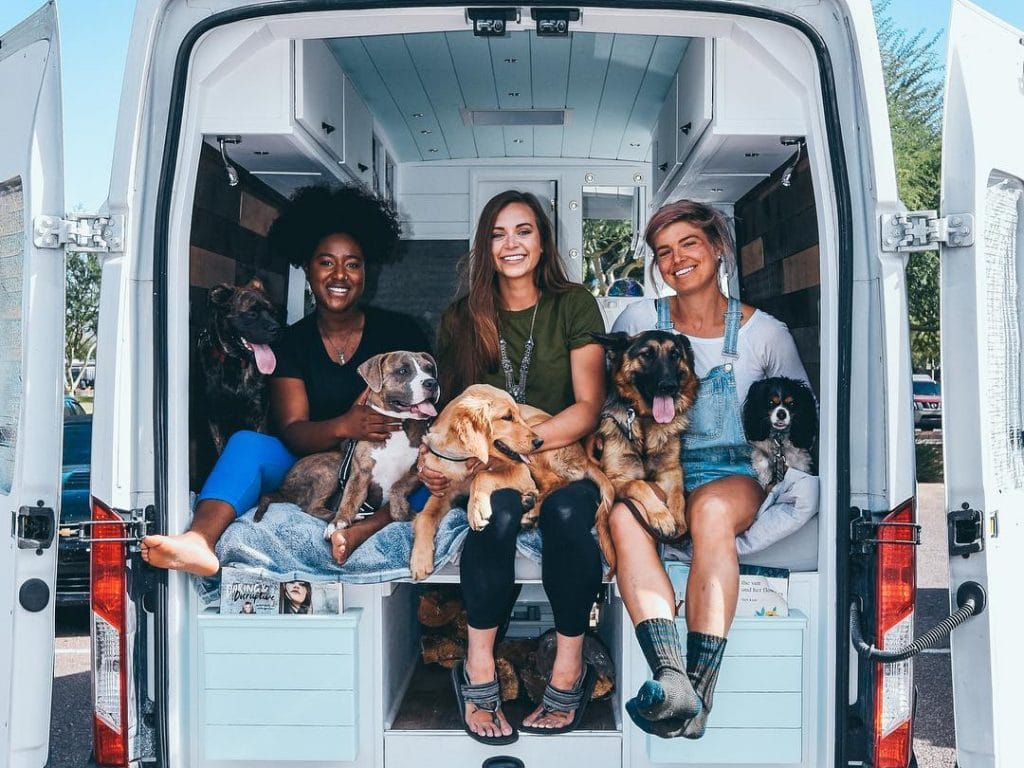
It might seem strange to say that living in a van is a great way to meet people and experience community, but it’s true. There are tons of interesting people who choose this lifestyle, and when you meet another vanlifer you’ve probably met a like-minded person who instantly understands your life in ways that others do not. This means that you can often skip the bullshit and quickly form deep connections with people.
The internet and social media have opened up a ton of possibilities for connecting with other vanlifers no matter where you are. We’ve connected with several people via the internet who later became camping buddies and instant friends. Even though we’re not physically near each other most of the time, we’re still able to stay in contact, keep up with each other’s travels, and chat with people who “get it”.
And there’s nothing like a bunch of nomads coming together at a big van life gathering (like the one we host in the Midwest each May). These are awesome events where we can meet each other in person, tour each other’s rigs, and swap stories around a bonfire.
Reason #8: Living in a Van Allows You to Reject Societal Norms and Direct Your Own Time
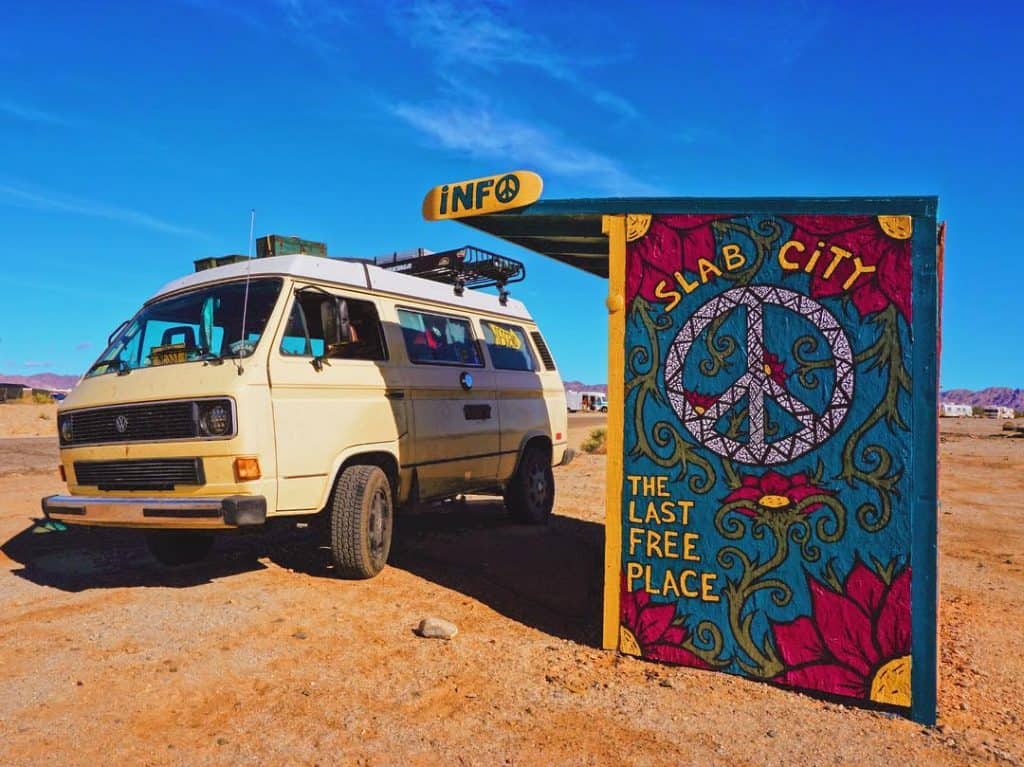
We’ve reached a tipping point in our society where we’ve seen behind the curtain and revealed that the American Dream is not all it’s cracked up to be. For many that are attracted to vanlife, the idea of mortgaging our lives away for the questionable promise of an uncertain retirement just isn’t all that appealing.
Our time is our most valuable resource. None of us knows how much time we have on this earth. Choosing to van life is an acknowledgement of that fact. It’s a celebration of the limited time that we have, and it’s honoring that time by striving to enjoy it.
That said, van life is not a vacation, it is an alternative lifestyle. Vanlifers still need to work and make a living. The difference, though, is that you have a greater degree of freedom in determining your life. You set your own schedule, you dictate your own time, instead of someone else dictating it for you. And that freedom is what living in a van is all about.
What Are the Challenges of Van Life?
Although there are many reasons why you may choose van life, it’s definitely not for everyone. Here are some of the bigger challenges of this lifestyle.
Challenge #1: Vanlife Can Be a Lot of Work

Despite what you may see on Instagram, van life is not all about lounging around your van in beautiful locales. Real van life takes a lot of work, and you need to be almost constantly strategizing.
(Questions we’re always asking ourselves: When do we need to refill our fresh water? Where can we get a shower next? How full is our grey water tank? Where’s the nearest bathroom – or place to dig a hole? Where are we going to sleep tonight? We really need to order something online – where’s the best place to ship it to and where will we even be in a few days?
The constant planning, strategizing, and uncertainty can be tough to deal with at times. If you’re not careful this could lead to anxiety and burnout.
Also, many things seem to take longer when living in a van. Cooking is much more of a process when you have to take everything out of your cabinet just to get that one thing in the back. And if you don’t put everything away immediately then your van quickly becomes unlivable. You can’t just throw stuff in the corner or leave dishes in the sink like you can in a house. Day-to-day life can be a constant dance of taking things out and putting them away.
Unlike living in a fixed dwelling where you likely have water and utilities piped directly to you, when you live in a van you have to go out and get this stuff. Nothing is handed to you in van life.
We’re constantly keeping an eye on things and thinking three steps ahead. We have to be aware of how much fresh water we have left, and when we’re running low we need to seek out a place to fill up (and find somewhere to dump our grey water). Same with stove fuel. And we need to keep an eye on our camper van electrical system, make sure we’re getting enough sun and not using too much power, and maybe go for a drive to charge up if we’re running low.
Then there’s setting up and breaking down camp. Our van has two modes: travel mode and camping mode. When we’re posted up somewhere, our camper van awning is often extended, we’ll get the instruments out of the back, we’ll leave the stove and cast iron pan out, we’ll have the curtains down. This all takes work to set up, and it takes work to secure everything back for when we’re traveling again. We also need to convert the interior to “bed mode” at night, and back into “couch mode” in the morning.
This is one thing that surprises many people new to van living – the amount of time and effort it takes to just maintain the lifestyle. But we think the hassle of van life is more than worth it, and it all takes way less time than we used to spend mowing the lawn and maintaining our house in our former lives.
Challenge #2: Van life Means Getting Used to Spending Time Outside
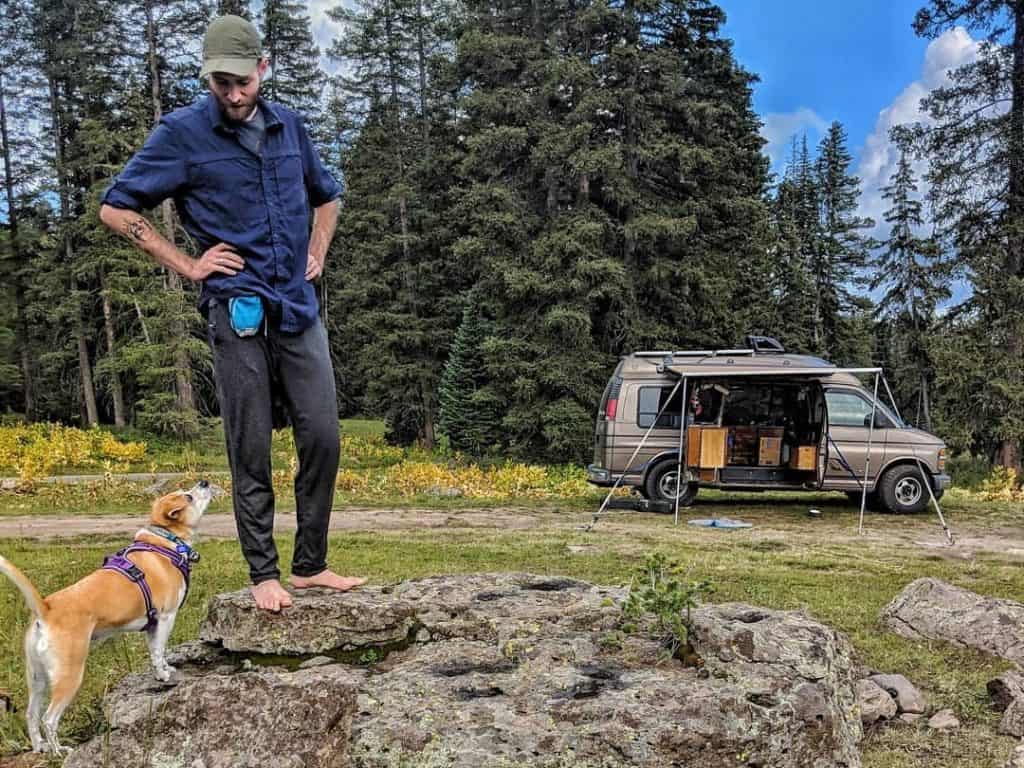
If you don’t enjoy being outside, then you’ll have some serious adjusting to do when you start living in a van. We always tell people that we don’t live in a van, we live out of a van. Van life is being outside. No matter how comfortable or spacious your van is, no matter how many amenities you included in your build, you will still spend a significant amount of time outside your van.
This is something that actually attracts a lot of people to van life, and it’s one of our favorite parts of this lifestyle. But it’s important to realize that being outside all the time comes with some unavoidable discomforts. There will be dirt, mud, sand, and leaves. There will be all kinds of insects – mosquitoes, ticks, flies, and spiders. You will be cold, or hot, or damp, or sweaty. Things won’t be clean all the time, and you won’t be perfectly comfortable all the time. And the sooner you embrace this reality, the more you’ll enjoy living in a van.
Challenge #3: You’ll Be Exposed to Weather and Temperature Swings on Your Van Life Adventures
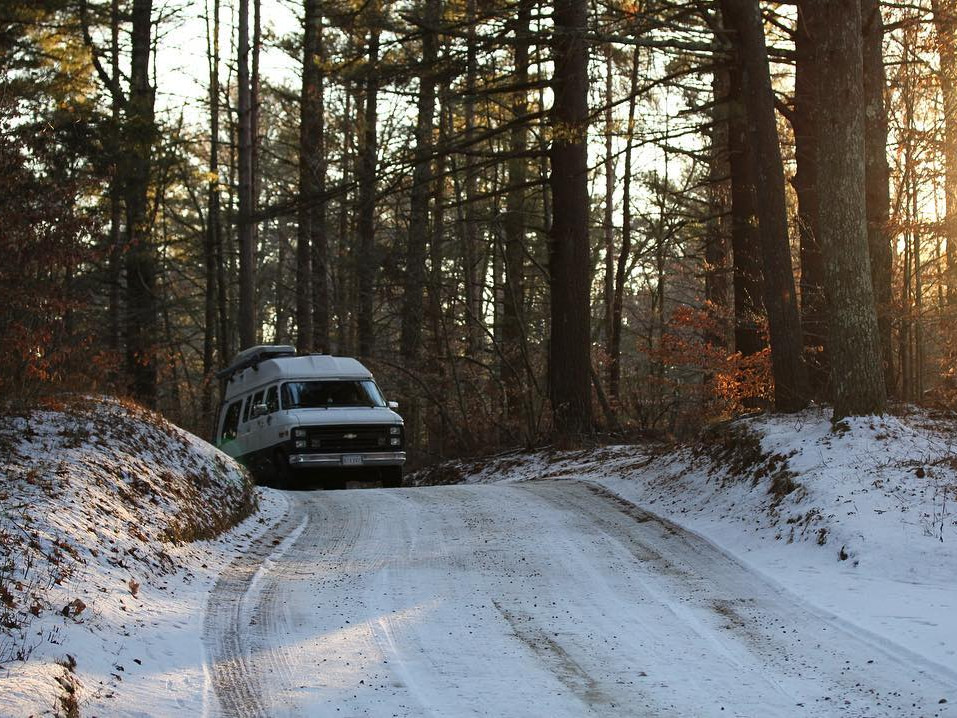
There’s a limit to how much you can control your environment in a camper van. You’ll always be somewhat at the mercy of the outside weather. No matter what you do, you’ll never have as much control over your van’s temperature as you do in a house.
There are a few things you can do to maintain a reasonable temperature in your vehicle, whatever the weather: insulate your van, include reflective window coverings, install an awning and seek out shade in hot weather, and install a ventilation fan. In the winter, a small propane heater (or other heat source) can work wonders. But unless you plan on spending all your time plugged into the grid at RV parks, there’s no way you can run AC in the summer (they take WAY too much power). You’ll just need to get used to dealing with temperature extremes and finding ways to cope.
We’ve actually grown to enjoy this aspect of van life quite a bit. We love experiencing the ups and downs of the environment. It makes us feel connected to the world around us, and it’s all part of the van life adventure. It often dictates our travels – during the summer months, we seek out northern climes and higher elevations. In the winter, we gravitate toward sunnier, warmer areas (although we really enjoy winter van life in the mountains). But we’ve also frequently had to change plans because of extreme heat or an approaching storm. The weather is something we have no control over, yet we still have to adapt and rearrange our plans around it all the time.
So if you’re someone who doesn’t like to change plans, if you can’t deal with swings in temperature, if your living space has to always be exactly 72 degrees, then living in a van may prove to be a significant challenge for you (or an opportunity for significant growth).
Challenge #4: Living in a Van Will Expose You to Many New and Uncomfortable Situations
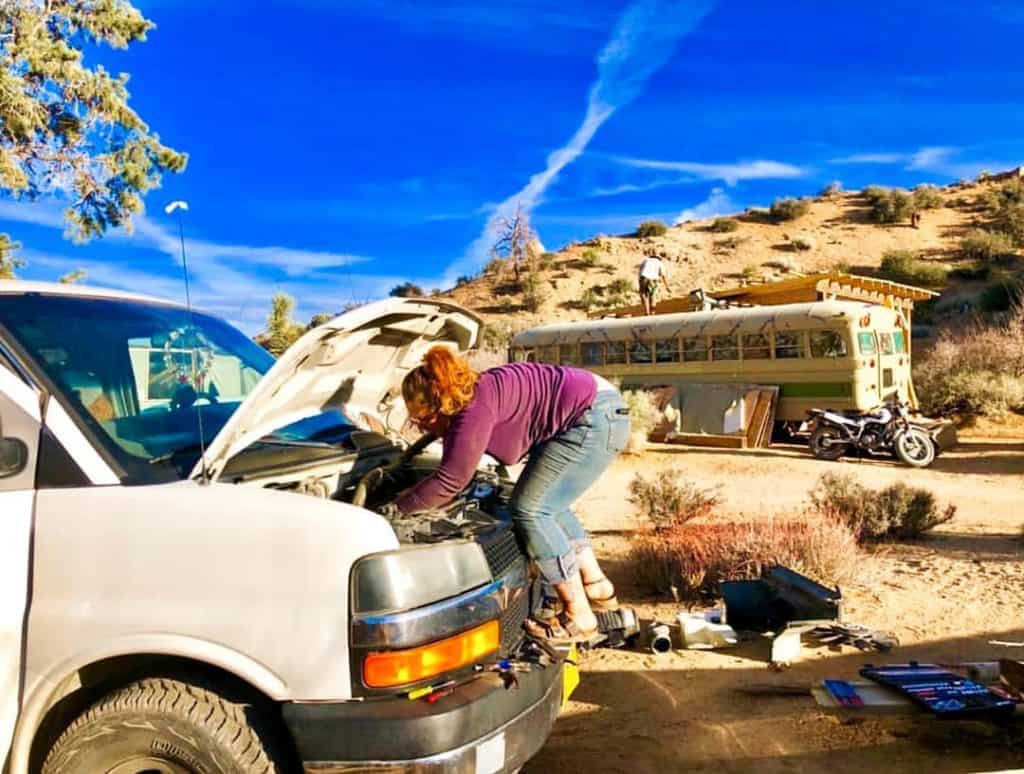
When you live on the road, unexpected things happen. You may find yourself in a LOT of uncomfortable situations, and you’ll need to get used to being outside your comfort zone. There will be mental health challenges and layers of discomfort that you’ll have to work through internally, especially when you first start van life.
A lot of this discomfort comes from the inherent uncertainty of nomadic living. You may find yourself in a completely new area, with a different climate and different challenges than what you’re used to. You may have to deal with a breakdown or another issue when you don’t know anyone nearby who can help. You may have to work through a lot of frustration and fear.
But if you stay flexible and keep an open mind, you’ll grow used to not knowing what’s around the corner. This feeling of uncertainty becomes a big part of the van life adventure, and you’ll feel like you’re truly exploring life every single day. You’ll wave goodbye to your comfort zone in the rearview mirror, and this will set you up for deep personal growth.
Challenge #5: Making Money on the Road Takes Hustle
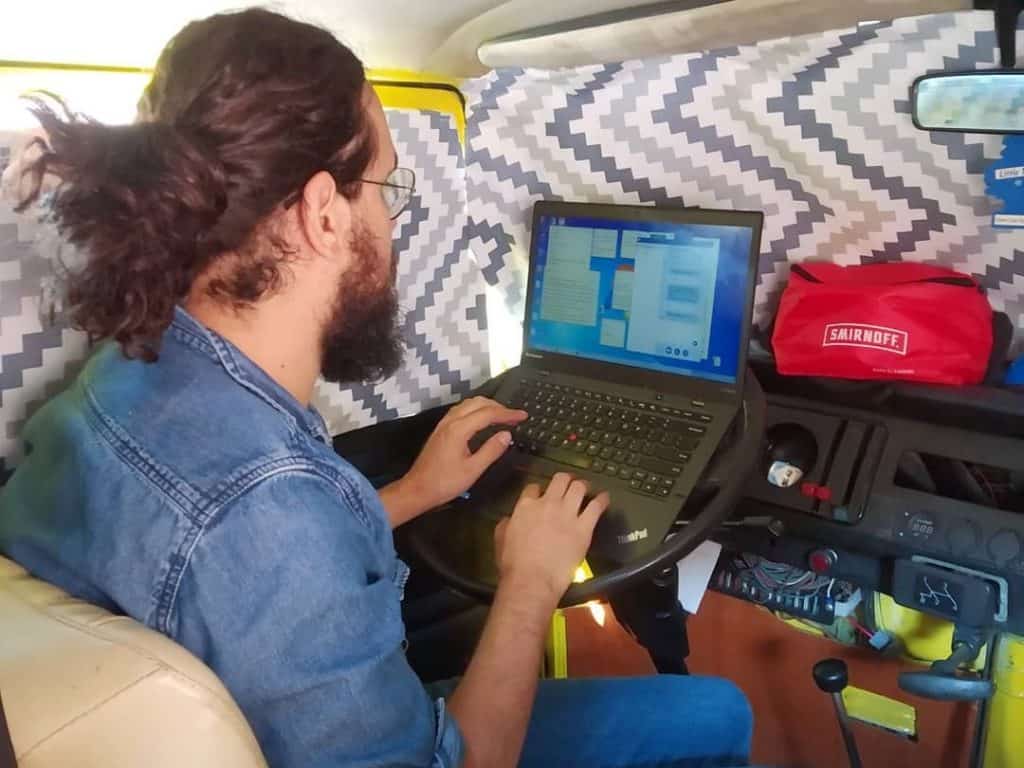
Unless you saved up a bunch of money to take off work for a temporary van life road trip (which is awesome, congrats!), living in a van is not a vacation. What you don’t see on Instagram is that all those people doing vanlife full time are working their asses off to sustain this lifestyle.
Vanlifers are doing everything from manual labor, seasonal farming, running their own businesses, workamping positions, online freelance work, and many other creative and independent ways to make money on the road. But what we all have in common is that we’re hustling and putting ourselves out there, not sitting back and waiting for opportunities to appear.
If you prefer the stability of showing up at a specific place for a predefined amount of hours and collecting a regular paycheck in return – then you will have some adjustments to make if you want to live on the road. But many van lifers have successfully made this transition, so there’s no reason why you can’t too if you hustle.
Van Life Pros and Cons
Pros
- Every day is an adventure
- Van life give you freedom and flexibility to travel
- It’s a challenge that leads to personal growth
- More time to focus on hobbies
- If you do it right, you can save money or reach other financial goals
- Meet new people and join the awesome van life community
Cons
- Van life is not how it appears on Instagram
- It can be a lot of work just to maintain the lifestyle
- You are more at the mercy of weather and temperature swings
- You’ll be exposed to new, unexpected, and uncomfortable situations
- Making it on the road full time takes hustle
How to Live in a Van: Complete Guide to Fulltime Van Life
If you’re reading this page, chances are you have questions about the practical aspects of van life – how you actually go about living in a van. This section covers everything from building a van, to finding overnight camping, to bathrooms and showers, to making a living on the road, as well as things like finding insurance and getting your mail.
Choosing a Van to Live In
The question of what’s the best van to live in has no right or wrong answer – it’s all about your needs, priorities, and budget. You might be drooling over all the Ford Transit campers and Sprinter van conversions on social media, but don’t be fooled into thinking you need a flashy, expensive vehicle to live this lifestyle. There are plenty of less expensive rigs that will work just as well, and will get you on the road without hefty car payments.
Here are some of the best options for van life rigs.
Full-Sized Vans
- Sprinter Vans. The Mercedes Sprinter van has become the iconic van life vehicle that is highlighted the most on social media. While new Sprinters can be ridiculously expensive (both to buy and to repair), the Sprinter van was also the first Euro-style cargo van to hit the US market – which means it’s possible to score an older used Sprinter for a somewhat sane price. These are some of the most spacious vans available, and high roof models allow even tall people to stand up inside. While Sprinters tend to be reliable, parts are expensive and it can be tougher to find mechanics when they break down (which they inevitably will).
- Ford Transit. Ford’s entry into the Euro-style cargo van market, the Transit is built on the same powertrain as Ford’s F-Series pickup trucks, so parts are cheap and mechanics are plentiful. This matters because you will break down on the road, and being able to take it to any mechanic will make your life a whole lot easier. Ford Transits feature long wheelbases and high roofs, just like the Sprinter, and new models are cheaper than new Sprinters. However, because Ford Transits are newer to the US market, older used vans are not available yet.
- Ram Promaster. The Ram Promaster is another Euro-style cargo van, but it’s a bit wider and squatter than both the Transit and the Sprinter. The extra floor space gives it some advantages for laying out a camper build and opens up the possibility of sleeping lengthwise across the vehicle. However, people taller than 6 feet will just barely scrape the ceiling in a converted Promaster, so if you’re super tall this could be a deal breaker. The Promaster is cheaper than a Sprinter, and it’s easy to find mechanics like with the Transit.
- Nissan NV. The Nissan NV is less common than the other vans on this list. Picture a Nissan pickup truck with a van body attached to the back and you have the NV. We think these vans are pretty badass, and we’re considering one for a future rig. They come in high roof models, but only one wheelbase (short), which leaves limited space for expansive layouts. These vans have been discontinued, so you’re only going to find used ones out there.
- Chevy Express. The Chevy Express is an older-style short roof cargo van, but it’s rock-solid reliable and a great option for van life. These vans come in a variety of configurations, including with aftermarket high tops and as the base for short buses, box trucks, ambulances, and other vehicle types. The Express has been around forever (they were called the G-Series prior to 1995), and you can find used vans in just about every price point.
- Ford Econoline/ E-Series. Similar to the Chevy Express, the Ford Econoline is a short roof cargo van that’s been around forever and comes in many configurations. Econolines are generally reliable, but Ford stuck a bunch of different engines in them over the years and some are better than others. One advantage over the Express is the availability of easy-to-install (if you’re mechanically inclined) aftermarket 4×4 conversion kits.
Read More: Compare Sprinter vs Transit vs Promaster for Van Life
Small Cargo Vans
These vans are micro versions of their full-sized big brothers. While you lose out on space, these small camper vans are more affordable, get better gas mileage, and are easier to drive, maneuver, and park.
- Ford Transit Connect. The most poplar small cargo van out there, the Ford Transit Connect is essentially a mini Ford Transit.
- Nissan NV200. The Nissan NV200 is a smaller version of the Nissan NV (and way more popular than the full-sized version).
- Ram Promaster City. Smaller version of the Ram Promaster.
- Mercedes Metris. Mercedes’ take on the small cargo van.
Minivans
With how much van prices have gone up lately, minivan campers are becoming more popular. Minivans are less conspicuous, get better gas mileage, and are cheaper than their full-sized cousins. Here are our favorites.
- Toyota Sienna. Want Toyota reliability and the ability to get wherever you want to go? Get a Sienna! The Toyota Sienna is the only minivan that has available All Wheel Drive, and there are even lift kits available to help you get down those bumpy forest roads. If you can afford the crazy prices for a new one, 2021 and newer Siennas are all hybrids.
- Honda Odyssey. An all-around solid, reliable minivan.
- Dodge Caravan / Grand Caravan. Not as reliable as the other two, but also the only minivan where all of the seats fold flat into the floor. This means you can transition from kid hauler during the week to open space for your camping stuff with the pull of a lever.
Other Vehicles
Just because it’s called “van life” doesn’t mean you need an actual van. People are living this lifestyle in all kinds of unique vehicles, like
- Car camper conversions
- SUV conversions
- Converted ambulances
- Skoolies (school buses)
- Short bus campers
- Shuttle bus conversion
- Box truck conversions
- Electric camper vans
- RVs, truck campers, and camper trailers
- Bicycles and motorcycles
- …and more!
Converting a Van into a Mobile Tiny Home
We cover building a DIY campervan in our epic Build Your Van: The Ultimate Guide, and all over our blog. We recommend checking this out for a more in depth discussion of building out a van life rig. But here’s a brief overview to get you started.
- Planning Your Layout. From bed design to kitchen layout, this is where you plan your new mobile tiny home. However, you won’t know what you need at this stage, so we recommend taking your empty van out for some test camps, or renting some camper vans to get a feel for different configurations.
- Insulating Your Van. Insulation helps keep your van comfortable. There are many misconceptions about the best way to insulate a van, and it’s important to do this step right.
- Install floors, walls, and ceiling. Subfloor, flooring, wall paneling, and a ceiling.
- Installing Your Vanlife Power System. We recommend installing solar panels and a battery system in your van so that you can have power off grid. This part may seem intimidating, but it’s actually easy to do with a good guide.
- Building Furniture. Build cabinets, your bed, etc., and safely attach them to your van.
- Selecting Appliances. You need things like a camp stove, 12V refrigerator, and roof vent fan to make your van livable for the long haul.
Below we’ve included links to our most helpful content about building your new tiny home on wheels.
- Build Your Van: Ultimate Guide to Your DIY Campervan Conversion. This is the main jumping off point for building out your van. We go over all the basics of building out a camper conversion to get you started on your van build journey.
- Epic Guide to Van Life Electrical & Solar. This post goes over everything you need to get up and running with your own vanlife electrical system.
- The Best Solar Panels for Van Conversion Power Systems. This guide covers our recommendations on selecting the best solar panel options for your rig.
- Insulating Your Van: Everything You Need to Know for Your DIY Van Build. This epic guide goes over best practices for insulating your van so you can stay comfortable.
- The Best 12V Portable Refrigerators for Van Life. Cut through all the marketing BS, find a quality, affordable refrigerator, and keep your food cold on the road.
- The Best Power Inverters for Van Life. An Inverter is a vital component in any DIY van conversion. This guide demystifies the inverter and helps you pick the best one.
- How to Charge Your Van While Driving (with a DC-DC Charger). This post goes over the essential DC-DC charger, a device that allows you to charge your batteries from your alternator while driving.
Should You DIY Your Van Conversion or Buy a Pre-Built Camper Van?
We’re big fans of the DIY route, but this may not be for everyone. If you feel intimidated by the idea of building out your own van, don’t have the space to work, or have more money than time, then it’s worth exploring more plug-and-play options.
- Buying a van that’s been converted by someone else. There are a ton of built out vans for sale nowadays, and this can be an easy way to get started. However, sellers tend to overvalue their work so you’ll likely end up paying a hefty premium over just the vehicle. You also won’t know if everything was done properly, and you could end up inheriting someone else’s problems.
- Buying a van from a professional conversion company. There are many van upfitters out there that do excellent work, and this can be a great option – if you have the money. Buying a professionally-converted van is going to cost you tens of thousands of dollars in addition the the vehicle itself. And a lot of these companies are slammed with work, so be prepared to spend months on a wait list.
- Installing a camper conversion kit. Kits are a great way to split the difference between a DIY build and a professional conversion. There are kits available for all the full size vans, as well as for smaller vehicles like SUVs, small cargo vans, Honda Elements, minivans, and even sedans. You’ll end up paying thousands of dollars, but this is still way cheaper than hiring a professional conversion company.
Planning a van build? Read our free guide. We cover just about everything you need to know – from planning, to insulation, to solar and electrical, to picking appliances, to essential tools. Get started today so you can get out there on the road!
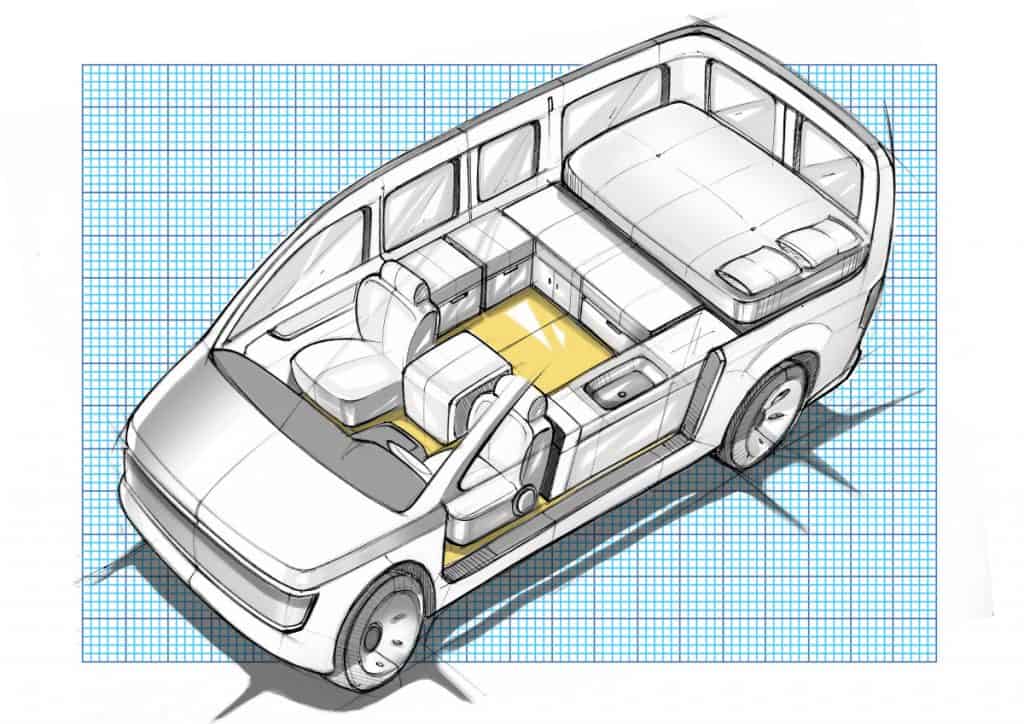
Where to Park Your Camper Van at Night
Now that you’ve left the comfort of your old life for the adventure of van life – where exactly do you sleep?
There are tons of options all over North America for parking your van at night, many of them completely free. But the options that you gravitate toward will depend on the type of van life nomad that you are and the kinds of amenities that you need around you.
Do you want to spend time in an urban area, or are you looking for a spot out in the middle of nowhere? Do you need a bathroom, a shower, or cell service? Do you want to camp for free, or are you okay with paying for a spot? Are you okay with breaking local laws, or would you rather stick to where you’re allowed to be?
Below are some options for sleeping overnight in your camper van.
Read More: Vanlifer’s Guide to Sleeping, Camping, and Overnight Parking
Camping on Public Land (National Forest, BLM, etc). Free.
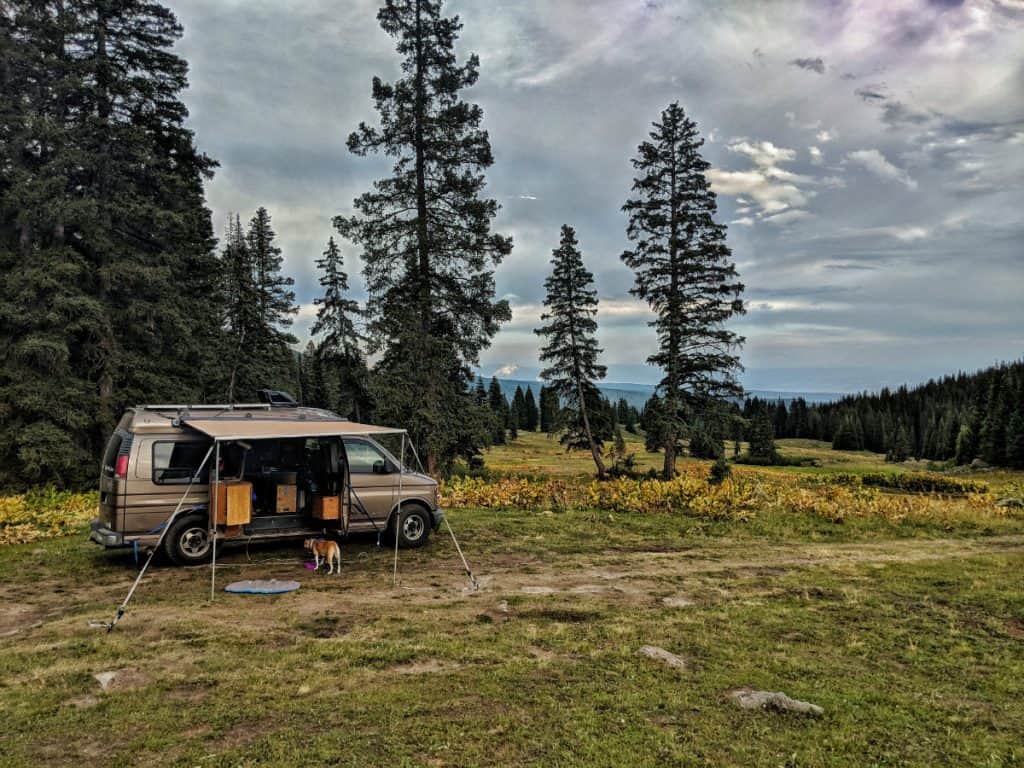
Dispersed camping on public lands is our go-to option for van life overnight parking. There is abundant public land all over North America, and much of it allows you to camp out for free (usually for up to 14 days or so before you have to move on). These spots are fairly easy to find with the right apps and resources (and a well-tuned sense of adventure), and they tend to be beautiful and peaceful.
The downside, however, is that amenities can be very hit or miss. Sometimes you’ll find a spot with a pit toilet and blazing-fast cell service. More often than not, your spot will be in the middle of nowhere, your bathroom will be a hole in the ground, and you’ll be in a complete dead zone (though it is possible to find sweet wilderness spots with decent cell service – or just get a Starlink if you’re a digital nomad).
Getting to these van life camping spots can also be a bit of an adventure. While there are many great campsites that are easily accessible, these spots are more likely to have other campers close by. The best and most secluded spots tend to be down the bumpy back roads.
But if you’re the type of vanlifer who loves spending time outside, enjoys being far away from cities, and prefers to camp for free, public land is your number one resource.
Where to find these spots: Freecampsites.net (Website); iOverlander (iOS | Android | Website); Campendium (iOS | Website); FreeRoam (iOS | Android | Website)
Important Note: When dispersed camping in the wild, always adhere to Leave No Trace principles. Our public land is a vital resource, and it is our duty as responsible users of this land to do everything we can to leave our camp spots better than we found them.
Do’s and Don’ts of Camping on Public Land
- DO follow Leave No Trace principles at all times.
- DO be aware of any fire restrictions in the area.
- DO clean up after yourself and pack out any other trash you find.
- DON’T trash your site or behave irresponsibly.
- DON’T drive your van off pre-established trails.
- DON’T poop straight on the ground – always poop in a hole at least 200 feet from a water source, and pack out your toilet paper.
Parking Lot Camping (big box stores, truck stops, casinos, etc.) Free.
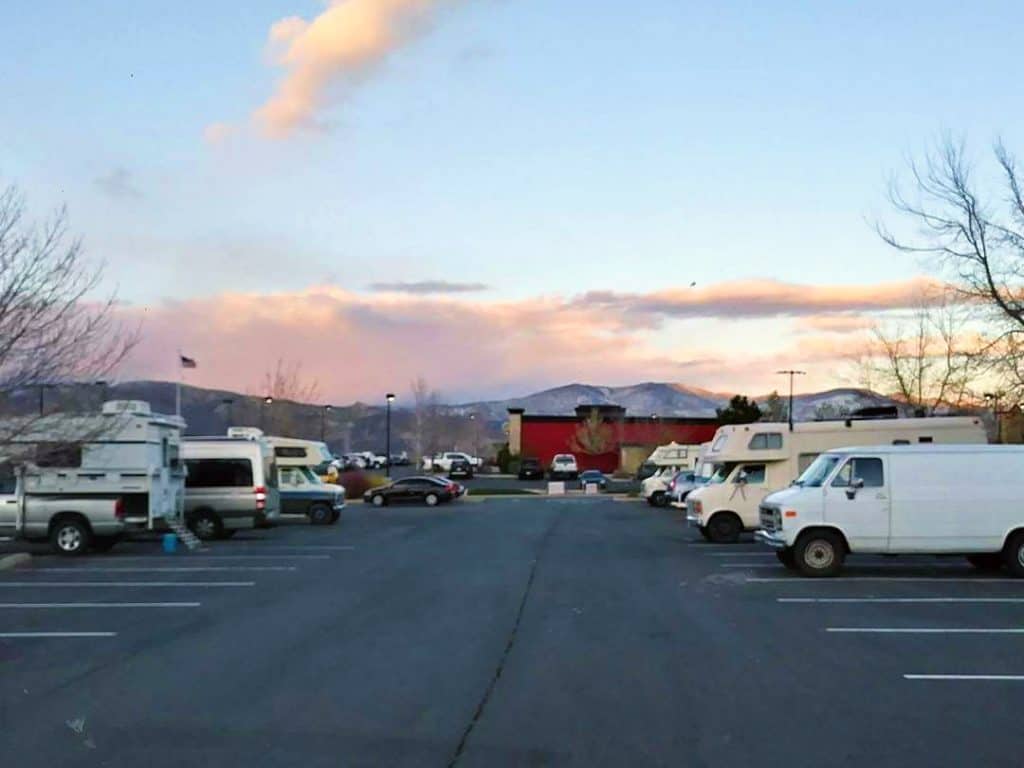
It ain’t the most glamorous, but occasionally camping in a parking lot is a reality of vanlife. We often find ourselves in a big box store parking lot for the night if we’re spending time in a town or city to scope out the area or run errands. And since big box stores and truck stops tend to be right off the highway, they also make convenient stopovers between long travel days.
What big box stores allow you to sleep in their parking lots? Many Walmarts allow overnight parking, and you might even find yourself surrounded by a throng of other camper vans and RVs while you’re sleeping. Other stores that may allow overnight parking: Bass Pro Shops, Cabela’s, Cracker Barrel, some hardware stores and some local grocery stores.
As far as truck stops, we’ve found Flying J to be particularly van/RV friendly. Highway rest areas are also an option for a brief travel stopover. And many casinos readily allow you to park overnight, and may even allow you to stay for multiple days.
But, we always recommend calling ahead and asking before you park overnight at any business. Not every location will allow you to camp out in the parking lot, even Walmart. Also, some towns have ordinances against overnight parking, meaning that you’re at risk of getting kicked out in the middle of the night. It’s always better to ask first than to get dragged out of bed by the police and forced to move at 3 AM.
Where to find these spots: Park Advisor (iOS | Android); RV Parky (iOS | Android); iOverlander (iOS | Android | Website); AllStays Camp & RV (iOS | Website)
Do’s and Don’ts of Parking Lot Camping:
- DO call ahead to ask if they allow overnight parking, and where they prefer you to park – they may want you to keep to a specific area.
- DO go in and buy something if possible (luckily most of these places sell things that you might need anyway – like gas, groceries, or camping supplies).
- DO be respectful and clean up after yourself.
- DON’T set up your awning, tables, and chairs and have a party in the parking lot.
- DON’T throw trash on the ground, pee outside, walk around with your shirt off, or otherwise act disrespectfully toward the business and the people around you.
- DON’T overstay your welcome. A night or two is probably fine, but posting up for a week is likely to get you kicked out and jeopardize the overnight parking for everyone else.
Urban Stealth Camping. Free.
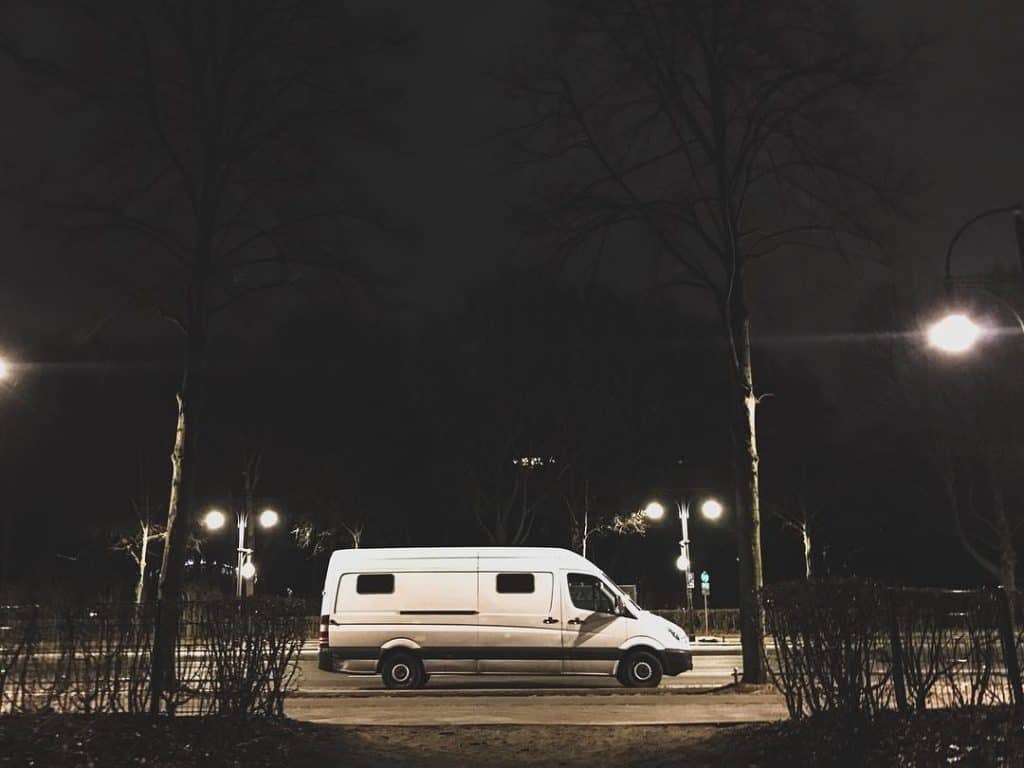
If urban areas are your thing, or if you have a job in a specific city and are living in your van to save on rent, it’s not realistic to camp out long term at big box stores. Even more so if you’re in a city that doesn’t allow overnight parking at private businesses.
That’s where van life stealth camping comes in. Stealth camping generally entails pulling up to a city street, neighborhood, industrial area, or parking lot at night, doing your best to conceal the fact that you’re sleeping in your vehicle, and leaving early in the morning before anyone notices.
If you think that you might be stealth camping frequently, then make sure you buy a van that’s suited for it (i.e. not obvious that it’s a campervan – so maybe don’t buy that VW Vanagon and mount your surfboard on top). The best vans for stealth camping are plain-colored windowless work vans, since they’re literally everywhere and it’s easy to keep them unnoticeable. If your van has windows, make sure you add some good light-blocking curtains.
When stealth camping, it’s very important to be aware of the community that you’re in and to be respectful at all times. Stay quiet and in your van, and don’t go to the bathroom outside for any reason (this is what van life pee bottles are for).
Some communities are welcoming to alternative lifestyles and may not have a problem with well-behaved vandwellers hanging around for a bit. Don’t be the bad apple that sours the area for the rest of us. Many other communities really don’t want vanners around, and you may find yourself subject to harassment from locals or attention from law enforcement (no matter how well-behaved you are). If any of this happens, be polite and cooperative, and remove yourself from the area.
Whether you like it or not, you are a representative of the entire van life community. Any interactions you have with the conventional public can color how they view the rest of us vandwellers.
Read More: Ultimate Stealth Camping Guide for Urban Van Life
Note: It’s illegal to sleep in your vehicle in most cities, and many who live in residential areas may not want you camping in their neighborhood. This means you need to do everything possible to be respectful and stay under the radar. Also be aware that if you choose to stealth camp, you could find yourself being woken in the middle of the night by the police. If this happens, be polite and respectful, don’t argue, and move your van.
Do’s and Don’ts of Urban Stealth Camping
- DO choose a van that won’t be noticed (windowless work vans are best).
- DO be respectful and polite, stay under the radar, and keep your van and yourself presentable.
- DO arrive late, leave early, and change camp spots often.
- DON’T blast music, throw a party, or otherwise cause a ruckus.
- DON’T walk around half naked or go to the bathroom outside.
- DON’T be rude or argue if asked to move.
Campgrounds (federal campgrounds, state parks, private campgrounds, RV parks, etc). $$$.
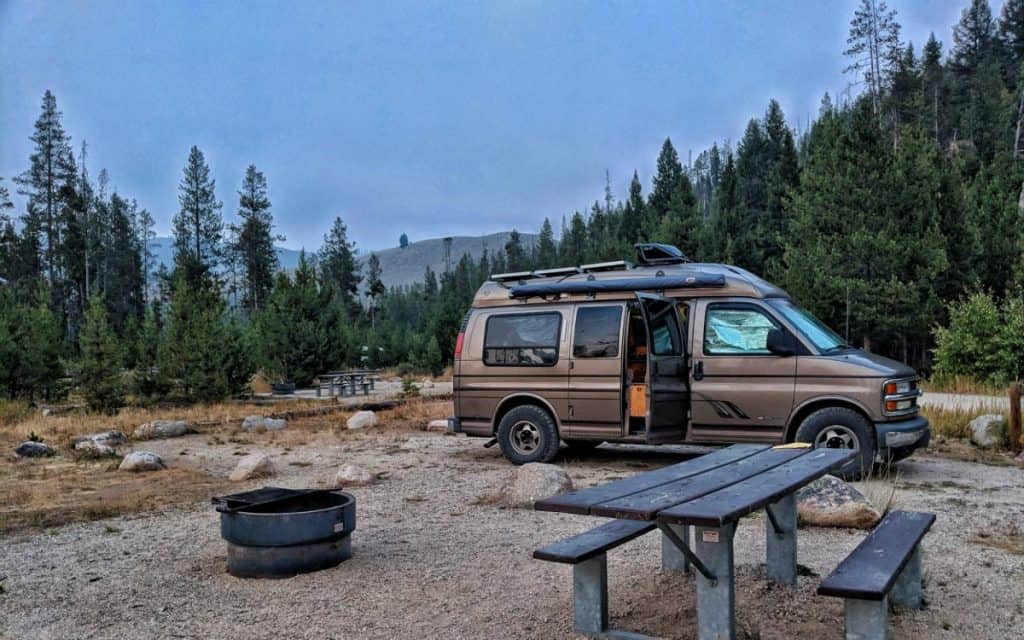
Another option for sleeping in your van is to book a spot at a campground. Since most campgrounds cost money and most vanlifers prefer to limit expenses, staying at paid campsites is usually more of a once-in-awhile thing. But campgrounds often have amenities like flush toilets and showers, and may even have laundry and wifi available, so they can be a nice break from the road on occasion.
Here are some types of campgrounds you might come across on your van life travels:
- Federal Campgrounds. This category includes Forest Service/BLM campgrounds, as well as National Park campgrounds. Some Forest Service/BLM campgrounds are free or very cheap, and may even offer a discount if you have the annual Interagency Pass. National Park campgrounds tend to be more crowded and pricey, and it may be difficult to snag a spot. Federal campgrounds also vary widely in amenities – some may just have pit toilets, some may have full-blown shower houses with flush toilets, and some may have no facilities whatsoever.
- State Park Campgrounds. State parks or other public parks are a great van life camping option if you want to be in a natural setting but still need certain amenities (like toilets or showers). State parks tend to be cheaper than private campgrounds, but this varies widely by state. Some states charge additional vehicle entrance fees or require you to purchase a yearly pass, while some states are just unreasonably expensive (we’re looking at you, California!). But we’ve also stayed at some awesome state parks for less than $10 a night.
- Private Campgrounds/RV Parks. Private campgrounds usually cost more than public options, but they’re also more likely to have amenities like laundry and wifi. Some private campgrounds are very nice, but more often you’ll be dealing with rows of paid campsites right on top of each other. Even so, private campgrounds can be good for the occasional stay, and are often more convenient to get to than other options (you can even find them in or near cities).
When we stay at a campground, we tend to gravitate towards state parks and federal campgrounds. Some of them are very affordable, and we know that our camping fees are going towards supporting public land in some capacity. That said, we’ve also stayed at some great private campgrounds that offered exactly what we needed at the time.
Where to find these spots: Park Advisor (iOS | Android); RV Parky (iOS | Android); Ultimate Public Campgrounds (iOS | Android); AllStays Camp & RV (iOS | Website)
Camping on Private Land. $$$.
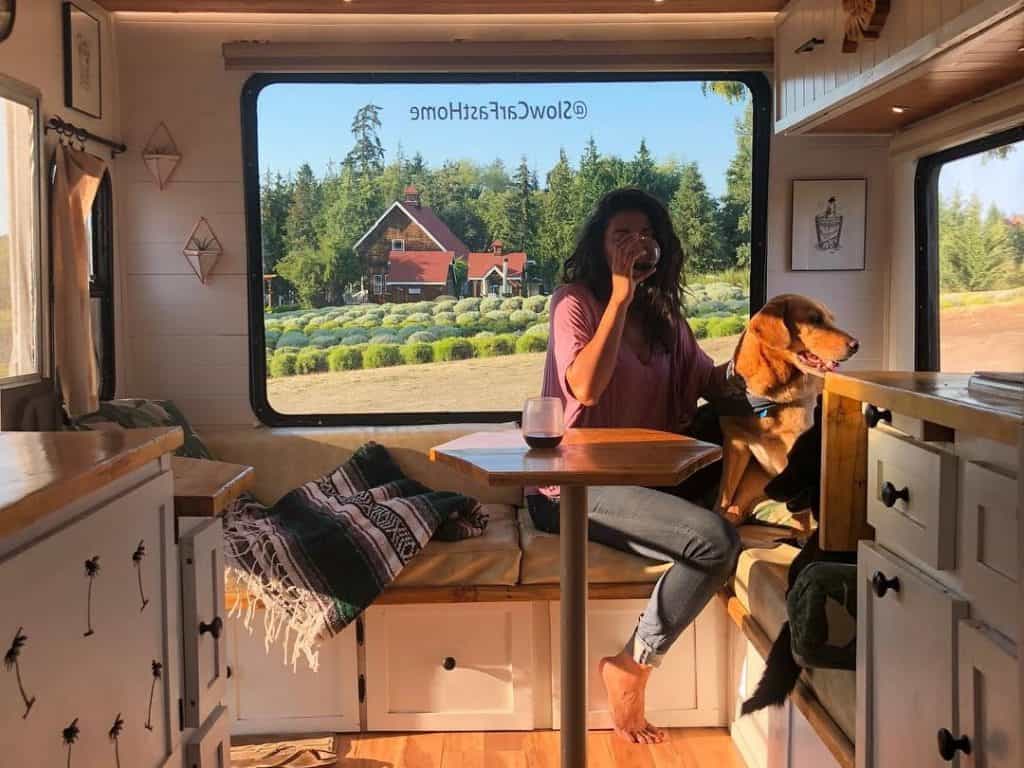
If you are looking to expand your van life camping options, there are some services out there that offer vanlifers and RVers the opportunity to find camping on private land.
- Hipcamp. Basically the Airbnb of camping, Hipcamp allows private landowners to list their property for nightly camping. Options on here range from boondocking on a farm, to sites with full hookups, to elaborate glamping experiences. There are some very affordable and interesting properties on Hipcamp, though, and this can be a great way to expand your van life camping horizons.
- Boondockers Welcome. For $30 per year, you gain the ability to find private property owners who will let you camp out on their land for free (we’re talking brief stays, not permanently posting up). This can be anything from secluded farmland out in the country to parking overnight in someone’s driveway in the heart of a city. This can really expand your options if you’re needing a place to sleep, and it’s a great tool to have in your van life arsenal.
- Harvest Hosts. For a yearly fee, Harvest Hosts opens up the option to camp at wineries, breweries, farms, and other awesome locations throughout the US and Canada. Camping is free, but it’s understood that you’ll buy something from your host while you’re there. Harvest Host locations are particularly concentrated along the East Coast of the US – which is great, since this region doesn’t have a whole lot of camping options in general.
Yearly membership that allows you to camp at wineries, breweries, and farms throughout North America - for free!
Join using the button below for 15% off your membership.
Bathrooms, Showers, and Laundry for Vanlife
Where Do You Go to the Bathroom on the Road?
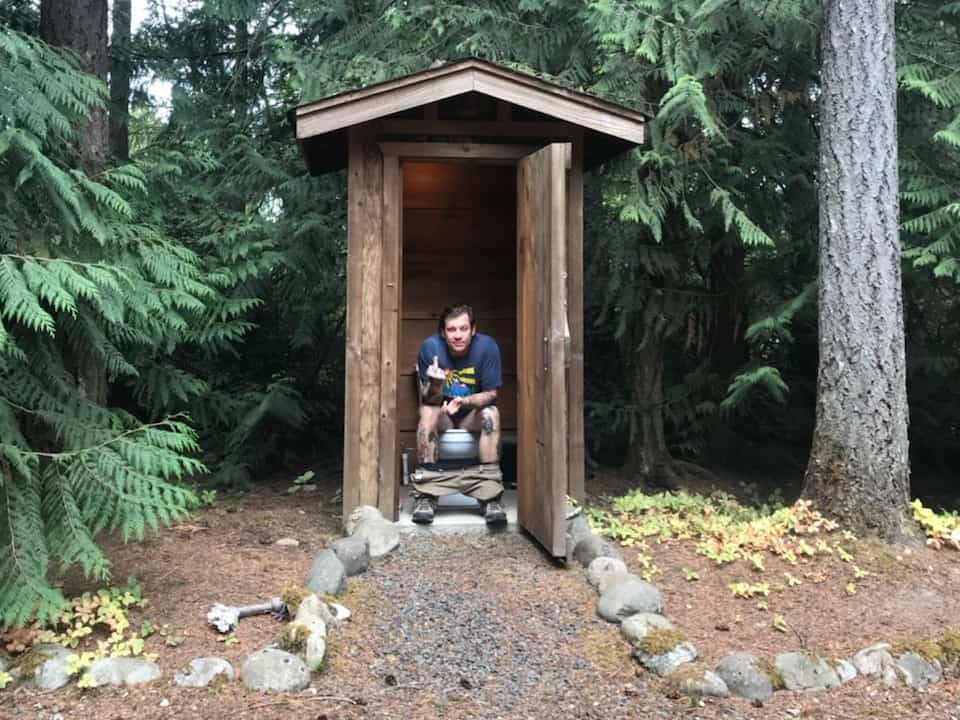
This is easily the most frequently asked question about living in a van. We always chuckle a bit whenever someone asks us because the reality is, it’s incredibly easy to find a place to go to the bathroom in North America.
Gas stations, Walmarts, McDonalds’, coffee shops – you name it, there’s a bathroom, and a van lifer has used it. Many free/cheap public camping spots even have pit toilets (basically nicer/cleaner permanent porta-potties) nearby. We also carry a poop shovel and travel bidet for when we’re wild camping away from a bathroom (always make sure to follow best practices for relieving yourself in nature).
Some van lifers include a portable toilet (cassette, composting, or otherwise) in their rigs. We didn’t think it was worth giving up the space, but others prefer the convenience and privacy of having their own bathroom situation.
In short, the “bathroom thing” has been the biggest non-issue for us in this whole crazy van life adventure. Don’t let it stop you from taking the plunge.
Read More: Bathrooms and Showers
Where Do You Find Showers on the Road?
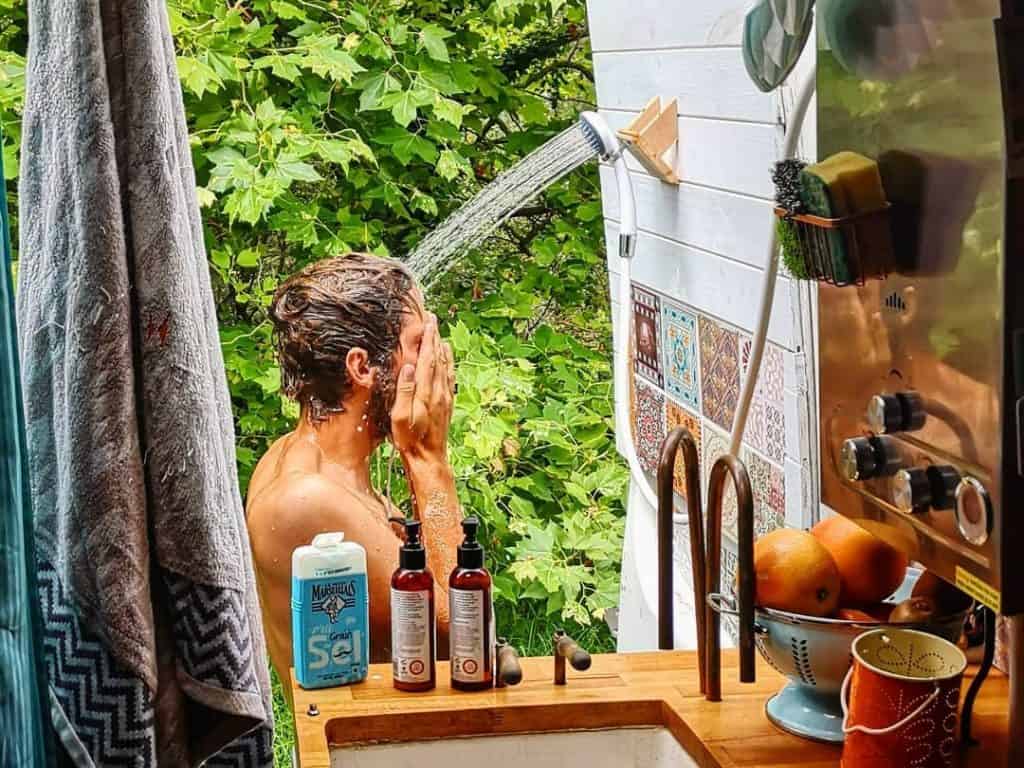
Every van lifer does showering a bit differently. Some try to get a shower in at least every couple days. Others may go a week or longer without showering. Whatever your preferences, there are plenty of options for taking showers on the road.
Exactly how do you shower while living a van life lifestyle, and where do you find showers? Here are some options:
- Gym memberships. About $22 a month will get you a Planet Fitness Black Card, which gives you access to every location in North America. Other national gym chains include Anytime Fitness, and 24-Hour Fitness. There is also LocalFit, a membership program that gets you access to select local gyms all over. Showering with a gym membership is best for vanlifers who spend more time around populated areas.
- State parks or developed campgrounds. Even if you don’t camp there, many parks have shower facilities and reasonable day use fees. This option costs money, so it’s best for infrequent showerers or vanlifers who don’t mind paying for camping more often.
- Truck stops. Many truck stops include shower facilities, but they tend to be a bit expensive ($10 or more). Truck stops are best for those times you really need a shower and don’t have another option.
- Include a shower in your rig. This can be as intense as a PVC-pipe road shower or as simple as a bag-style solar shower. Some vanlifers use on-demand hot water heaters or even build showers inside their vans. This option is best for vanlifers who prefer off-grid locations but like to shower more frequently.
- Dry showering. If you need to get clean but don’t have access to a shower, dry shampoo and baby wipes can do the trick!
Since we shower infrequently (every 10-14 days or so), we often grab a spot at a state park whenever we need a shower. We look at these times as little “breaks,” where we can enjoy a hot public shower, use a flush toilet, get some work done, and sometimes even do laundry.
Read More:
- 10+ Easy Ways to Find Public Showers on the Road
- “Bathrooms and Showers” section of our van build guide
Where do you do laundry on the road?
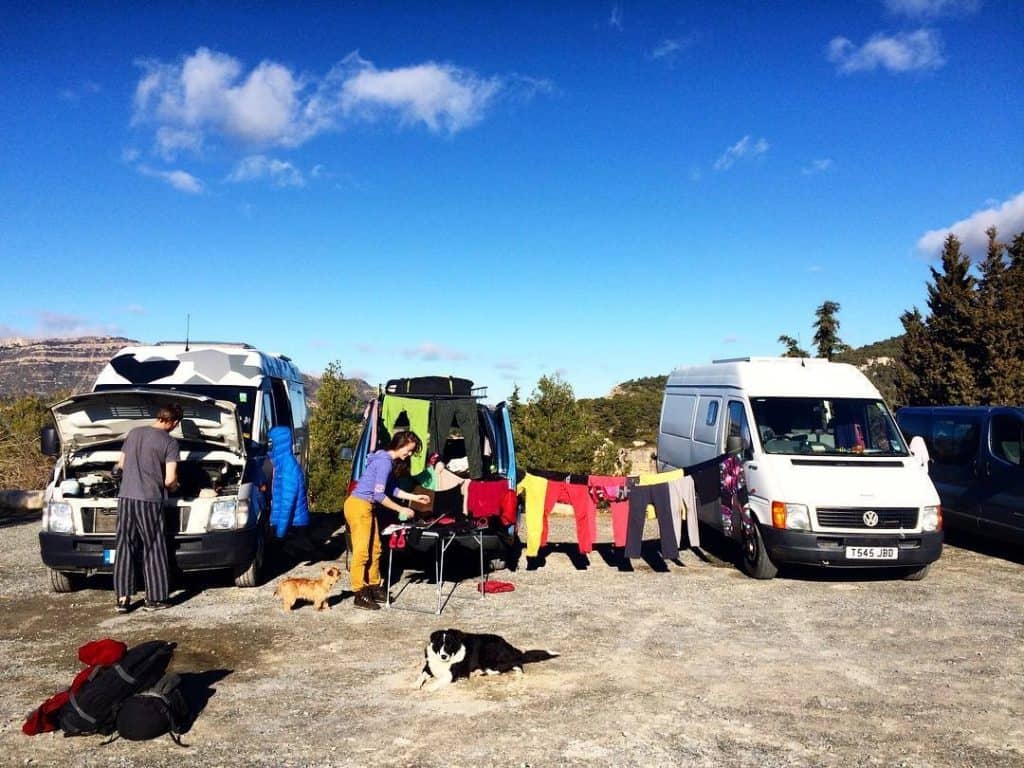
Whenever we need to do a load of laundry on the road, we typically find a laundromat near where we are. To save time (and keep our “town visits” to a minimum), we try to bundle all of our errands together – so a laundry day might include a trip to the grocery store, the hardware store, Goodwill, or wherever else we need to go.
Another option for laundry is staying the night at a developed campground that has laundry (KOA, RV park, some state parks, etc.). There, you’ll have the luxury of getting a hot shower, using a flush toilet, and washing your clothes. Triple win!
How Much Does Van Life Cost?
It depends. Just like you can spend a little or a lot living in a stationary dwelling, how much you spend while living in a van is entirely up to you and your priorities.
One huge advantage to van life is that you eliminate the costs of rent/mortgage and utilities, which often accounts for the biggest chunk of monthly spending when you’re in one place. And with the rising cost of housing in many areas, this can be enough to save you thousands per month.
You’ll still have to pay for gas and maintenance on your van, but you probably already need a car to get around anyway, so this isn’t that much of an increase. And you’re totally in control of how much you spend in this area – if you drive coast to coast several times a year, you’ll spend a lot more on gas and maintenance than you would if you stayed around one region.
There are still those fixed expenses that you’ll have no matter your living situation: insurance, groceries, cell service, toiletries. There are plenty of ways you can spend less in these areas, but this isn’t specific to living in a van.
Read More: This is How Much Van Life Costs Right Now
Can Van Life Save You Money? It’s All About Your Priorities
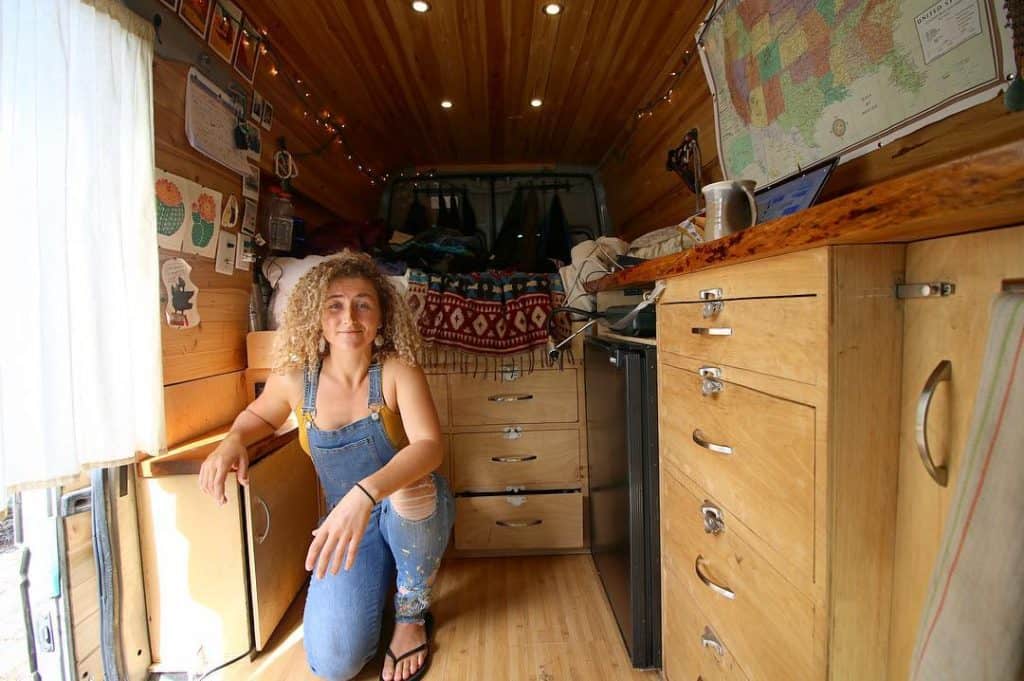
How much you spend and how much you save by living in a van all comes down to your spending habits.
To use us as an example: if we didn’t drive much, spent the bare minimum on groceries, and bought nothing else but dog food, we could theoretically swing van life for around $900 per month. Tack on the amount of traveling we generally do and our priority to eat healthy, organic foods, and that brings it up to about $1400 per month.
But we also occasionally like to do fun things that cost money, go out to eat every once in a awhile (although we still cook 99% of the time), buy things beyond bare bones necessities, put the dogs up at a sitter through Rover.com and check out a town, and stay at developed campgrounds every so often – so we generally end up spending about $1800 per month. That’s if nothing goes wrong and we don’t need to take an emergency trip to the mechanic/vet/urgent care (which does happen).
Still other van lifers might spend more money than they did in their stationary lives. The type of van lifer who buys a new Sprinter van, drives all over the place, needs mechanical work at the Mercedes dealer, and then pays for a $1500 per month membership to one of those shady van life co-working HOAs that are popping up isn’t going to save any money at all.
The point is, van life can save you a ton of on housing costs. But living in a van is not a silver bullet to zero spending. That’s ultimately up to you and how you choose to live.
Making Money on the Road
How do you sustain yourself financially while doing van life? There are as many ways to answer this question as there are nomadic individuals. There are plenty of ways to earn a buck with your own two hands, and the internet has opened up a wealth of opportunities for digital nomads and remote workers (even more so in our new post-COVID world).
Many van lifers do seasonal work of some kind, earning as much as possible then taking time off for travel and enjoyment. Seasonal farm work, “workamping” jobs, working at parks or ski mountains or other outdoors positions – these are just some of the many options out there.
Still others go the “digital nomad” route and work online. This is how we do things, and the location-independence that this affords is pretty awesome. These days you can find freelance online work doing just about anything. The vanlife community has freelance graphic designers, web developers, music teachers, writers, financial planners, accountants, and construction estimators. Some have even started web-based businesses to fund their travels.
The common denominator of successful van lifers is a willingness to hustle, to put yourself out there, and to take opportunities as they come.
Read More: 32 Ways Vanlifers Can Make Money on the Road
Seasonal, Temporary, and Short Term Work
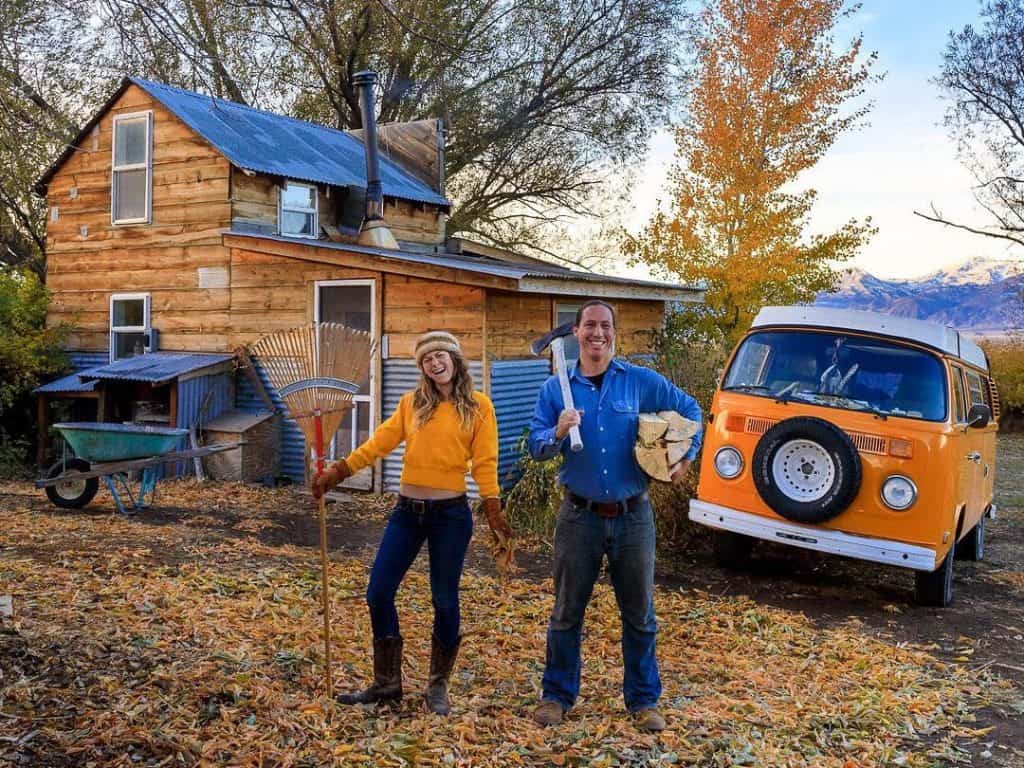
The beauty of van life is that you can do it very cheaply (depending on your priorities), so you won’t necessarily need a year-round full time job to sustain yourself while living in a van.
A common approach that many van lifers take to funding their travels is to post up somewhere and work seasonal jobs for a few weeks or months to earn some money, then take off and travel for a few months, then stop and work, then travel, and repeat.
Job options available include restaurant serving, labor, or temp jobs (in more urban areas), seasonal farming jobs, various “workamping” jobs, and seasonal positions at outdoors places like resorts, campgrounds, and parks
Where do you find jobs like this? Here are some resources:
Adventure and Outdoors Jobs
- CoolWorks. Very comprehensive job board that allows you to find jobs in awesome places and really zero in on the type of job that you’re looking for.
- Adventure Job Board. Job board for outdoors and adventure jobs.
- Back Door Jobs. Job board for short term adventure jobs.
Workamping Jobs
- Workamper News. The top resource for finding workamping positions. “Workamping” jobs offer you a job and a place to camp in your vehicle.
- Workamping Jobs. A job board for workamping positions.
- Amazon Camperforce. Seasonal holiday workamping jobs at Amazon facilities.
General Temporary Work
- Craigslist. The “gigs” section is a great resource for short-term employment.
- Labor Finders. Job board for all kinds of temporary hands-on positions.
Remote Work Positions for Digital Nomads
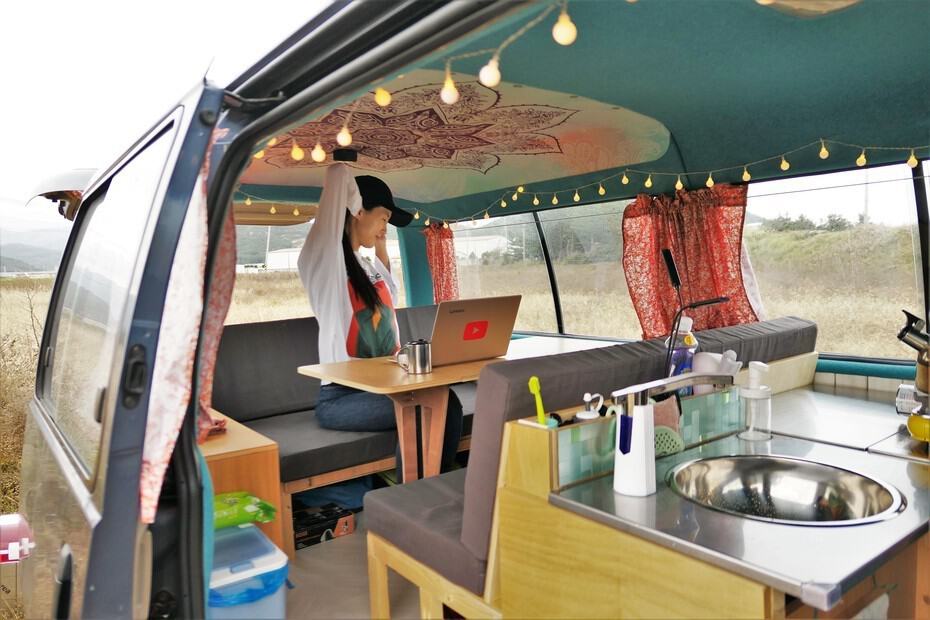
Many van lifers choose to find a remote work position that they can do from anywhere. This can include finding a job that allows remote workers, or working with your employer to make your current position remote.
You may be able to make more money with this approach than by hopping between temp jobs, but the trade off is that you’ll be working a whole lot more. And your travels will frequently be at the mercy of where you can find the best wifi or cell signal, which is one of the biggest pain points for van life digital nomads.
That said, the internet has been a game changer in opening up opportunities for those of us that prefer a nomadic lifestyle.
Here are some of the top places for finding remote work positions for van life:
- Flex Jobs. Massive job board full of remote and flexible work positions.
- Skip the Drive. Job board for remote work positions.
- We Work Remotely. Community board featuring remote work job postings.
- Remote.co. Resource for remote companies and workers, also featuring a job board.
- Hubstaff Talent. A hub for connecting businesses, agencies, and remote workers.
- Remote Tech Jobs. Unique job board with thousands of tech jobs categorized by technology.
Taking Your Skills to the Freelance Market
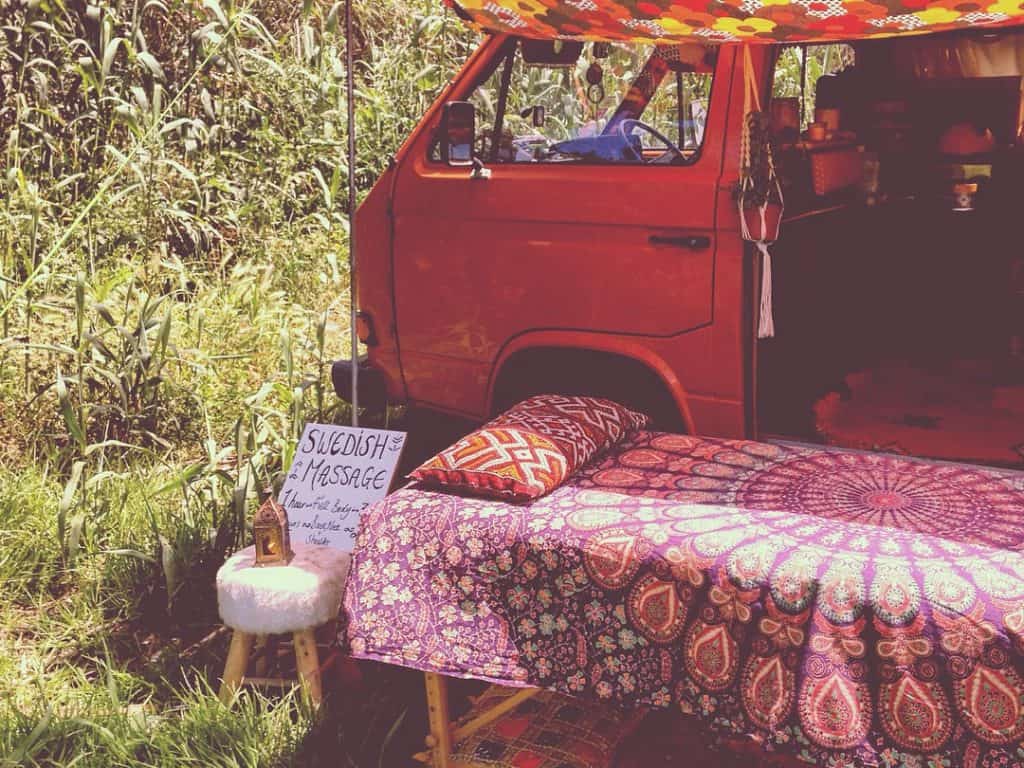
If you have marketable skills, you may want to consider freelancing. This can be a great option because you can make a very decent income, but also have freedom to choose when, where, and how you work.
What kind of things can you do? Really anything. The van life world includes freelance writers, photographers, videographers, accountants, business consultants, programmers, graphic designers, illustrators, therapists, music teachers, and virtual assistants. As long as you have a skill and are able to pitch yourself well to potential clients, you should be able to find work as a freelancer.
Freelancing can also be anything you make it to be. You can take in-person freelance jobs if you’re a photographer, for example, or remote gigs where you only deal with your clients over the internet. But unlike a traditional job, you’re ultimately working for yourself.
Here are some resources for finding work and succeeding at freelance work while doing van life:
Freelance Job Boards
- Upwork. This is a huge job board where clients post all kinds of freelance gigs. Back when we were freelancing, this is primarily where we found work.
- Guru. Another top job board connecting freelancers with clients.
- Hubspot Talent. Connecting businesses, agencies, and freelancers.
- Flex Jobs. Yes, Flex Jobs also includes freelance opportunities!
- More job boards…
Freelance Micro Gigs
- Amazon Mechanical Turk. Get paid to complete small tasks for companies.
- Fiverr. Post “gigs” that clients can hire you for. Despite the name, you can charge a lot more than $5, depending on what you do and the value you provide.
Freelancing Resources
- Freelancer’s Union Blog. The Freelancer’s Union has a ton of great information and resources for anyone involved in the freelancing game.
- Freelance Effect. Full of useful resources for finding work and learning how to be successful.
- Freelance to Win. Lots of great tips for landing high-paying jobs on Upwork (much of the info is applicable to pitching general clients as well).
Starting an Online Business
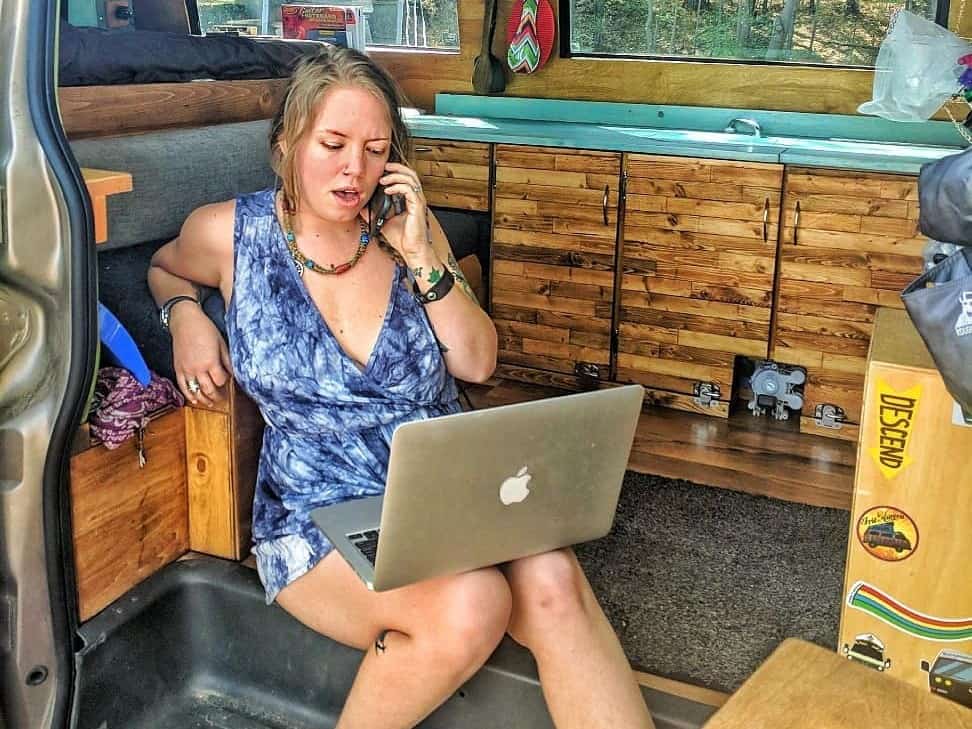
The internet has made it possible for anyone to start a business with just a computer and a wifi connection. And a big advantage of web-based businesses is that they are location-independent, allow you to set your own schedule, and require very little upfront investment aside from your time. For these reasons, starting an online business can be a great way to fund van life (or any other travel lifestyle).
Make no mistake: starting a business of any sort is not a get-rich-quick scheme.
Any business, including web-based ones, take a lot of time and work to get off the ground. But if you put the work in and do the right things, then it’s entirely possible to create a sustainable business for yourself that you can manage from anywhere, even while living in a van.
There are many different types of online businesses that you can start, but here are a few ideas to get you thinking:
- Build a profitable blog or website
- Develop apps and software
- Start an ecommerce store
- Sell digital products
- Start a podcast or Youtube channel
- Create online courses
- Provide a service
- …and more!
Again, we must reiterate that starting any sort of business takes a lot of hard work, and is not necessarily a quick or easy path to location-independent income. One strategy that many use to smooth the ride is to freelance or work remotely for basic income, and start their business on the side. Then once it takes off, they devote themselves to their business full time.
Resources:
- Smart Passive Income. One of the original internet marketing blogs. Features solid information for beginners to the world of online business.
- Ryan Robinson. Great blog with actionable tips and inspiration.
- Growth Lab. Blog about starting and growing an online business.
- Location Rebel. General site on creating a location-independent lifestyle business.
Blogging for Fun (and Profit!)
Yes, you really can make a living by building an awesome blog or website that provides value to your readers. And no, your website does not have to be about van life – it can be about anything that you’re interested in.
This is how we make a living on the road. We build informational websites (including this one), drive traffic to them, and monetize them – mostly through affiliate marketing and advertising. We started our first site in the spring of 2016, but it wasn’t until September 2017 that income from our sites began covering our expenses. Now, we bring in significantly more income than we ever did in our former 9-5 lives.
We are very grateful for how this has shaken out, but it also took a lot of hustle and hard work to get to this point.
So how, exactly, do you go about starting a website that earns you a living? We plan on writing a detailed post on this soon, but in the meantime here are some resources:
Free Resources
- Authority Hacker. The go-to resource for all things related to starting a useful and profitable website. The free content on their blog is super detailed, they have a helpful podcast, and if you want something more structured they have paid courses that are well worth the cost of admission.
- ProBlogger. One of the first (and still one of the best) sites about blogging for a living. This site is packed with resources and tips on all things related to building, monetizing, and growing a profitable blogging business.
- Blog Tyrant. An informative and down-to-earth blog about, well, starting a blog.
- How to Make Money Travel Blogging (From Someone Who Does). This blog post from World Travel Family is a great overview of how the business of blogging works behind the scenes. And the blogging section of this website also has some good free resources.
Paid Courses
While you can certainly find what you need to start a website out there for free, it can be overwhelming to sort through all the information floating around and figure out what you actually need to do.
This is where courses come in handy – they take everything you need to know and present it to you in a structured way that keeps you on the path to success. We wouldn’t have had the courage to get started on our online business journey without the help of paid courses.
Here are some of our favorites:
- Nomadic Matt’s “The Business of Travel Blogging” Course. Nomadic Matt runs one of the most successful travel blogs on the planet. In this course, he walks you through exactly how to start your own blog, build a platform, grow your reach, and make a living doing it. The cost of the course also includes technical support and coaching while you work on getting your blog up and running.
- The Authority Site System (TASS). From the guys behind Authority Hacker, this course walks you through the whole process of starting an income-generating website – from choosing a topic, to building your site, to getting traffic, to monetization methods. Membership also gets you into their very active and helpful Facebook group. We have access to TASS through our membership to Authority Hacker Pro, and it’s the real deal.
Earning Extra Cash Before Van Life
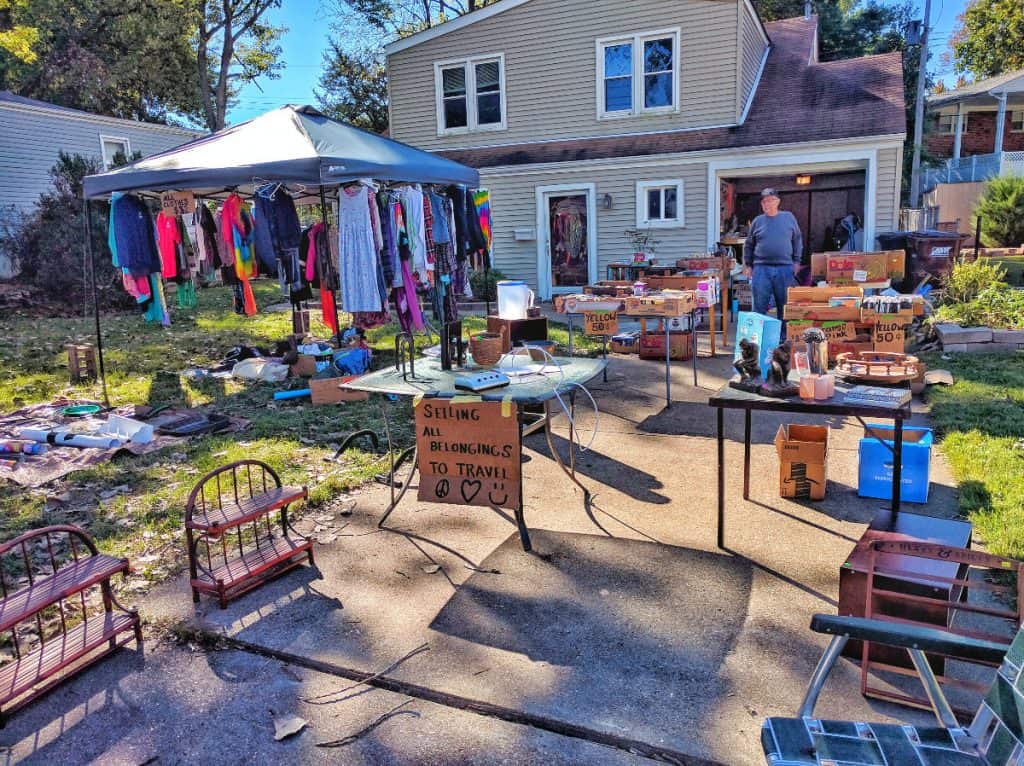
Are you worried about taking the leap to van life without a financial cushion? Consider doing everything you can to build up some savings before you move into your van. This can give you some time to get used to life on the road and figure out a way to make regular income, without the pressure of needing funds to buy groceries and put gas in your van.
Before we hit the road back in 2017, we had spent the previous year-and-a-half working our asses off to afford our van conversion and give us a cushion to start off with. And because of our hard work, we were able to build out our van and hit the road with about $10,000 in the bank.
Here are some things you can do to earn extra cash before van life:
- Sell your belongings. If you’re moving into a van, chances are you need to downsize. Might as well turn your stuff into cash by selling it! We were able to make over $10,000 selling everything we owned. And we wrote an epic post about how you can sell your belongings to travel in a van.
- Become an Airbnb host. If you have the space for it, hosting on Airbnb can be a great way to earn some extra income and meet interesting travellers from all over the world. We ran an Airbnb out of our spare bedroom for over a year, and it was a ton of fun (and covered our mortgage).
- Freelance. Yes, freelancing is great for earning pre-van life side income as well! We were able to make several hundred dollars extra per month doing freelance writing and graphic design through Upwork. See the “freelancing” section above for more options and resources.
- Work a side job. Take advantage of being in one location by picking up a side job to earn some extra income.
Already have a van? Make some cash listing it on Outdoorsy!
If you have a campervan or RV but aren’t living in it, you can list it for rent on Outdoorsy to help fund your travels. Outdoorsy is essentially the Airbnb of campervan and RV rentals, and it’s a great way to earn some extra cash in between your adventures.
Van life is a Lifestyle, not a Vacation
Vanlifers may live and work unconventionally and march to the tune of their own schedules, but it’s important to realize that the ones who make it work are working to make this lifestyle work for them. This often means hustling and making compromises. Despite having more location freedom, nomadic individuals still experience the ups and downs, the uncertainties and frustrations, of life and work.
Vanlife is not a vacation for most vanlifers. Vanlife is an alternative lifestyle. We still work, but we have a lot more freedom to choose where, when, and how we work.
The options we discuss above are by no means the only ways to make money on the road. There are many different methods to sustain yourself financially, you just need to get out there and find them. Many van lifers combine some or all of these income sources, and even come up with some of their own. This lifestyle rewards hustle and creativity, and the more you think outside the box and go after opportunities, the more successful you’ll be.
Getting Mail on the Road
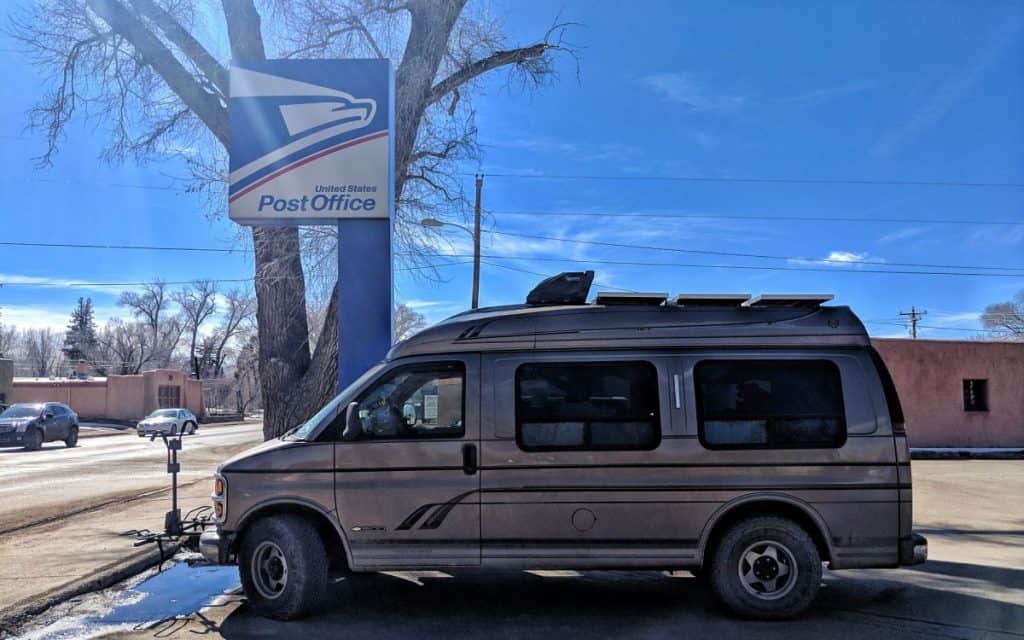
How do you get your mail when you don’t have a fixed address? Luckily, there are plenty of ways to receive your mail and packages when you’re traveling in a van. Like most things van life, it just takes a little extra planning. Below, we go over some common ways to get your mail and packages on the road:
- USPS General Delivery. Most Post Offices in North America (and worldwide) will accept general delivery mail and hold it for you for free (general delivery is also called “poste restante” in some countries). All you need to do is show up at the Post Office, show them your ID, and walk out with your mail. Both letters and packages are fair game (even Amazon deliveries). Since there are Post Offices everywhere this method is super convenient, and this is the primary way we receive our mail on our van life travels. Check out our Mail on the Road post for more details on using this service.
- Campgrounds. Many campgrounds will receive mail and packages for you. Just be sure to ask ahead of time (some campgrounds may charge a fee). We’ve never done this ourselves since general delivery is so convenient, but many full timers go this route.
- Amazon Lockers (Amazon packages only). If you really need to order something from Amazon, they’ve set up a convenient network of “lockers” where you can ship your packages. Amazon Lockers are mostly concentrated in metropolitan areas at this point, but the network is constantly growing. This option is super easy, especially if you’re a Prime member.
- Shipping Companies (FedEx/UPS). Another option is setting up a box at a UPS/FedEx store. Then, when you need you mail/packages, they can be conveniently forwarded to a location closer to where you are.
- Friends and Family. If you know you’ll be visiting a friend or family member, ask them if you can have some stuff sent to them. We’re lucky enough to have friends and family scattered all over the country, and we’ve used visits as opportunities to have mail and packages sent to us at a safe address.
Read More: Vanlifer’s Guide to Mail and Packages on the Road
What Do You Use as Your Permanent Address?
The above options are great for receiving your mail while you’re out traveling. But when you live in a van, what do you use for your permanent mailing address? Here are the most common options:
- Use a friend or family member’s address. If you have a friend or family member willing to accept your mail and let you use their address for vehicle registration, etc., then this is by far the easiest option. This is also what most people do when they start out with van life, and it’s what we did our first year on the road.
- Use a mail-forwarding service to domicile in a nomad-friendly state. There are several reasons why it might make sense to switch your “domicile,” or legal permanent residence, to a more nomad-friendly state (the most common are South Dakota, Texas, and Florida). Doing this requires that you sign up for a mail forwarding service within your new state, and fulfill additional requirements that the individual state has.
Read More: Domicile For Nomads: Establishing a Legal Residence on the Road | Our Adventure Becoming South Dakota Residents
Insurance for Van Life (health, auto, property, etc)
Now for the fun stuff! No one, and I mean no one, enjoys dealing with insurance. And living a nomadic lifestyle like van life can make figuring all of this out quite a bit more challenging.
We don’t pretend to have all the answers here, but below we’ve compiled our best knowledge to help you navigate insurance issues as a vanlifer.
Health Insurance
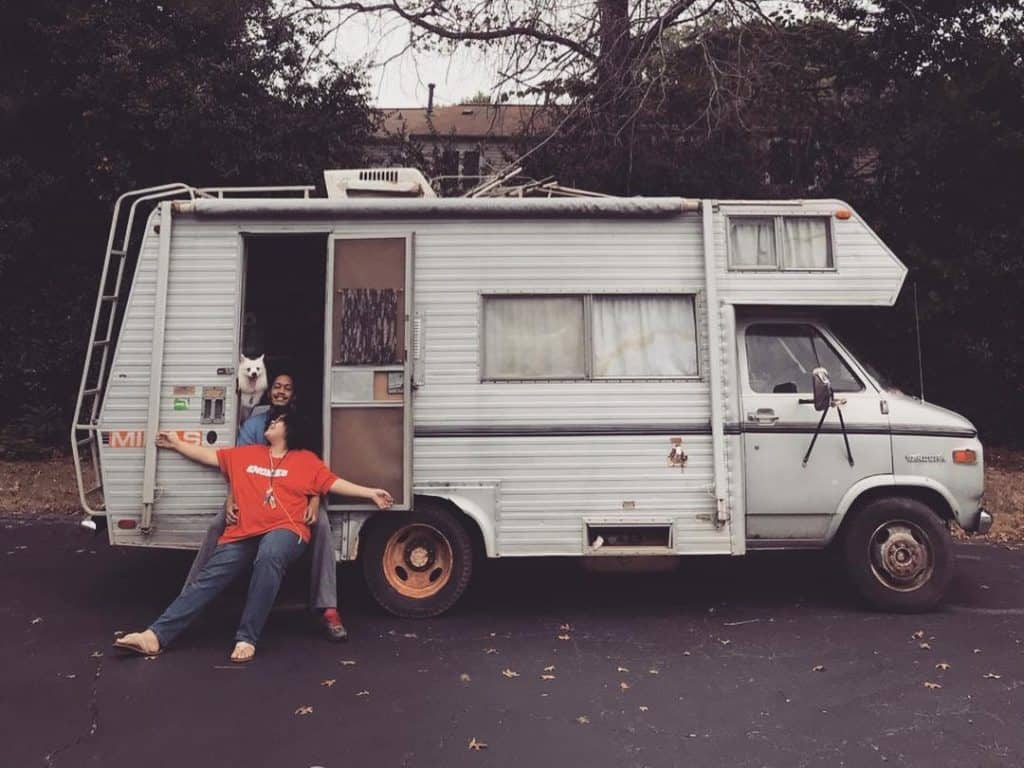
There’s no sugarcoating it, the health insurance situation in the US is abysmal, especially if you travel full time. There are very few real options out there for nomadic vanlifers that offer coverage in all 50 states.
If you have a job that includes insurance coverage (and accommodates your lifestyle) – great! You may have nationwide coverage. However, many van lifers are self-employed or work seasonal/temporary/contract positions. That means we’re on our own for insurance, and the coverage options available to us are not great, to say the least.
Note: This is a complicated topic that deserves a post in itself. Also, we are not health insurance experts. If you have insurance needs we encourage you to speak with a knowledgeable professional for advice. RVer Insurance Exchange is an insurance broker that is familiar with the needs of nomadic travelers, and can be a good resource.
Here are some of the main health care options for vanlifers:
Affordable Care Act (Obamacare) Major Medical Plans
The Affordable Care Act (ACA) provides access for anyone to purchase an insurance plan on government exchanges, and provides subsidies to make it affordable if you have a lower income. But unless you’re stationary and/or qualify for subsidies, these plans don’t make much sense for most van lifers.
See, the majority of ACA plans only cover you in the state where you purchase them (i.e. the state where you’re a legal resident). So if you’re a legal resident of New Jersey and you need to go to the doctor in California – guess what? You don’t have coverage.
An ACA plan may work for you if you vanlife in/around one place. If you qualify for subsidies, an ACA plan can also be a good hedge against catastrophic medical emergencies (which are typically covered out of state). But if you travel full time and do not qualify for subsidies, ACA plans won’t do a whole lot for you.
Important Note: ACA plans are extremely state-specific, the options are constantly changing, and some states have much better options than others. It’s always check the current health insurance options in your state of residence.
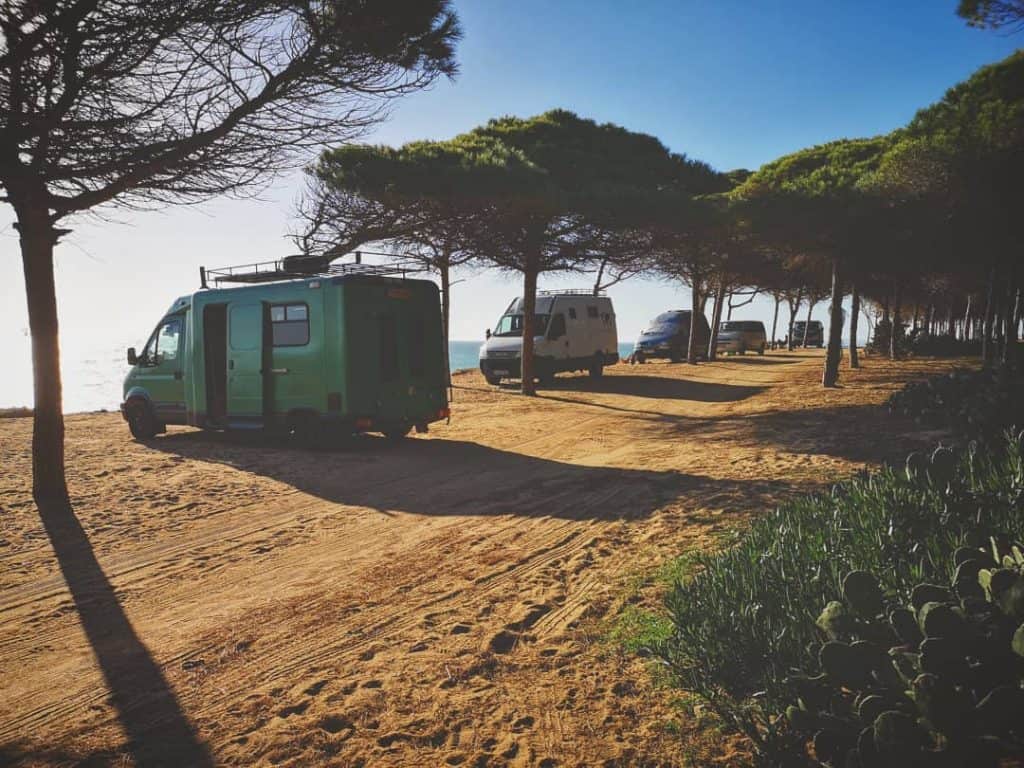
Short Term Medical Plans
Another option for van life health insurance is a short term medical plan. The great thing about short term plans is that they are much cheaper than ACA plans, and they work in all 50 states. And despite the name, you can purchase these plans with coverage terms up to three years.
The big downside to these plans is that they are not ACA-compliant. This means that they don’t cover certain things that ACA-compliant plans are required to by law, and they can also deny you coverage based on pre-existing conditions.
But, if you’re generally healthy, want the ability to go to the urgent care or see a doctor without paying full price, and want some hospital/emergency coverage while living in a van, a short term plan might be worth looking into. Find out more about what to look for here.
Healthshare Ministries
Healthshare Ministries are an alternative approach to health coverage that have been growing increasingly popular in recent years. These are cooperatives of religiously-affiliated people who agree to help cover each other’s medical expenses.
Healthshare plans usually require you to accept a moral covenant when you join, and may require you to be a practicing Christian (some are a little more vague on this point, offering some wiggle room for non-Christians and even atheists to get on board). It’s important to note that these plans are not insurance, and there is no guarantee or legal requirement that they will reimburse you when you need them to.
Still, Healthshare plans can be a bit cheaper than ACA plans, and may help pay for things that just aren’t covered by non-ACA insurance (like childbirth). Depending on your needs and what you’re comfortable with, this could be an attractive option for insurance while living in a van.
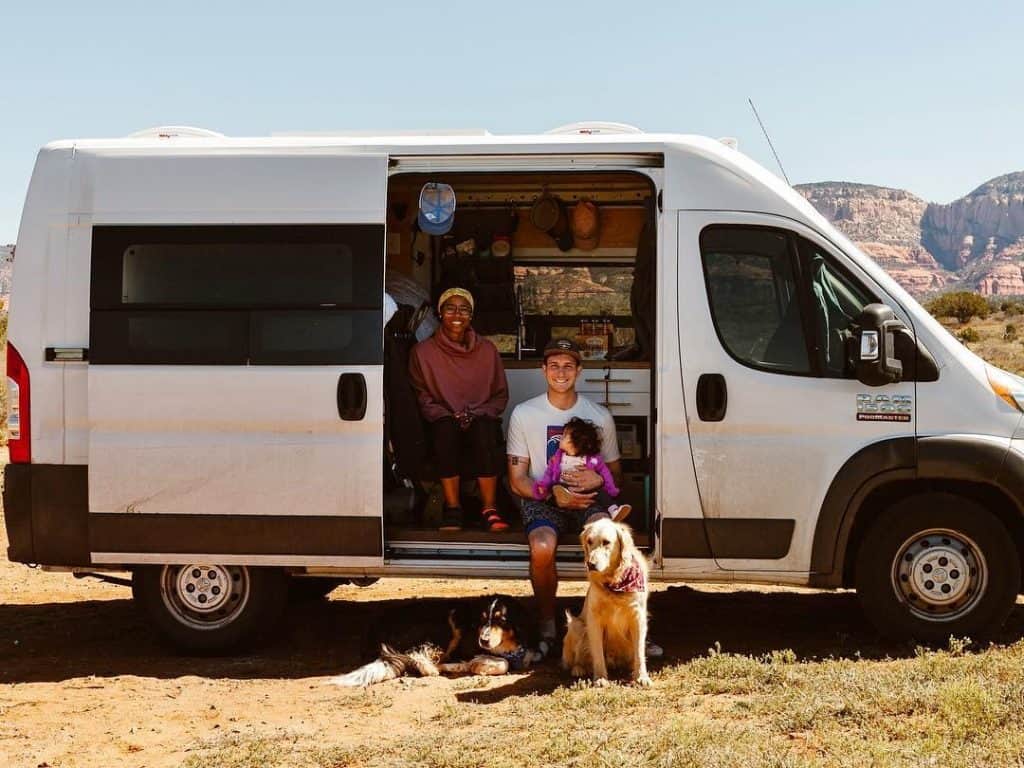
Fixed Benefit Indemnity Plans
These types of plans provide fixed benefits for medical expenses (usually in cash directly to you). They can be good to have to cover yourself in case of catastrophic emergencies, or to supplement the coverage of a short term plan or Healthshare plan. Indemnity plans range from full-blown hospital plans that pay out significant benefits for all kinds of things, to more limited plans that pay out smaller amounts.
Self-Paying for Medical Expenses
Many vanlifers choose to go without insurance altogether and self-pay for basic medical expenses. This actually isn’t as bad as it sounds (for minor care or urgent care visits, at least). If you are able to pay upfront, most medical providers offer a self pay discount that shaves a lot off the cost. Still, medical care can get expensive fast, so if you plan on self-paying it’s still a good idea to cover yourself in case of a major emergency (through an indemnity plan, for example).
(For business owners) Association Health Plans
If you are fortunate enough to run your own business with at least two W2 employees (including yourself), you may be able to get legit national health insurance through what’s called an association health plan. This is when a bunch of businesses band together under an association (like a chamber of commerce, for example) to purchase group health insurance from a big insurer.
Having access to something like this entirely depends on the state your business is headquartered in, and what business associations are available there. The upside is that you may be able to find a plan that works nationally, for lower premiums than comparable plans on the ACA marketplace. The downside is that there are no subsidies for these plans, so they aren’t always cheaper. These plans are also less regulated, so your premium will depend on your health history. The best option for finding one of these plans is to talk to a health insurance broker in your state, since they can walk you through the ins and outs.
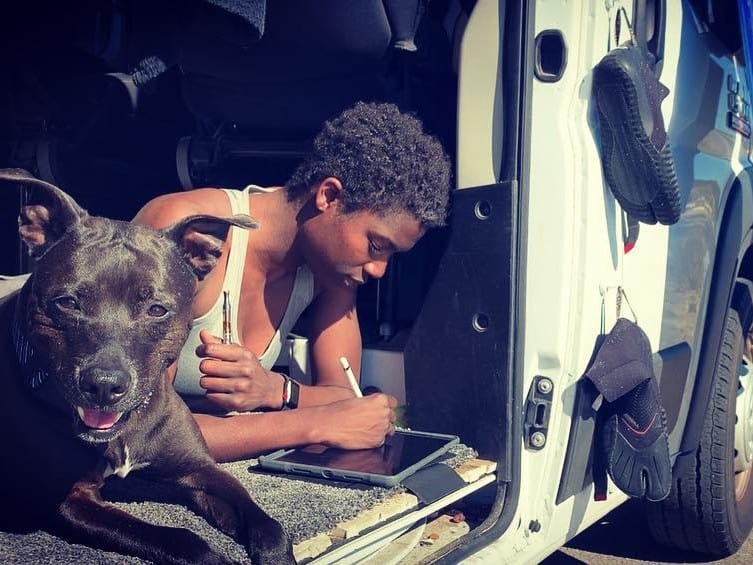
Telemedicine Plans
Sometimes you just need some quick medical advice or a prescription, and don’t necessarily need to physically visit a doctor. Telemed plans give you access to a doctor via phone or Skype whenever you need one, all for an affordable monthly rate. They can even write you prescriptions.
What do we do for health insurance? When we first hit the road in 2017 we had an ACA-plan, before we discovered (after getting a surprise $800 medical bill) that our insurance did not cover us out of our “home” state. After that, we signed up for a short term medical plan, and supplemented it with an inexpensive fixed-benefit accident plan to help out with unexpected expenses. Beginning in 2020 we hopped back on an ACA plan since we were expecting regular doctor visits related to starting a family, and we were basically staying put in one state (New Mexico). As of 2022, we have a business association health plan through the Missouri Chamber of Commerce.
It’s important to note that what works for us may not work for you. Make sure you research all of your options and choose what’s best for your van life situation.
Insuring Your Van
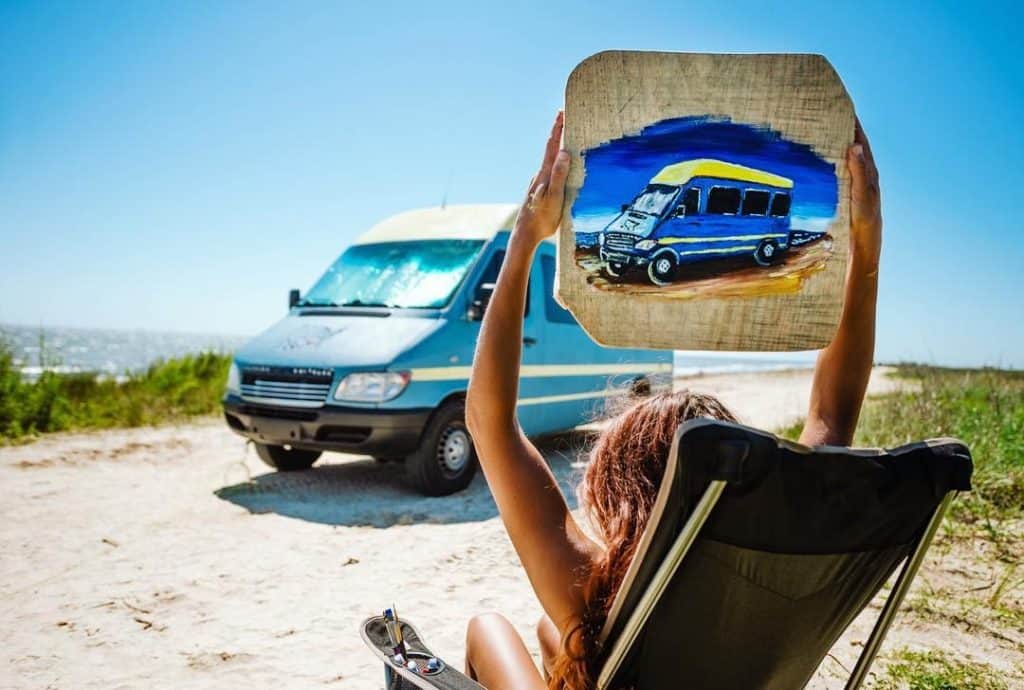
Properly insuring your vehicle, your van build, and the stuff inside it can be a dicey proposition for vanlifers. The insurance industry just hasn’t been fully behind this kind of unconventional lifestyle. They throw up all kinds of barriers, and may even drop your coverage if you’re not honest about your situation and they find out about it. And if you’re a part time van lifer, your insurance probably won’t be down with you defraying some costs by renting out your rig on a marketplace like Outdoorsy.
Kickass Option: Vanlife-Specific Insurance from Roamly
Roamly is the most interesting option for van life insurance out there right now. Roamly is an insurance company created by the people behind Outdoorsy, so they understand the ins and outs of nomads living in vehicles for long periods of time and what our insurance needs are. And because of that, there are a ton of advantages for anyone with a campervan or RV.
- Fulltimer friendly. You won’t lose your coverage if they find out you’re living in your vehicle, because this insurance is literally built for that. They get it. You also won’t be forced to buy an expensive commercial policy because your cargo van is technically a “commercial vehicle.”
- Insure the cost of your build (both DIY and professionally built). With Roamly, it’s easy to insure the cost of your van conversion, no matter if it’s a pro buildout or a DIY conversion. As long as your build includes either a bolted down stovetop OR a bolted down 12V fridge OR a toilet, you’re eligible for this coverage. Just provide Roamly with documentation/receipts of what went into your build, and you’re good to go.
- Cheaper than RV insurance. Roamly understands how their customers use their vehicles, both through personal experience and through backend data, so it often comes out to be cheaper than traditional auto or RV coverage. People who get a quote from Roamly save an average of 25% on their premiums.
What’s the catch? Well, right now the issue is that Roamly isn’t available in every state yet. They do have partner coverage in some additional states, but you can only insure the cost of your build in states where Roamly has been officially rolled out.
Roamly is the only insurance provider out there that's built specifically for the needs of vehicle nomads. Save money, insure the cost of your build, and stop lying to your auto insurance company.
Insuring Your Van Life Rig Through a Traditional Auto or RV Insurance Company
Regular auto insurance can be difficult to get without a permanent address. Even if you have a mail forwarding address, most insurance companies require that you have a “garageable” address for your vehicle, and don’t take too kindly to the idea that you’re living in a van full time.
While many vanlifers end up concealing their living situation from their insurance companies to make sure they don’t get dropped, being honest about your lifestyle can sometimes get you coverage that’s better suited for vanlife, and may even cover your build and belongings.
Here are some options to think about when insuring your campervan:
- Talk to an insurance agent/broker face-to-face, and be honest. When you’re dealing with an individual agent and are upfront about what you’re doing, they may be willing to help navigate you to options that will work for you. Insurance brokers are also a good option, since they can direct you to plans at multiple insurers.
- Consider going through an insurance provider that is used to dealing with RVers and van life nomads. Like vanlifers, RVers also live in their vehicles and may not have a permanent residence, so options for them tend to work for us as well. If you use a mail forwarder for your legal address, they may be able to refer you to a broker who’s used to dealing with people in your situation. There are also some insurance brokers out there who market themselves towards RVers and vehicle nomads, such as Good Sam Insurance and RVer Insurance.
- Consider insuring your van as an RV. If you convert your van into a mobile dwelling you may be able to insure it as a recreational vehicle (rates for RV insurance tend to be lower than auto policies). To do this, you may need to re-title your vehicle as an RV, and the requirements for that are different in each state. Again, talk this through with your insurance agent.
Can I insure my van conversion?
Maybe – ask your insurance agent before you start building to get an idea of the requirements they have. But again, if you go with Roamly you can certainly insure the cost of your build.
(Check out this article from explorist.life about how they insured their build)
What about the stuff inside my van?
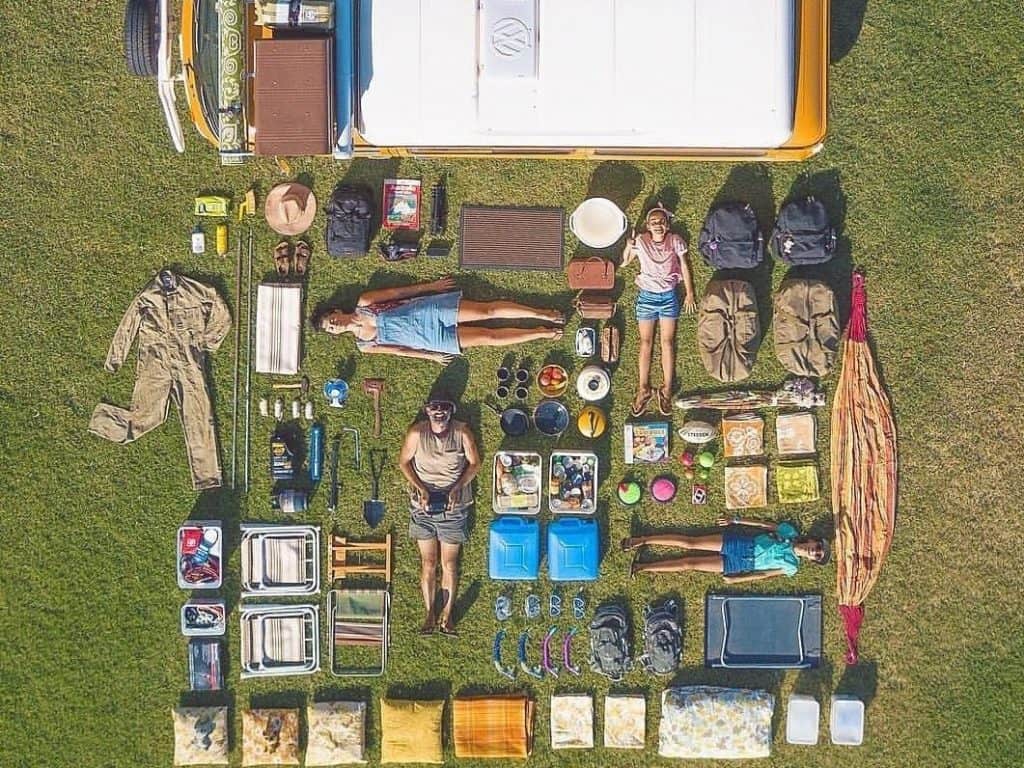
If you’re a part-time or seasonal van lifer with a stationary dwelling somewhere, your stuff may already be covered under your homeowner’s or renter’s policy. If you don’t have either of these, then you can look into getting a personal articles policy to insure your belongings. State Farm offers a personal articles policy, and these types of policies may also be available from RV insurers like Good Sam or RVer Insurance.
Van Life Resources and Community on the Road
To outsiders, the idea of living in a van may seem like a lonely pursuit that’s devoid of community. But in reality, this couldn’t be farther from the truth. The nomadic community is incredibly vibrant and welcoming, and there are many great ways to meet new people and stay connected – even when you’re nowhere near each other.
Connecting with the Van Life Community
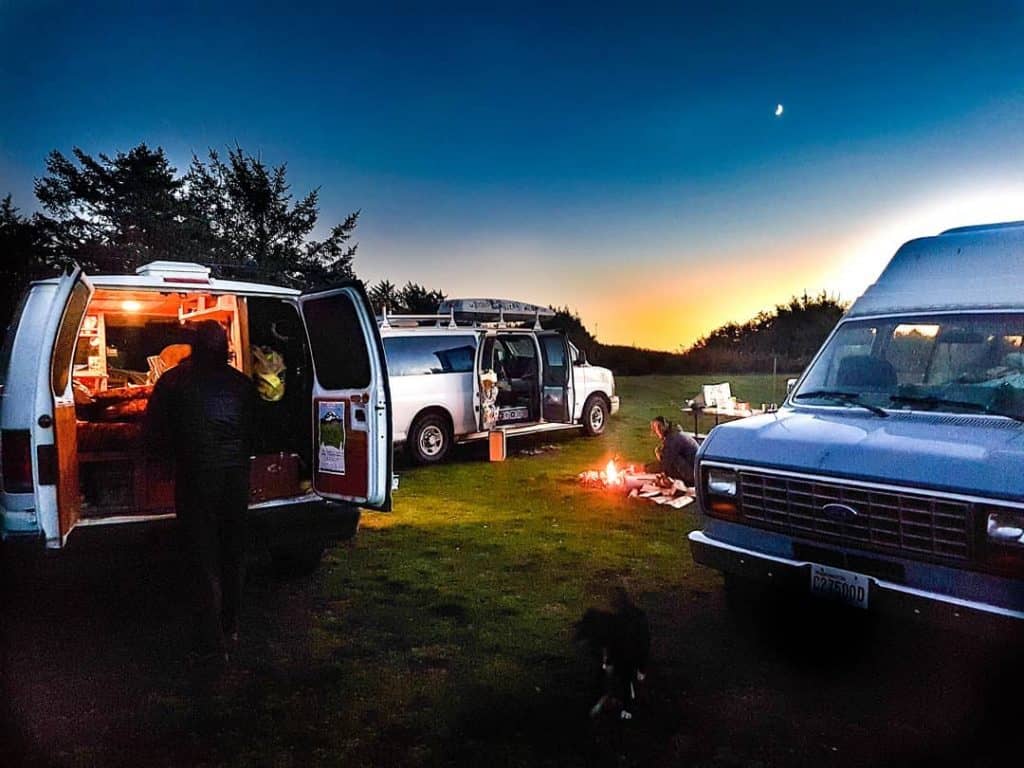
Many vanlifers begin their foray into the nomad community via the internet. Internet resources are great places to ask questions and find useful information, as well as connect with other vanlifers. Here are some of the most common ways to connect online:
- Instagram. For all of its faults, Instagram is a great place to connect with other vanlifers. We’ve established many relationships through Instagram that began with comments and messages, and eventually transitioned into real life friendships. Instagram is also a great way to keep up with your van life friends and their travels.
- Vanlife Facebook groups. There are several very active Facebook groups out there that cater to the nomad community. You can find everything from general #vanlife groups, to groups about RV/vanlife solar tips, to groups for “full time families”. These groups tend to have lively discussions, and they’re great places to ask questions, learn, and connect with others.
- Vandwellers subreddit. Like the vanlife Facebook groups, r/vandwellers is a great place to find tips and tricks, and connect with others interested in this lifestyle. r/vanlife is a smaller subreddit that’s also helpful.
- Forums. There are several active forums that cater to various segments of the nomad community. Some of the more popular ones are:
How about connecting in person? There are many vanlife gatherings all over North America (and the world) that bring nomads of all kinds together. These are awesome events that allow van lifers to hang out, swap stories, and form instant life-long friendships. Here’s just a sampling of some of the gatherings out there:
- Midwest Vanlife Gathering. Every year in the beautiful Midwest. This was started by us here at Gnomad Home, but we’ve since passed the torch (though we still try to attend).
- Descend on Bend. Every fall near Bend, OR. This is the grand-daddy of all van events, with well over 500 vans in attendance.
- Asheville Vanlife Rally. Every September in Asheville, NC.
- Vanlife Diaries hosts a series of events in the US and Australia.
- Go-Van hosts events in Canada every year.
- Rubber Tramp Rendezvous. Hosted by Bob Wells from Cheap RV Living, this is technically an RV event (though it does have a van section). RTR attracts thousands of nomads to Quartzsite, AZ every January.
Essential Apps for Vanlife
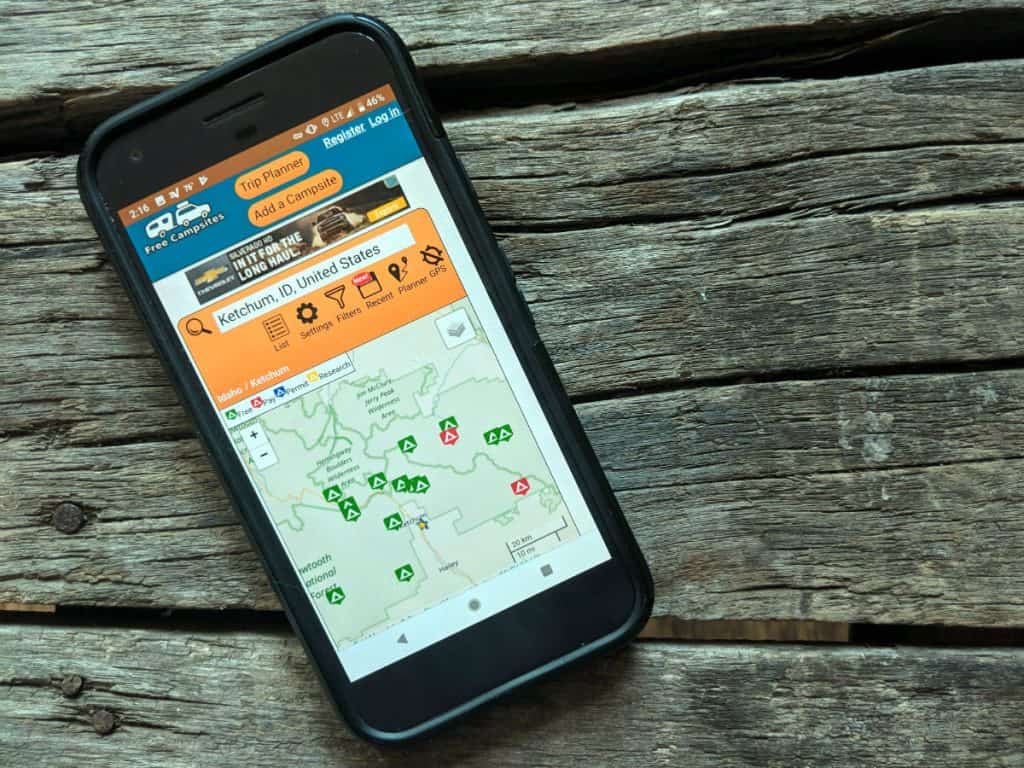
When you’re traveling in your van, you need a way to find places to camp and other local amenities. These are the apps that we find ourselves using all the time.
Van Life Camping Apps
- FreeRoam (iOS | Android | Website). FreeRoam not only shows you where the camping’s at, it also offers some really useful tools like the ability to overlay public land maps, so you can see where off-the-beaten-path camping might be available in an area. This app also shows tons of data on each campsite to help you decide which one to go for (data is user-generated so it’s not available for all sites yet, but more is being added all the time). And, the company behind this app is a nonprofit that advocates for nomadic lifestyles, protecting public space, and educating people on responsible usage.
- The Dyrt Pro (iOS | Android). Although this is a paid app, The Dyrt Pro throws down with a ton of useful features for van lifers, RVers, and campers. Their flagship feature is their trip planner, which allows you to input a destination, camping style, and other preferences, and the app will spit out camping options to explore along your route. This can save you a lot of time spent scrolling through campsites on other apps. The Dyrt Pro also features public land map overlays, the ability to search offline (a great feature, since you won’t always have cell service), and discounts at a wide network of partner campgrounds. At $35.99 per year, this app is worth having in your arsenal.
- Freecampsites.net (Website). The original go-to resource to find great, free boondocking spots. They don’t have an app for some reason, but this website is a hugely comprehensive and useful database of free campsites. Many sites have reviews, photos, and information on cell service as well. Bookmark this one.
- iOverlander (iOS | Android | Website). Great resource for finding boondocking spots and random little pull-offs that aren’t on other apps. A ton of people use this, though, so chances are you’ll face some competition for the best sites. These days, we actually make sure that sites we’re considering for a longer stay aren’t listed on iOverlander.
- Campendium (iOS | Website). Excellent database of both free and paid camping with a slick interface. Not as comprehensive as some, but still good and features a ton of user-generated reviews. This is one of the top apps for iPhone users, but Android users are stuck with their website.
- RV Parky (iOS | Android) or Park Advisor (iOS | Android) or Allstays Camp & RV (iOS | Website). These apps all pretty much do the same thing – they show you campgrounds (federal campground, state parks, and private/RV parks), as well as other overnight parking options like Walmarts, big box stores, truck stops, and more. These apps also show useful stores for nomads like REI and Camping World, as well as dump stations, propane, etc. A must have for every nomadic traveler.
Why so many camping apps? Well, no camping app has every single campsite listed in their database. Also, some apps are better for free boondocking sites, while others are better for campgrounds (free or paid), or general overnight parking. Checking multiple apps helps us make sure we have an idea of all the available options.
Other Useful Apps
- Open Signal (iOS | Android). Open Signal shows super detailed cell phone coverage maps, almost down to the yard. If you want to get an idea of what the cell service is like in an area, this app is unbeatable. If we need service, we compare coverage maps from Open Signal with maps of potential camping to help us find a spot that might have coverage.
- Gas Buddy (iOS | Android | Website). Why pay more for gas than you need to? Gas Buddy shows you gas prices in your area so you can make sure you’re getting the best deal.
- Waze (iOS | Android). Waze is an incredibly useful navigation app because it collects crowd-sourced data on things like accidents and speed traps. This app is incredibly helpful in any driving situation.
- Rover (iOS | Android | Website). Traveling with a dog, but need to do something non-dog-friendly? Put them up with a dog sitter from Rover! Basically the Airbnb of dog-sitting, Rover allows you to find local people to watch your dog for a few hours or a few days. We’ve used Rover extensively on the road, and it’s great.
- Windy (iOS | Android | Website). You need to stay on top of the weather when you travel in a van. And there’s no other app that has a better view of current and future weather conditions around the worlds than Windy. You can see everything from wind speed and direction, humidity, temperature, storms (complete with cool lightning pops), fog, clouds, dust storms, and more. And since this app was designed by extreme sports enthusiasts, you can even see information like wave swells and snow depth.
Van Life FAQ
- Is vanlife just fun and glamorous all the time, like it looks on Instagram?
- I see a lot of #sponsored posts on Instagram. Is every vanlifer making a living from sponsorships?
- If I moved into a van with my significant other we’d end up killing each other. How do you guys do it?
- I have a dog/cat/ferret/snake. Can I still do vanlife?
- How do you decide where to go next?
- Will you share your favorite secluded spots with us?
- Where do you get rid of your trash and recycling? How do you keep the interior of your van clean?
- What do you eat on the road? I bet it’s a lot of fast food and gas station junk!
- Where do you find fresh drinking water on the road?
- How do you deal with cold weather/hot weather in a vehicle?
- Do you get lonely? How do you meet people traveling?
- What kind of MPG do you get? Aren’t you worried about your carbon footprint?
- I’m not sure if I’ll like living in a van. Is there a way I can test it out for a short period first?
Is van life just fun and glamorous all the time like it looks on Instagram?
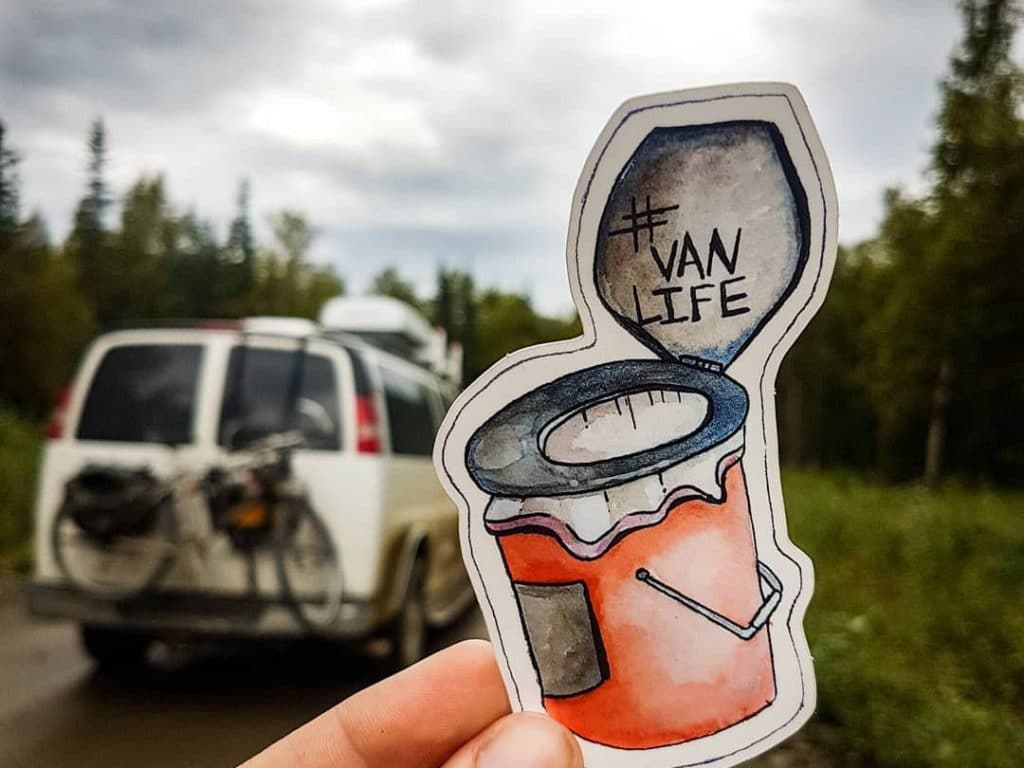
No. Well… maybe. We think van life is fun pretty much all the time, but it’s definitely not glamorous. We don’t spend all of our time lounging half-naked on pristine beaches, or lying in bed staring at a majestic alpine lake out our back doors. Sure, those things happen, but that’s not what van life is like day-to-day.
Oftentimes we don’t know where we’re going to sleep on a given night until we get there. Our van quickly becomes a disaster area if we neglect to put something away. We wear the same clothes for days (sometimes weeks) at a time, and showering is a semi-weekly event.
And those beautiful wilderness camping spots? They almost never have cell service, so when it comes time to get our work done we have to decamp somewhere with signal, which often ends up being some sort of parking lot. And we work a lot, so that dictates what we do more often than we’d like.
But while van life isn’t clean and beautiful and picturesque all the time, it’s still a freaking blast.
Every day is an adventure, and not knowing where you’ll end up or what you’ll be doing is addictively freeing. This may feel like stressful uncertainty for some, but for us it feels like exciting possibility, and it forces us to open up to the reality that none of us really knows what the future holds.
On top of that, some of the best people we’ve met, we’ve met on the road. Even though we all like to go off and do our own thing most of the time, there really is a true community feeling among all of us nomads that is very open, accepting, and non-judgmental.
So is vanlife glamorous all the time? Hard no. Is it fun? Hell yeah! But that also depends on your definition of fun.
I see a lot of #sponsored posts on social media. Is every van lifer making a living from sponsorships?
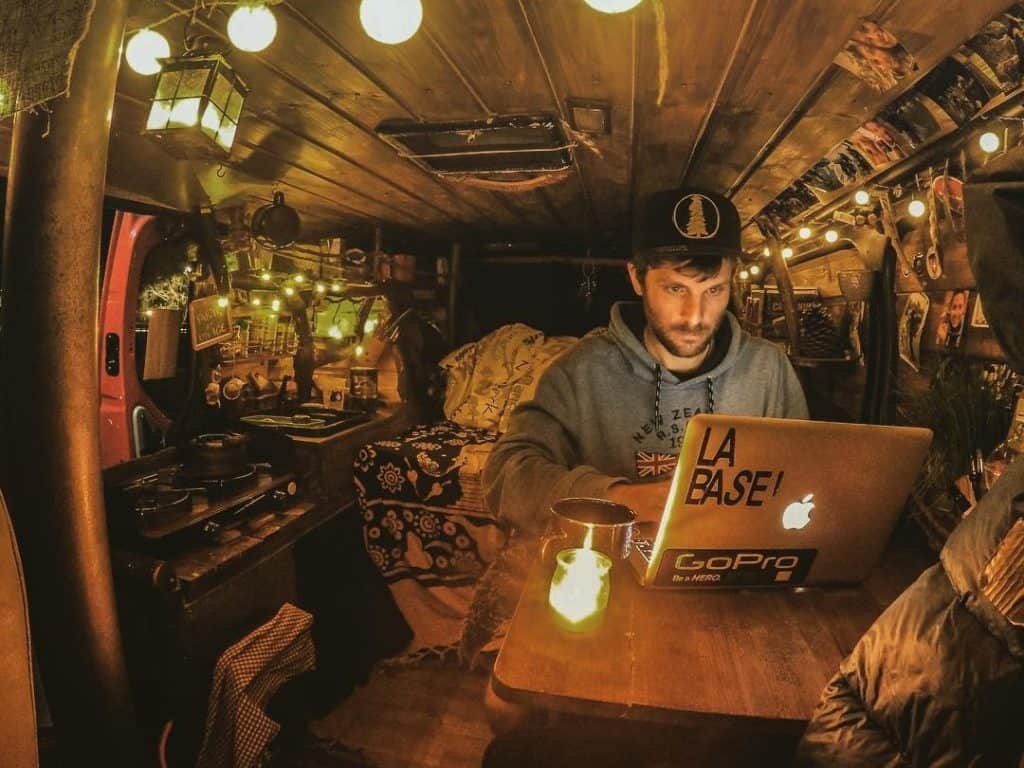
No. In fact, this is one of the most difficult ways to try to make van life work financially. Sure, it’s possible, and there’s a small handful of people who do it successfully, but it’s a lot harder than it looks. If your vanlife dreams center around doing nothing but relaxing in stunning locales and snapping sponsored pics for Hydro Flask, you’re in for a rude awakening.
Despite the impression you may get from your Instagram feed, for the vast majority of vanlifers making a real living as a social media influencer is just not realistic and is kind of a rat race in itself.
If I moved into a van with my significant other we’d end up killing each other. How do you guys do it?
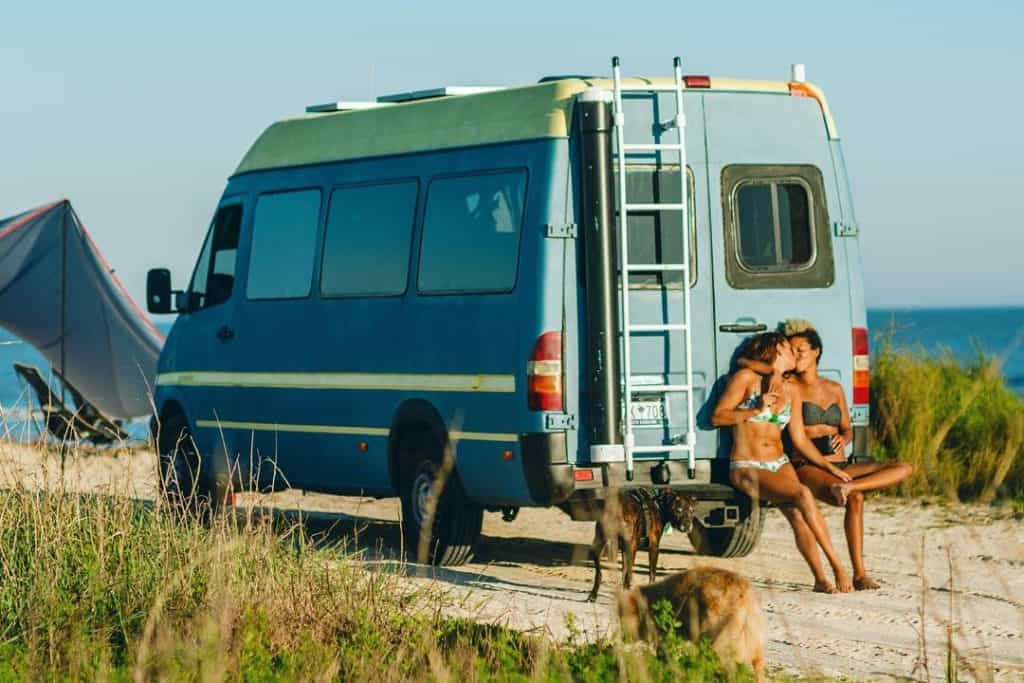
Many people have this conception that they could never make it work with their significant other in such a small space. And living this way does test relationships in new and different ways.
But if you are willing to approach your relationship with honesty and vulnerability, to put aside your egos and strive to improve your communication, your relationship will grow stronger than it ever was before.
How do we make it work? We make our relationship our number one priority.
We put a very strong focus on communication and honesty. The times we get into fights are when we lack one of these two things. If we are on the same page with one another then there is little room to butt heads. We know when the other needs space. We know to get out of the other’s way, or to put in more effort around the van to take some pressure off of each other, or to show caring and love and support.
We also work diligently on ourselves as individuals. The more we are holistically fulfilled, the stronger and deeper our relationship becomes. We journal, we exercise, we meditate, we create, we read, we take private time.
We’re not cooped up in the van 24/7, so there’s plenty of room for each of us to get space when we need it. Yes, we sleep there, and we make many of our meals there – but our “living” gets done outside of the van. And when your backyard is 1.5 million acres of public land, the number one thing you do have is SPACE!
If your relationship has a strong and honest foundation, if you communicate openly with each other, if you remain open and flexible in your travels – then van life can be extremely enriching for you and your significant other.
Read More: Van Life with a Partner: Tips for a Successful Relationship
I have a dog/cat/ferret/snake. Can I still do vanlife?
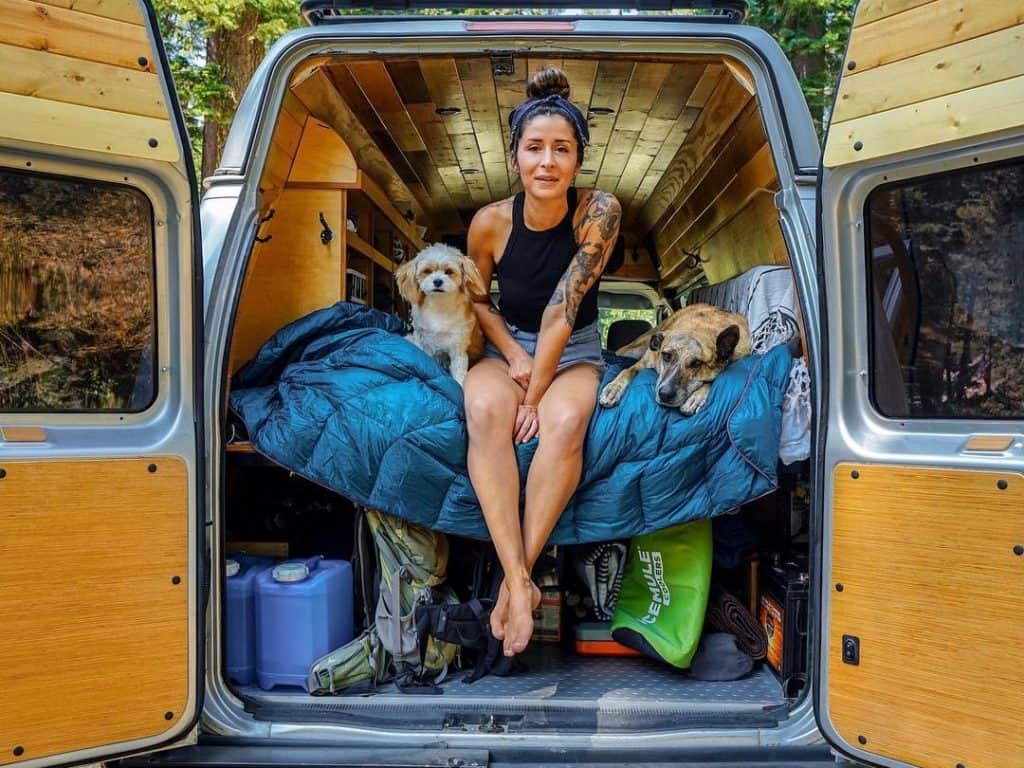
Absolutely! We have two dogs with us, and we’ve met people living in a van with all manner of pets from cats to snakes. It can be a great way to keep your best friend with you and show them all kinds of cool things they would never see sitting inside of a house.
We think van life with dogs is an absolute blast, but it’s important to realize that there are some trade-offs when you’re traveling with a pet.
First off, your pet’s comfort should be your top priority. We’ve changed our travel plans several times to avoid extreme heat that would be dangerous for our dogs. We also rarely leave them in the van unattended – and only if it’s cooler temperatures, and then only for short periods.
You also likely won’t be able to bring your pet with you everywhere you go. This is more of an issue in towns/cities than it is in the wild – which works fine for us, since we prefer to spend our time off the grid. But when we’re in towns/cities (or National Parks), we’re either limited in what we can do, or we put our dogs up with a sitter for the day so we have more freedom (we usually use Rover, which is like the Airbnb of dog sitting).
That said – having a pet with you on your van life adventure is a very enriching experience, and if you want to bring your best friend along for the ride we highly recommend it!
Read More: Vanlife with Dogs: Tips, Challenges, and Fun on the Road
How do you decide where to go next?
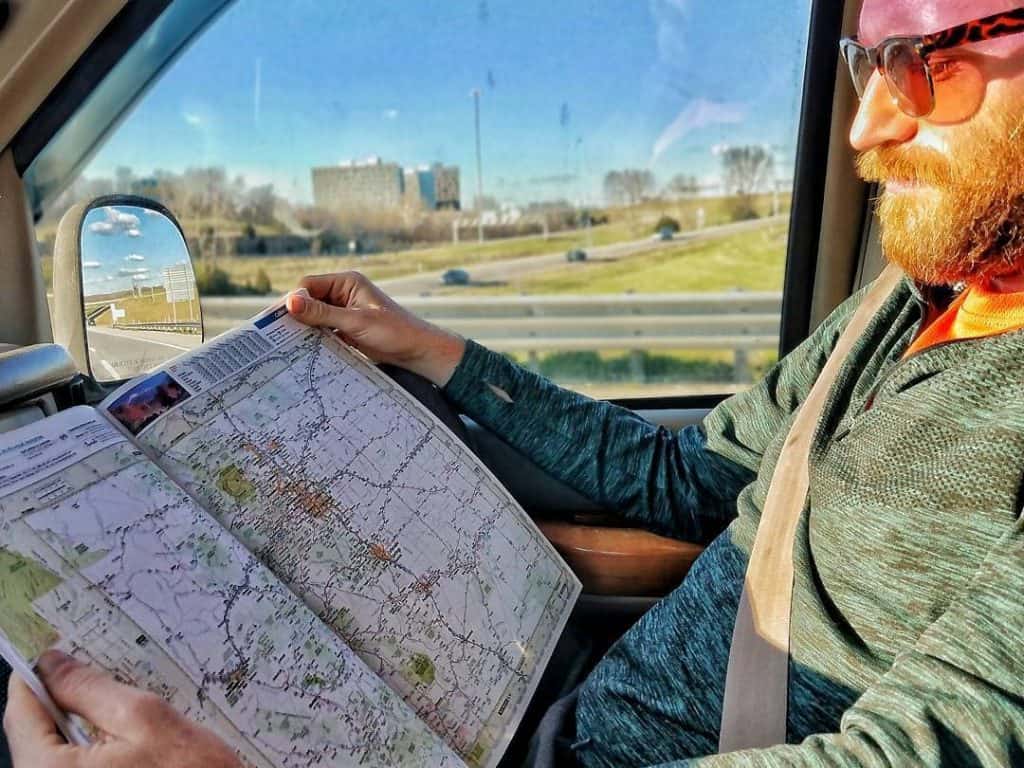
Many things can dictate where we choose to adventure off to next, from weather to work to future plans.
The number one thing that broadly influences our travel route is the weather. A huge advantage of van life travel is that ability to seek out the weather that you enjoy (or avoid weather that you don’t enjoy). At the height of summer when it’s scorching hot almost everywhere, you can typically find us at high elevations where it’s cooler, hiding in the middle of the woods by a stream. In the winter… well it’s likely you’ll find us here too in the winter. Somehow we keep finding ourselves in the mountains during the winter, ha.
Future plans also dictate our travel. We try not to make too many plans so we can kind of drift along as we please, but sometimes we’ll have a van gathering or a concert we know we want to make it to, or a friend we want to visit, or somewhere we want to be for a holiday. When we do make plans like this, we try our best to space them out, so that we know we can take our time getting from point A to point B.
As far as where we camp on a day to day basis, work often dictates that. Since we need internet to work, we need to plan our travels around having internet at certain times so we can get our work done. Since we don’t have a Starlink yet, this can mean seeking out wilderness camp spots with cell service (which can be hit or miss), paying for a campsite, or popping into service to work for the day. We’ll search for a wilderness spot if we want to post up for awhile, we’ll stay at a campground if we really need reliable internet for something, and we’ll pop into service if we need to run errands anyway.
So if we have four months in the summer to get from Idaho to SoCal, you may find us bouncing around the many lakes of Montana or the mountains of Utah, staying at awesome secluded spots for a week before popping into a small town for a day or two. Spit. Rinse. Repeat.
Will you share your favorite secluded van life camping spots with us?
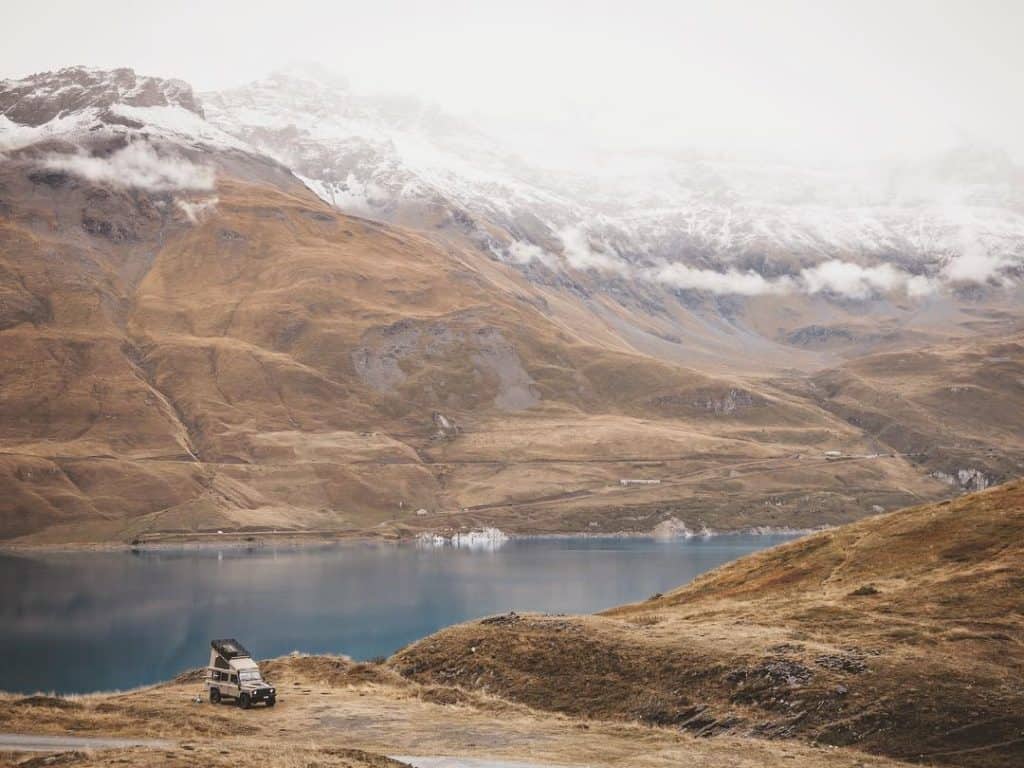
We don’t like to publicly share our favorite campsites (although we may tell you about them over beers some time). Sharing spots just invites overcrowding, and a big part of the fun of van life is adventuring into the wild and discovering your own awesome spots.
But – we will share our process for finding kickass secluded camping spots that also have cell service. Here’s what we do:
- Find some prospective camping spots or areas to target. The the FreeRoam App (iPhone | Android) is our favorite, because it overlays public lands over the map, which gives us more area to explore than the listed campsites. We also recommend Freecampsites.net and the iOverlander app (iPhone | Android) for more free camping, or the ParkAdvisor app (iPhone | Android) for paid camping.
- Pull up the Open Signal app (iPhone | Android) and click the map icon at the bottom. This shows you a super detailed overview of cell service in the area – and you can get an idea of potential campsites that are near cell service.
We’ve been able to find a ton of great van life boondocking spots this way, and because they had service we were able to stay for several days and get our work done! We also have a WeBoost Drive 4G-X cell signal booster that helps expand our options quite a bit.
Read More: How to Find Internet While Living on the Road | Vanlifer’s Guide to Sleeping, Camping, and Overnight Parking
Where do you get rid of your trash and recycling? How do you keep the interior of your van clean?
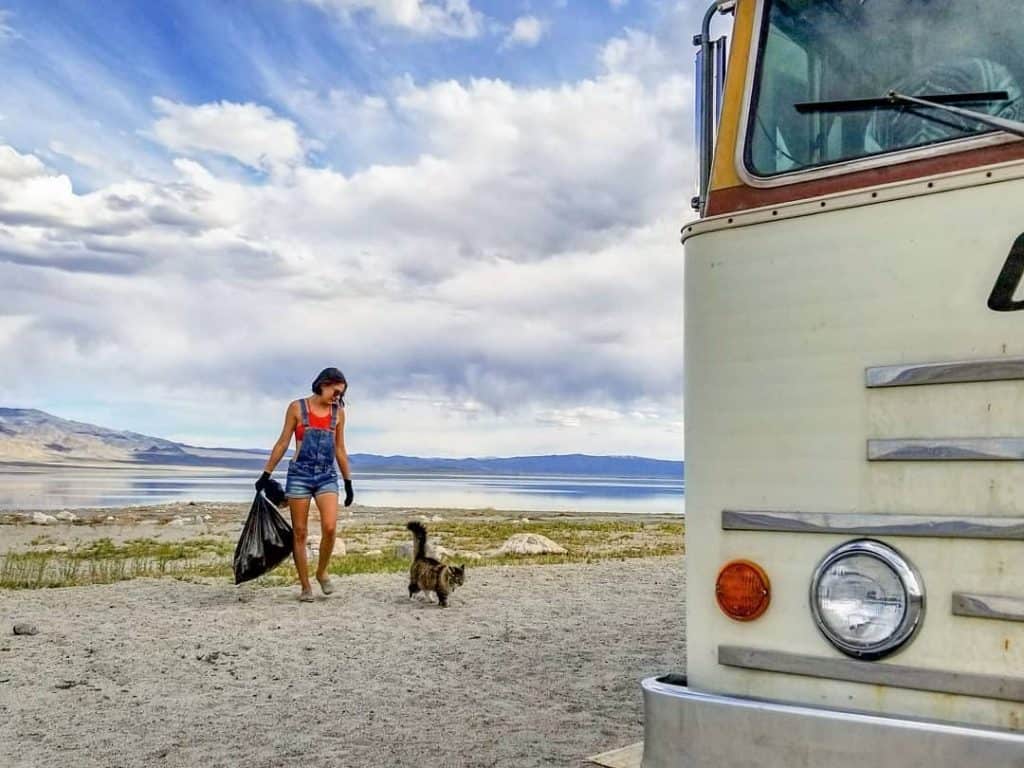
The short answer to this is that we have both trash and recycling bins inside our van, and we dispose of everything in proper receptacles that we find along the way. When you live in wild places, you need to follow a pack-it-out, Leave-No-Trace mentality.
Trash is the easy one, since there are trash cans and dumpsters everywhere – at trailheads, gas stations, big box stores, etc. We try to live as waste-free as possible, so it might take us a week or longer to fill our small 2-gallon trash can, mostly with food scraps.
Recycling can be a little tougher when living in a van. We’ve occasionally found recycling bins at trailheads or conveniently on town/city streets, but more often than not we need to go out of our way to seek out recycling. We’ve found that most medium-large size towns and cities have a recycling center of some sort, so whenever we’re in a town we Google “recycling center near town, state” and see what’s nearby. If there’s nowhere, we hold on to our recycling until we find somewhere to properly recycle it.
As far as keeping the van clean – it’s super easy! When you live in a van, cleaning your entire house doesn’t take very long. It probably takes us about 20 minutes to clean our van. We have a small hand broom that we use to sweep dirt, sand, leaves, and anything else right out the side door. We also have a 12V vacuum for getting hard-to-reach areas.
Read More: Waste-Free Vanlife: 13 Tips for Ditching Single-Use Disposable Items
What do you eat on the road? I bet it’s a lot of fast food and gas station junk!

We’ve actually found that we eat much healthier on the road than we do when we’re stationary. We have such limited space that we choose to be very conscious about what we allow in the van. We cook almost all of our meals, and we very rarely eat out.
Believe it or not, we actually have a full kitchen in our van, complete with stove, refrigerator, toaster, coffee maker, sink, pantry and immersion blender. Just about anything you can make in a regular kitchen, we can make in our van (the only thing we don’t have is an oven, but there are campervan ovens out there).
And since we live in such a small space, we need to focus on keeping nourishing, fresh whole foods in our van instead of processed food and other junk. And what we don’t have, we can’t eat!
Read More: Stoves and Cooking | Refrigeration on the Road: The Best 12V Portable Fridges for Vanlife
Where do you find fresh drinking water on the road?
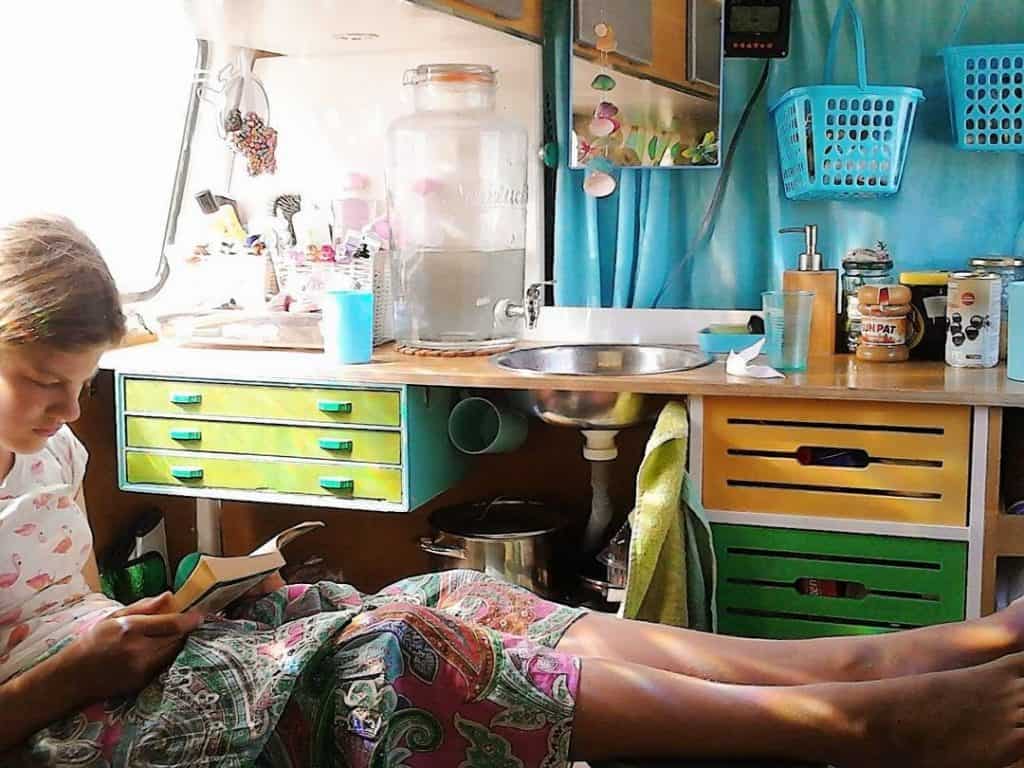
Although there are plenty of free water options out there, most of the time we buy fresh water from refill stations. The water from these stations costs about $0.25-$0.50 per gallon, and is typically triple-filtered (including reverse-osmosis), so it’s cleaner than any other water you’ll find. Given that you never really know what kind of nasty chemicals and industrial contaminants are in water sources, filtered water is a priority for us.
Where to find these refill stations? Most (but not all) Walmarts have a water station, and many grocery stores have one as well. The largest brand is Primo Water, and they have a station locator on their website. There are other brands out there, though, so it pays to check grocery stores if nothing shows up on the Primo locator.
What about free water? State parks, national parks, rest areas, visitors centers, even many gas stations have water spigots. RV dump stations may also have potable water (use the ParkAdvisor app to find nearby dump stations). And, if you’re staying at a campground, you can use their spigot to fill up. Water quality at these locations can be hit or miss, so it’s a good idea to invest in some sort of filtration system like this inline RV water filter.
If you have the right filtration system, another option is to harvest wild water from lakes, streams, and rivers.
Read More: Water System and Plumbing
How do you deal with cold weather/hot weather when living in a van?
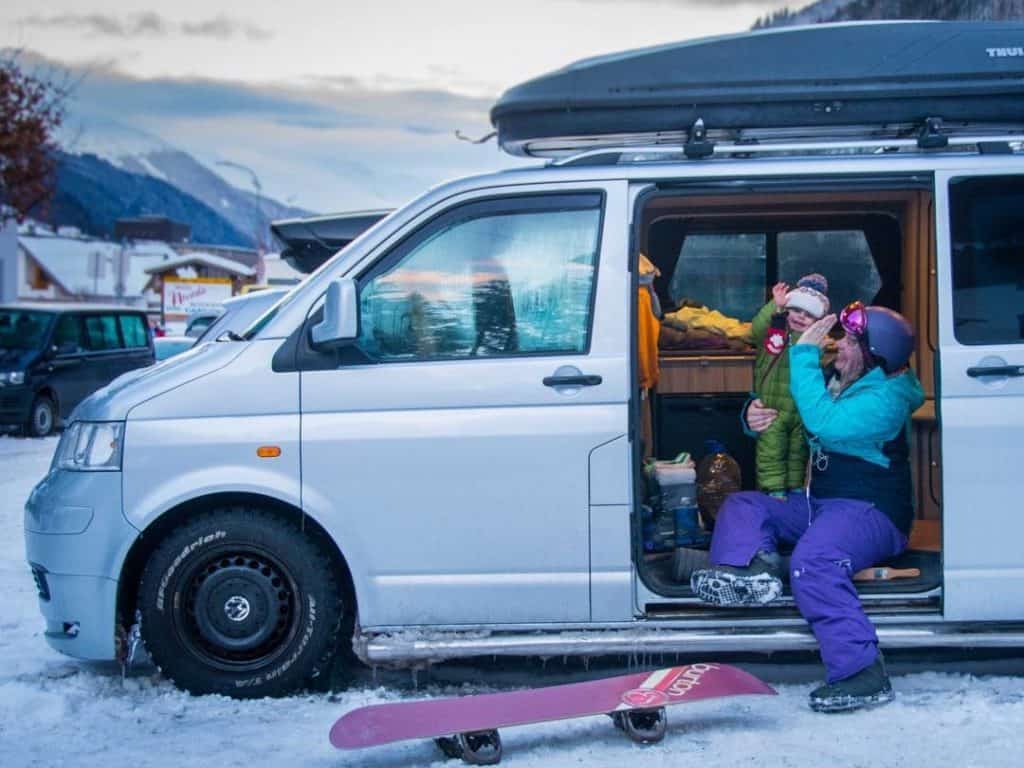
When you van life, you’re at the mercy of the outside weather to a certain extent. In an off grid situation, it’s just not feasible to control the interior temperature of your van to the same degree than you can in a grid-connected house.
So how do you deal with temperature extremes during van life? There are quite a few things you can do to make sure your van stays comfortable in any weather:
Tips for all weather:
- Plan your travels around the weather. First and foremost, it’s a good idea to base your travel plans around the weather. You won’t see us in Southern Arizona in July, or in Alaska in February. High elevation, coastal areas, and the far north are great for sheltering from the heat, whereas lower elevations and southern latitudes are good places to wait out the winter if you’re not into the cold.
- Insulate, insulate, insulate. Making sure to insulate your van well will help keep heat inside your van during cold weather, and keep heat outside during hot weather. Insulation alone won’t do everything, but it will make it a lot easier to keep your van a comfortable temperature.
- Install reflective window coverings. Reflective window coverings are essential for a van build. We have an Eclipse Sunshade for our windshield, and reversible reflective curtains made out of Insul-Shine installed on the rest of our windows. When it’s hot out, we face the reflective side outwards to reflect heat away from the van. On cold nights, we face the reflective side inwards to help keep radiant heat inside the van.
Tips for Hot Weather
- Install a roof vent fan. A roof vent fan like the MaxxFan Deluxe is your best friend in hot weather (and many other situations). We keep our fan running 24/7. Combined with a cracked window, a ventilation fan maintains airflow in your van, sucking hotter air out while pulling cooler air in. Combined with our reflective window coverings, our vent fan is able to keep our van no hotter than the outside temperature, even when parked in direct sun.
- Keep your van shaded. The temperature difference between shade and sun can be pretty drastic, so when you’re dealing with hot weather it’s a good idea to park in the shade. In the desert? Create your own shade using an awning on the door side of your van (we have the ARB Touring awning but you can also DIY one). For the non-door side of your van, create shade by clipping a silver tarp to your van’s rain gutters, and staking the other end to the ground.
- Use evaporative cooling. AC units use way too much electricity to be used in a campervan (unless you’re plugged in at a campground). But evaporative cooling solutions do a great job of keeping you cool. We use cooling towels for a little extra cooling boost in hot weather. For a little more intense solution, you can look into building your own swamp cooler (best for dry climates).
Tips for Cold Weather
- Have an active heat source. Insulation is essential for cold weather van camping. But insulation only keeps heat in, it doesn’t create it. A small active heat source like the ubiquitous Mr. Heater Buddy propane heater can heat up a van in just a few minutes (make sure to have proper ventilation and a CO detector when using a propane heater).
- Use a hot water bottle at night. A simple hot water bottle in your bed works wonders to keep you warm on those cold winter nights.
- Bundle up! If you’re cold, put more clothes on! Long underwear or base layers are great for adding layers. We highly recommend investing in a set of merino wool baselayers if you do a lot of cold weather camping.
Read More: Insulating Your Van: Everything You Need to Know for Your DIY Van Build
Do you get lonely? How do you meet people traveling?
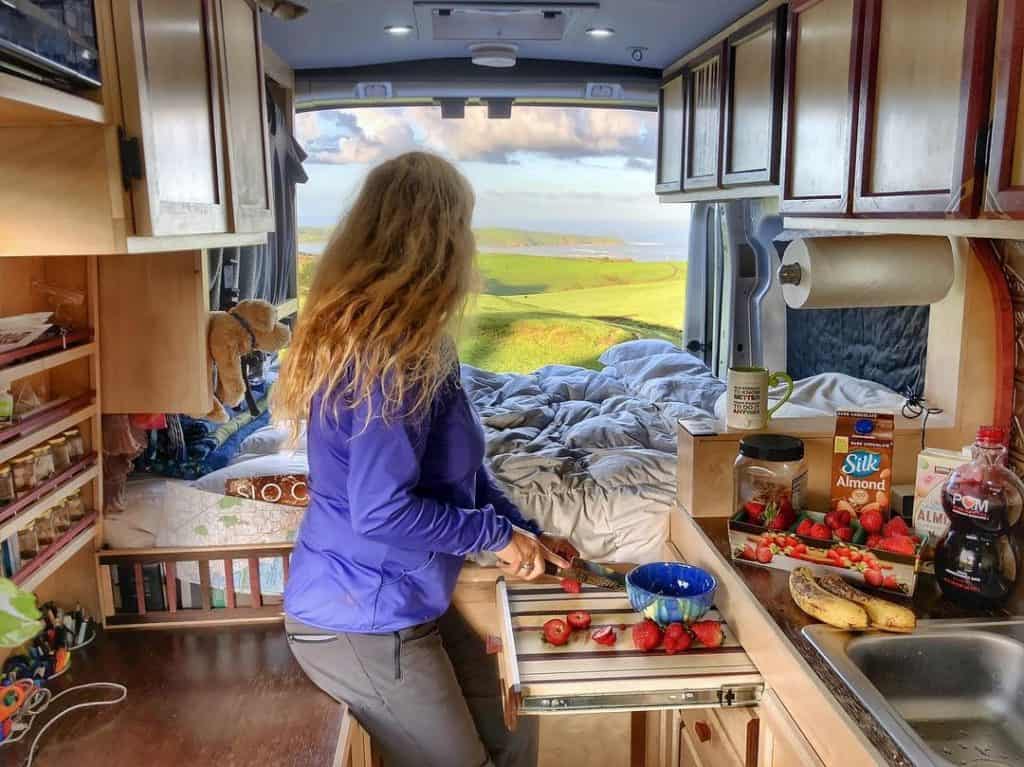
This can be a complex question depending on how you look at it. Personally, we really enjoy being out in the middle of the wilderness without another soul around, so in that sense we prefer the solitude that van life can bring vs the hustle and bustle of our old lives. When you’re alone on the road, you don’t have the constant distractions of conventional life all around you. One of the discomforts of this lifestyle that’s also an incredible opportunity for growth is learning how to be comfortable and content with yourself. Once you learn to do this, you will find yourself feeling less lonely.
That said, we do sometimes miss friends and family back “home”, especially when there are monumental events going on in their lives that we wish we could be there for. But thanks to the magic of cell phones and the internet, we’re able to stay in contact and even see people face-to-face via Zoom, Facetime, or Google Meet. We’ve also begun rekindling the practice of letter writing, which we’ve found to be a great way to stay in touch with important people on a deeper level. And, since our home travels with us, we have the flexibility to visit people whenever we choose!
So do we get lonely? In general, no, we don’t. We thoroughly enjoy the solitude of the wilderness, there’s never any shortage of things to do on the road, and we’re never bored. We’ve discovered and developed many ways to enjoy our own company. And if we’re feeling social and want to meet other people, we’ve never had problems finding new “neighbors.”
Meeting Other Van Lifers on the Road
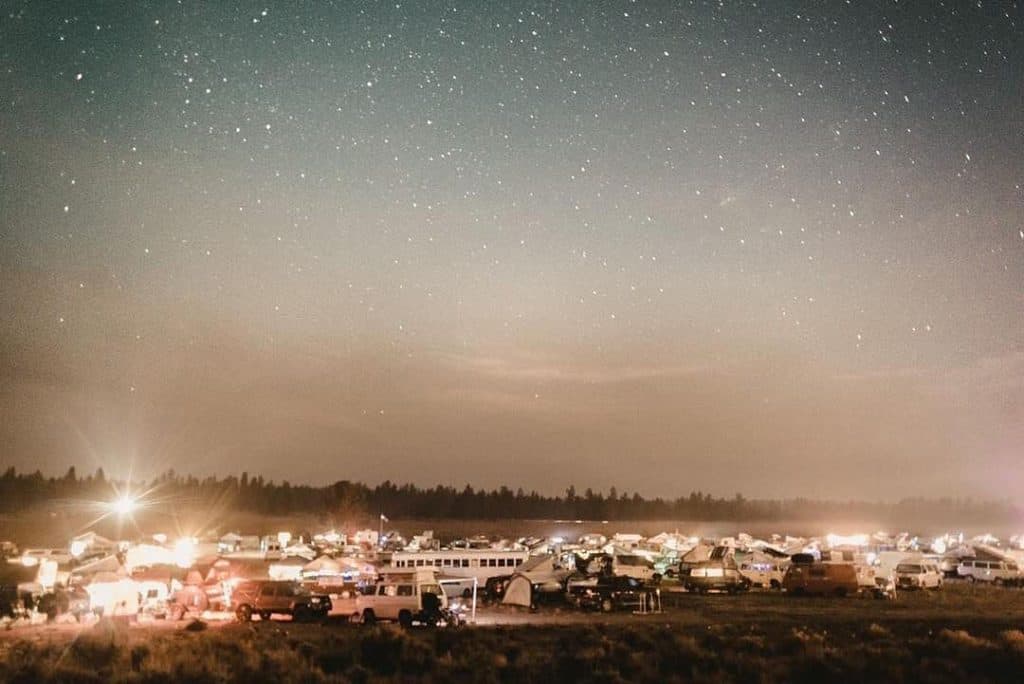
We’ve met many people by just talking to our camping neighbors, or seeing someone’s rig in a parking lot and striking up a conversation. Since we all share a passion for van life and for our vehicles, asking about someone’s rig is an instant ice breaker. No screen time needed – just good old fashioned conversation. More often than not this had led to new friends and camping buddies.
Social media is also a great way to meet people on the road. Instagram, van life Facebook groups, or even Reddit and Youtube – there are people on these platforms that are down to meet up and hang out. Mainly via Instagram, we’ve made many friends from all over the world, shared hardships and triumphs with them, and felt an instant deep connection when we actually met them in person – like reuniting with an old friend.
Van life gatherings are also a phenomenal way to connect with people in this community. From the Midwest Vanlife Gathering that we host every May, to the events put on by Go Van in Canada, to the Vanlife Diaries series of gatherings in Australia and the US, to the massive Descend on Bend outside of Bend, OR every fall, to all the other events big and small, there are gatherings of nomads all over the US, Canada, Europe, Australia, and all over the world. These events are filled with inspiration, stories, adventure, fun, and new lifelong friends who really understand you.
Looking for a van life gathering in North America? Go-Van features a calendar of events on their website.
What kind of MPG do you get? Aren’t you worried about your carbon footprint?

Our van (a ‘96 Chevy Express) gets about 15 MPG. Most of the older van models – from VW Westfalias to Ford Econolines and beyond – average around 12-15 MPG. The newer “Euro-style” vans – Sprinter vans, Ford Transits, Ram Promasters, etc – do better at around 18-22 MPG.
Of course, this is terrible gas mileage compared to smaller vehicles. And given this, some people are rightly concerned about the carbon footprint of living an alternative lifestyle centered around driving large, gas-guzzling vehicles all over the place.
Even though burning so much gas is not ideal, vanlifers live a lifestyle that is much lower impact than the average person.
A huge chunk of carbon emissions in the United States come from burning fossil fuels to generate electricity. Most vanlifers do not use any grid-generated electricity, completely eliminating these carbon emissions from their lives (as well as other sources of residential emissions).
Van life is also an inherently minimalist lifestyle, meaning that vanlifers are consuming far fewer products than the average person – products which likely require emissions and other potentially harmful industrial practices to produce. So, when evaluating the environmental impact of this lifestyle, it’s important to look beyond the MPG of the vehicle and instead view vanlife from a holistic perspective.
And if there were an electric or hybrid van out there that had a long range and could be recharged using solar, we’d be the first to sign up! (Side note: we are currently investigating the feasibility of converting our van to a hybrid, which would be bitchin’).
I’m not sure if I’ll like living in a van. Is there a way I can test it out for a short period first?
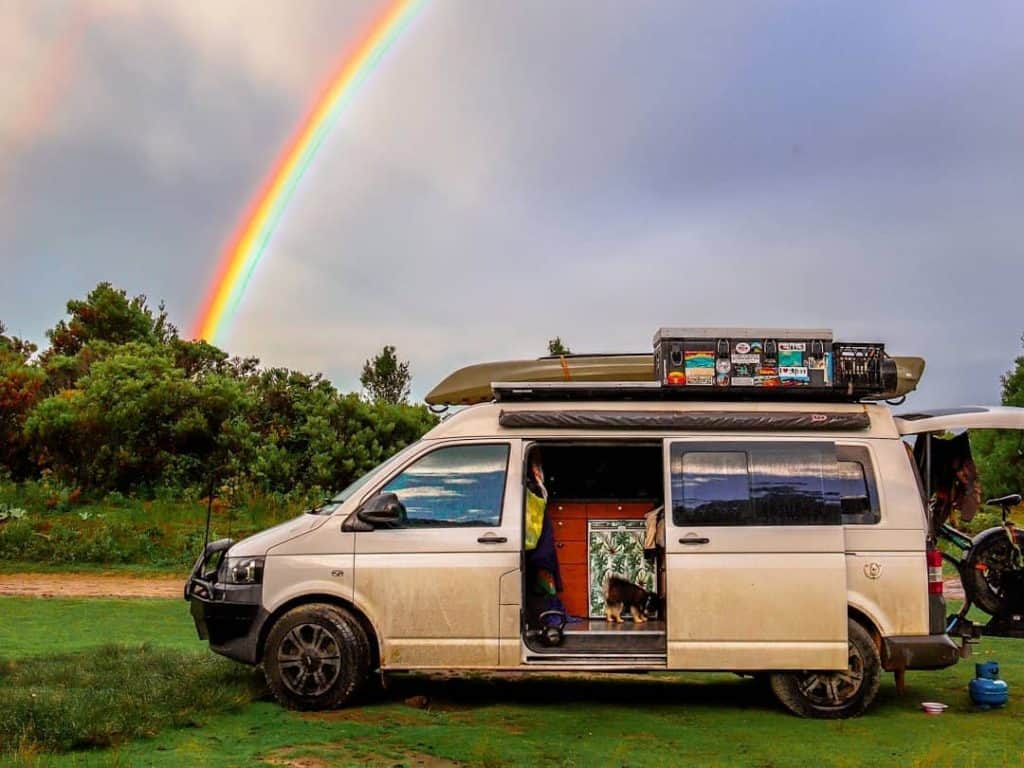
Absolutely! If you’re worried that you won’t like living in a van – that the limited space is far too small for you, or that you’ll end up killing your significant other – it can be a good idea to test drive the lifestyle for a short period before committing to it full time.
Read More: Top 61+ Camper Van Rental Companies in the US
One way to do that is by renting a campervan from Outdoorsy. Outdoorsy features vans and RVs that owners list on the Outdoorsy platform – so you can test out an actual vanlife vehicle and see how it feels and functions.
Take vanlife for a testdrive with a campervan or RV rental from Outdoorsy. Available nationwide.
Use coupon code GNOMADHOME for up to $40 off your booking.
There are vans to rent just about anywhere you need one – so you can take one on a road trip from your home area, or you can fly somewhere awesome and pick one up when you get there. Testing out van life like this before commit can help you save money if you decide it’s not for you.

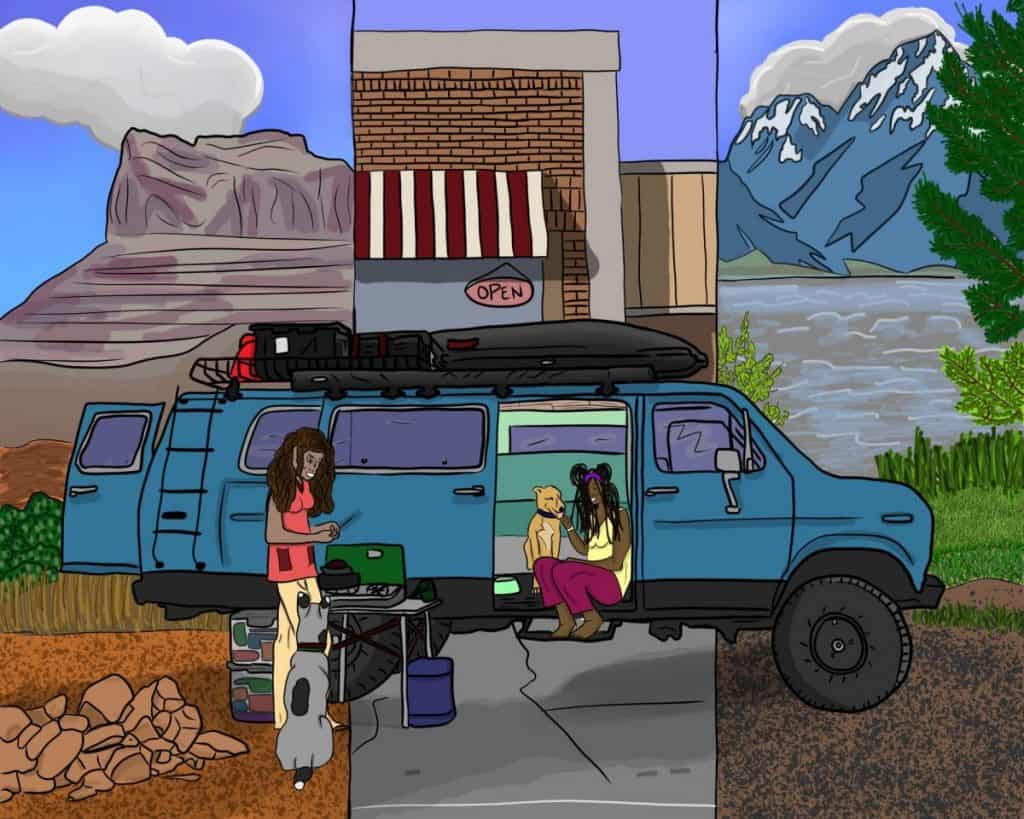


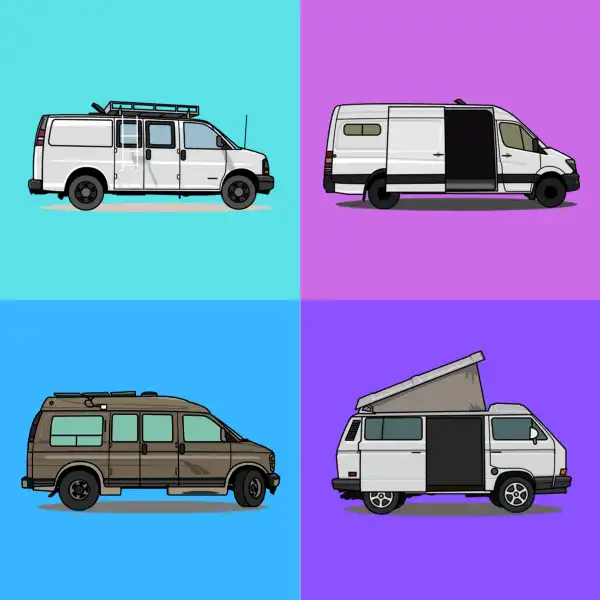
Thank you so much for this!.
The health insurance section is the most helpful piece I’ve ever read on getting healthcare coverage on the road- thank you! For your chamber of commerce insurance, is that something you were able to get as a sole proprietor or do you have a C- or S-corp taxed as a corperation?
Hi there, glad this was helpful! It’s tough to definitively answer this question because so much of this varies by state. The type of insurance we have is not available for sole proprietors — businesses typically need at least two employees (owner plus another employee) to get this type of insurance. In an S Corp you can set up the owner as an “employee” that gets a W2, whereas sole proprietorships are fully pass through so would not qualify (for clarification, our business is an LLC taxed as an S Corp). From there, the question is whether there is a… Read more »
WowOWow!!! I can’t thank you enough for this site. I’m an ‘old lady’ who is just embarking on this lifestyle. I’m researching to make the decision about which vehicle to buy. Do I want one ready-to-go or something to have built out?!? I’ve already spent HOURS online and have enjoyed every minute of it. BUT then I found you two, and I’m delighted beyond words!!! I’ve already read quite a bit here and resonate with your attitudes. The perspectives you share are informative, realistic AND encouraging — MY kind of blend. I probably have SOME romantic illusions about this lifestyle,… Read more »
Hi Sunny, so glad you found you resonated with our site and found it helpful! We’re working on updating some of our guides and adding new ones, so we’ll have more info coming in the next few months. Northern NM is beautiful, and easily one of our favorite parts of the country. But after two wonderful years there, we made the difficult decision to move back to Missouri to be closer to family after our son was born. It’s been quite a change, but we’ve still been building and are itching to take our son out on the road. Best… Read more »
Super helpful!! Thanks!
Thank you for answering so many questions I had, as I am looking to try a new adventure
Of course Debbie, best of luck!
I have Medicare for insurance, but I need a doctor on the road. Not a quick care. Any advice?
Hi Bridgie, unfortunately I don’t have specific advice for your situation. Medical care and all that goes with it are some of the more complex issues to deal with on the road, and everyone’s situation is different. If you need a regular doctor, one thing you can consider is staying in a general region so it’s easy to get back to your doctor for appointments. I’m not sure what your medical needs are, but you could also try to find a doctor that is willing to do some level of telemedicine for some appointments. However, I’m not sure what level… Read more »
Hello friends. I’m new to this. I’ve actually been living off the land for a few moons.. I’ve decided this is my path..
I’m looking for communities that I can meet, hang out with and become a part of..
How do you plan maintenance on your vehicle? Breakdown? Plans incase of an accident that requires towing? Where would you go/fall back on?
Hi Steven, basic maintenance is mostly a matter of planning ahead. If it’s something like an oil change or fluids, we did a lot of that ourselves. We’ve also had good luck calling around to shops or even just walking in and seeing if they can squeeze us in for a quick oil change. For both maintenance and breakdowns, we’ve found a lot of shops willing to shift things around a bit to help us travelers. If it’s something more involved, we’ll try to get it done when we are visiting someone so we have somewhere to stay. For unexpected… Read more »
Hello! Do you have any tips for van lifeing with cats? I’m currently a minor but looking to eventually get a van for cross-country road trips and peace-of-mind.
Hi Emily, we’ve never owned a cat, so we don’t have any specific tips for living on the road with one. However, we have encountered a few vanlifers with cats, so it can definitely be done. Just like with dogs, it’s important to have the ability to tether them to your van/campsite. But other than that, we don’t know. We will look into having someone knowledgeable write a post for us about that, though, since this is an important topic. Sorry we couldn’t be of more help!
~John
I am in the same situation. Its actually what has been holding me back from making the transition to a van. I may have to do the 3 month return thing and stay somewhat local. (Not what I wanted to do). I’m just going to keep asking questions and hope I can figure something out. I’m on disability and turn 55 in a couple days.
I think this is a great life style option for many young people. Years ago it was possible to head over to Europe and move around by staying in different youth hostels at a very, very low cost. That can still be done but at a maximum of 3 months. This ‘van life’ option lets young people test their independance and get amazing life experiences for 3 months or longer. Fantastic!
I’m a 40 year old man and have recently separated from my partner of ten (10) years and am currently residing I’m my, what once was our family home of which I have sold and am awaiting an exchange date. I was planning on renting for a year but now considering van life instead to find myself again and go back to basics. I love the outdoors & love to travel. I’m based in the U.K. and am wondering where do I start with making this happen other than getting a can of course – any advice welcome
TIA,
Hi Tony, that’s quite a transition! I hope you will find that slimming down your life is a great way to reconnect with yourself and recalibrate what you find meaningful. Although we run a van build website, we’ll be the first to tell you that you really don’t need much to live in a van. Don’t get hung up on creating a fancy, elaborate build, especially if that turns into something that holds you back from the road. You’d be surprised how barebones of a setup you really need, and you can always add and expand later. Now is also… Read more »
Great article, but the part about using Rover as a pet sitter really worries me. Yes, anything can happen w/a dog at a pet sitter, and there are exceptions to everything, but Rover is not a company w/a good track record. A neighbors relative just had their dog killed by a rover sitter this week. If you google rover dog deaths you will see story after horrible story of pets being injured or killed by a rover sitter. Their sitters are not vetted enough. I run a pet business and have applied w/rover just to see their process and it’s… Read more »
Hello, thanks for commenting. Stories like that are unfortunate and heartbreaking. We’ve found that with any peer-to-peer service like Rover, Airbnb, etc, it’s definitely a requirement to vet the people we’re dealing with ourselves and not trust that the service has done so. When we put our dogs up with a Rover, we have our own vetting process with potential sitters, and we suggest that everyone vet themselves any dog sitter (Rover or not) that they’re considering leaving their dogs with. We use and recommend Rover because it’s the best way we’ve found to connect with dog sitters on the… Read more »
Wow, great article. Thank you 🙂
Good article, lots of very useful info. I’m currently planning out my vanlife which is being driven (ha!) by the fact I no longer love my wife. I work in stable employment, where I have access to several sites and full facilities in the offices. My plan is to buy a long wheel base van and get it converted without the wife knowing. Once it’s done, I intend to have a long conversation with her and tell her I’m leaving. Financially, she’ll be rock solid and I don’t intend to take / ask for anything, as she earns far more… Read more »
Hi Cal, so glad the article was helpful! Sounds like you have quite the transition planned. We wish you the best of luck finding your way on this path.
~John
You talk about how loneliness is not a big problem for you, but then you are a couple doing this together, correct? I am a single man. Of course i would like to find a lady someday 🙂 But I also am tired of my localized, same day today as yesterday’s existence. But in my pursuit of happiness these days, it includes finding a mate. I am 52. Although it doesn’t seem to be working local, I wonder if being so nomadic might make it worse, or at least feel worse due to the constant change uin location. How would… Read more »
Hi Baker, thanks for the comment. We definitely have each other for company, which helps, but beyond that we’ve been able to find community on the road that is there when we need it. I can’t speak for what it’s like to be single on the road, but I do know that van gatherings are a great place to meet people, including other singles. We’ve made many long term friends who we’ve traveled with and camped with and visited, all from van gatherings. We also know several couples who got together after meeting at a van gathering. It’s incredible what… Read more »
Hi Baker! I’m in my 50s & looking for the same. Get in touch! Kate – [email protected]
How come when you do it it’s trendy and “oh la la, yas yas!” but when I was homeless and slept in my car it was trashy and “illegal”? Oh I know…. gentrification!!!!!
Hi Ron, thanks for the comment. This is certainly a real problem in the vanlife world. If you look only at how vanlife is portrayed on social media, you might think that it’s basically attractive trendy young people in Sprinter vans traveling around and taking glamor shots. But the reality on the ground is far different, and there are people from all walks of life, all ages, backgrounds, and income levels living in vehicles, both by choice and by necessity. We’ve seen far more beat up old vans on the road than flashy new vans, and have met far more… Read more »
It is hard to drive a van? I have never driven one before. Also do you have to be a really good driver?
Hi Leah, it’s actually not as hard as you would think. It takes a little getting used to, especially if you’re used to driving a smaller car, but I’ve taught quite a few people the ins and outs of van driving in the past without a problem. If it’s something you’re interested in, definitely give it a shot!
Hey, this site is great! and has so much information, I learned a lot. I´m considering living in a van for a few years once I get out of highschool, (cause yolo) I have a question:
How do you tell your family that you want to live in a van? Do other people think its weird? I love my family and I don´t want them to be mad at me or anything.
Hi Leah, great to hear you’re considering a stint doing vanlife. It can be a great way to travel, meet interesting people, save money, and facilitate other aspects of your life. While living in a van may be uncommon and I’m sure some people think it’s weird (depending on what area you are in), on our experience most people we meet think it’s awesome. We are also lucky that our family and friends have been fully on board from the beginning. However, this isn’t true for everyone, and some people may not understand your desire to live in a van,… Read more »
Wow amazing tips and advises, switching to van life with this will be more easy. Goodluck for your Journey.
Hi KT Mina, so glad this was helpful, best of luck on your journey!
Hi, I just turned 80 and my trophy wife is 78. Our kids live in Nevada, Massachusetts, and Pennsylvania. We are big time travelers and have had three RVs in the past. We love to cruise and adventure in other countries, including a safari. So now, flying and cruising are out for us. Traveling by car can involve motels and convenience store bathrooms, both on our taboo list. So, we bought a NV200 cargo van, installed bunk beds and a toilet so far. We plan to drive and do outdoor visiting with out kids and grandkids. We are snowbirds with… Read more »
Hi Bill, we are so glad that our humble resource has been helpful! Van camping can be a great way to travel, and really opens up your options. Best of luck with your adventures!
~John
Your guide is so informative , thank you! We just got our van after many months building it out. Given the COVID situation and all the closures/changes, how are you navigating van life now and what are you doing differently to stay safe and still be out on the road?
Hi Janet, we actually purchased a plot of land last fall for a home base (luckily enough) so we’ve been hunkering down here, and will be for the forseeable future. If you live in your vehicle full time and have no other dwelling (and no one to go stay with), then you may have to be out on the road while taking precautions and being considerate of those around you. However, if you have the option to hunker down in place, then this is really not the time to be doing non-essential travel of any kind. The pandemic is accelerating… Read more »
Thank you so much for this! It answered almost every question I had about the van life. I will be an empty nester soon and am ready to ditch my small, overpriced apartment and go out and live life! I have been trying to think of where I want to live for a couple of years and never came to a conclusion. I think that’s because I don’t want to be stuck in one place anymore. I know it will present challenges every day, and doing it alone with just my dog and I will be scary at first, but… Read more »
Hi Darion, that’s quite an exciting journey! We’re so glad our resource has been helpful! We’re working on an epic post all about choosing a van, but here’s a quick rundown. In that price range, you could probably find a newer Chevy Express or Ford Econoline, and may even be able to find versions with a high top for additional headroom. I would personally lean towards 2002 and newer Chevy Express, since the engines are reliable and easy to work on. For high top vans, another option in that budget would be a used Sprinter, but they can suffer from… Read more »
Thank you so much for all this information, I couldn’t stop reading! Looking into the vanlife for my boyfriend and I. This really helped.
Hi Savannah, so glad this was helpful! Best of luck with your journey!
Thank you for this incredible resource! My husband and I inherited a 2000 Ford Premier and are very seriously considering Vanlife and you answered nearly all of the questions we have or at least provided other resources that we are looking forward to checking out.
Hi Whitney, I’m so glad our resource was able to answer many of your questions. Best of luck with your journey!
~John
Hey! Thanks for the article, it is very informative. I’m wondering if you see any van-lifers who work 9-5s? I’m a soon to be law school grad who would love to transition to van life (just in a more permanent area most of the year for work) and was wondering if its possible/if there are any specific tips for how to navigate 9-5s and van life?
Thanks in advance!
Hi Jenna, that’s a great question! There definitely are vanlifers out there who work 9-5s, but I don’t have a whole lot of insights or tips on that front, unfortunately. I do know that a big challenge there is finding regular places to sleep when you’re in/around populated areas for a longer stretch. Some 9-5 vanlifers that I’ve seen have a handful of regular places they know they can park that they rotate through. When you’re more permanent in an area, it definitely helps to get permission for where you’re sleeping if possible. For example, if you belong to a… Read more »
Mecades 2018-2020 Sprinter vans have recall notice on Leaf springs.please inform as needed. Thanks
Thanks for the info Dave!
Great load of info. Thank you! Really helpful. I’m now determined to find all the useful links for travelling around Australia.
Hi Alise, so glad our resource was helpful! Best of luck!
Thanks for your site people – a great resource for those of us thinking about making the move. I retire this year and will be making the move to RV living full time and fishing here in New Zealand. I’ve read 100’s of these articles to get others’ perspectives, but picked up quite a few tips here. Many thanks!
Hi Jim, so glad we could be of help! Best of luck!
~John
GREAT article. Thanks!!!
Hi Brian, so glad you found this helpful! Best of luck on your journey!
~John
Great guide you got here on van life and how to go about it! It’s so detailed, I truly love it! I’ve always wanted to go around the world, I mean it’s a beautiful aspiration to have right? And as I’m a freelancer which I just got through a freelance hiring site I can continue my work even as I travel. Thanks for these tips! You rock!
Hi Yna, so glad you enjoyed this resource! Best of luck!
I’d love to do the nomadic van thing, I did it when I was younger. However, I’m 60 now and on disability and need medications. All of my scripts could be handled with virtual appointments with maybe a yearly physical visit, but, my biggest concern is my pain medication. I avoid all physical activity now because they give me so little and shoot drugs into two joints (can only do 2 bc it’s counterproductive, which means I’m always in pain in all other joints affected ) every 3 months. The amount they’ll prescribe isn’t my question. How, or is it… Read more »
Hi Katherine, thanks so much for reaching out. Because of how localized the healthcare system is in this country, dealing with medical issues on the road can be challenging sometimes. I can’t speak to the specifics of getting pain meds on the road, unfortunately. I would perhaps try being honest with your doctor about the traveling you want to do, and see if he’d be willing to send prescriptions to Walgreens locations throughout the country for you. But if not, and if there aren’t other options for getting what you need on the road, you may have to plan on… Read more »
I am in the same situation. Its actually what has been holding me back from making the transition to a van. I may have to do the 3 month return thing and stay somewhat local. (Not what I wanted to do). I’m just going to keep asking questions and hope I can figure something out. I’m on disability and turn 55 in a couple days. I want to live before I die… Good luck with everything.